
2011 Liège attack
On 13 December 2011, a murder–suicide attack took place in the city of Liège in the Wallonia region of Belgium.
After murdering a woman at his home, a man threw grenades and fired a rifle at crowds in Liège, Belgium, killing 6 people and injuring 125 others, before killing himself.

On 13 December 2011, a murder–suicide attack took place in the city of Liège in the Wallonia region of Belgium.
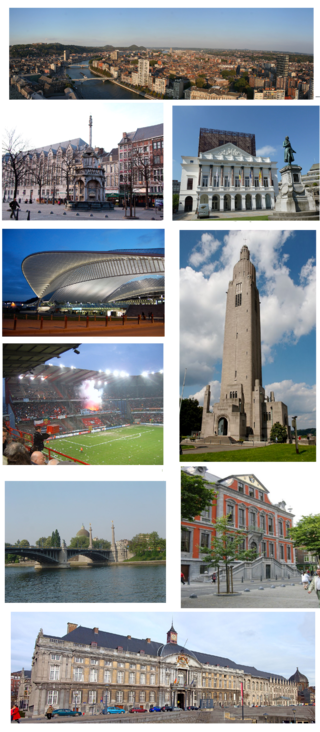
Liège is a major city and municipality of Wallonia and the capital of the Belgian province of Liège.
The Treaty of Lisbon is signed by the EU member states to amend both the Treaty of Rome and the Maastricht Treaty which together form the constitutional basis of the EU. The Treaty of Lisbon is effective from 1 December 2009.

The Treaty of Lisbon is an international agreement that amends the two treaties which form the constitutional basis of the European Union (EU). The Treaty of Lisbon, which was signed by the EU member states on 13 December 2007, entered into force on 1 December 2009. It amends the Maastricht Treaty (1992), known in updated form as the Treaty on European Union (2007) or TEU, as well as the Treaty of Rome (1957), known in updated form as the Treaty on the Functioning of the European Union (2007) or TFEU. It also amends the attached treaty protocols as well as the Treaty establishing the European Atomic Energy Community (EURATOM).

The European Union (EU) is a political and economic union of 27 member states that are signatories to the founding treaties of the union and thereby share in the privileges and obligations of membership. They have agreed by the treaties to share their own sovereignty through the institutions of the European Union in some, but not all, aspects of government. State governments must agree unanimously in the Council for the union to adopt some policies; for others, collective decisions are made by qualified majority voting. These obligations and sharing of sovereignty within the EU make it unique among international organisations, as it has established its own legal order which by the provisions of the founding treaties is both legally binding and supreme on all the member states. A founding principle of the union is the principle of subsidiarity, meaning that decisions are taken collectively if and only if they cannot realistically be taken individually.

The Treaty of Rome, or EEC Treaty, brought about the creation of the European Economic Community (EEC), the best known of the European Communities (EC). The treaty was signed on 25 March 1957 by Belgium, France, Italy, Luxembourg, the Netherlands and West Germany, and it came into force on 1 January 1958. Originally the "Treaty establishing the European Economic Community", and now continuing under the name "Treaty on the Functioning of the European Union", it remains one of the two most important treaties in what is now the European Union (EU).

The Treaty on European Union, commonly known as the Maastricht Treaty, is the foundation treaty of the European Union (EU). Concluded in 1992 between the then-twelve member states of the European Communities, it announced "a new stage in the process of European integration" chiefly in provisions for a shared European citizenship, for the eventual introduction of a single currency, and for common foreign and security policies. Although these were widely seen to presage a "federal Europe", the focus of constitutional debate shifted to the later 2007 Treaty of Lisbon. In the wake of the Eurozone debt crisis unfolding from 2009, the most enduring reference to the Maastricht Treaty has been to the rules of compliance – the "Maastricht criteria" – for the currency union.
Iraq War: Operation Red Dawn: Former Iraqi President Saddam Hussein is captured near his home town of Tikrit.
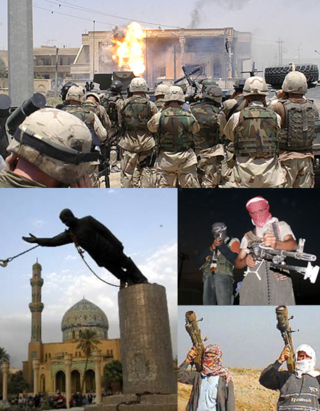
The Iraq War was a protracted armed conflict in Iraq from 2003 to 2011 that began with the invasion of Iraq by the United States–led coalition that overthrew the Iraqi government of Saddam Hussein. The conflict continued for much of the next decade as an insurgency emerged to oppose the coalition forces and the post-invasion Iraqi government. US troops were officially withdrawn in 2011. The United States became re-involved in 2014 at the head of a new coalition, and the insurgency and many dimensions of the armed conflict continue today. The invasion occurred as part of the George W. Bush administration's War on terror following the September 11 attacks, despite no connection between Iraq and the attacks.
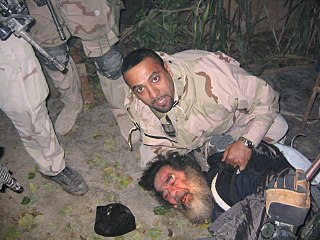
Saddam Hussein, the deposed president of Iraq, was captured by the United States military forces in the town of Ad-Dawr, Iraq on 13 December 2003. Codenamed Operation Red Dawn, this military operation was named after the 1984 American film Red Dawn.

Saddam Hussein was an Iraqi politician who served as the fifth president of Iraq from 16 July 1979 until 9 April 2003. A leading member of the revolutionary Arab Socialist Ba'ath Party, and later, the Baghdad-based Ba'ath Party and its regional organization, the Iraqi Ba'ath Party—which espoused Ba'athism, a mix of Arab nationalism and Arab socialism—Saddam played a key role in the 1968 coup that brought the party to power in Iraq.
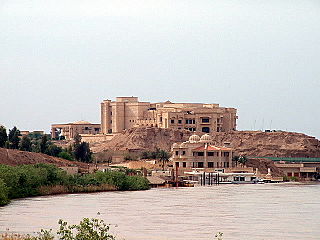
Tikrit is a city in Iraq, located 140 kilometres (87 mi) northwest of Baghdad and 220 kilometres (140 mi) southeast of Mosul on the Tigris River. It is the administrative center of the Saladin Governorate. As of 2012, it had a population of approximately 160,000.
European Union enlargement: The EU announces that Cyprus, the Czech Republic, Estonia, Hungary, Latvia, Lithuania, Malta, Poland, Slovakia, and Slovenia will become members on May 1, 2004.

The largest expansion of the European Union (EU), in terms of territory, number of states, and population took place on 1 May 2004.

Cyprus, officially the Republic of Cyprus, is an island country located south of the Anatolian Peninsula in the eastern Mediterranean Sea. Its continental position is disputed; while it is geographically in Western Asia, its cultural ties and geopolitics are overwhelmingly Southern European. Cyprus is the third-largest and third-most populous island in the Mediterranean. It is located north of Egypt, east of Greece, south of Turkey, and west of Lebanon and Syria. Its capital and largest city is Nicosia. The northeast portion of the island is de facto governed by the self-declared Turkish Republic of Northern Cyprus, which was established after the 1974 invasion and which is recognised as a country only by Turkey.

The Czech Republic, also known as Czechia, is a landlocked country in Central Europe. Historically known as Bohemia, it is bordered by Austria to the south, Germany to the west, Poland to the northeast, and Slovakia to the southeast. The Czech Republic has a hilly landscape that covers an area of 78,871 square kilometers (30,452 sq mi) with a mostly temperate continental and oceanic climate. The capital and largest city is Prague; other major cities and urban areas include Brno, Ostrava, Plzeň and Liberec.

Estonia, formally the Republic of Estonia, is a country by the Baltic Sea in Northern Europe. It is bordered to the north by the Gulf of Finland across from Finland, to the west by the sea across from Sweden, to the south by Latvia, and to the east by Lake Peipus and Russia. The territory of Estonia consists of the mainland, the larger islands of Saaremaa and Hiiumaa, and over 2,200 other islands and islets on the eastern coast of the Baltic Sea, covering a total area of 45,339 square kilometres (17,505 sq mi). The capital city Tallinn and Tartu are the two largest urban areas of the country. The Estonian language is the autochthonous and the official language of Estonia; it is the first language of the majority of its population, as well as the world's second most spoken Finnic language.

Hungary is a landlocked country in Central Europe. Spanning 93,030 square kilometres (35,920 sq mi) of the Carpathian Basin, it is bordered by Slovakia to the north, Ukraine to the northeast, Romania to the east and southeast, Serbia to the south, Croatia and Slovenia to the southwest, and Austria to the west. Hungary has a population of nearly 9 million, mostly ethnic Hungarians and a significant Romani minority. Hungarian, the official language, is the world's most widely spoken Uralic language and among the few non-Indo-European languages widely spoken in Europe. Budapest is the country's capital and largest city; other major urban areas include Debrecen, Szeged, Miskolc, Pécs, and Győr.

Latvia, officially the Republic of Latvia, is a country in the Baltic region of Northern Europe. It is one of the Baltic states; and is bordered by Estonia to the north, Lithuania to the south, Russia to the east, Belarus to the southeast, and shares a maritime border with Sweden to the west. Latvia covers an area of 64,589 km2 (24,938 sq mi), with a population of 1.9 million. The country has a temperate seasonal climate. Its capital and largest city is Riga. Latvians belong to the ethno-linguistic group of the Balts; and speak Latvian, one of the only two surviving Baltic languages. Russians are the most prominent minority in the country, at almost a quarter of the population.

Lithuania, officially the Republic of Lithuania, is a country in the Baltic region of Europe. It is one of three Baltic states and lies on the eastern shore of the Baltic Sea. Lithuania shares land borders with Latvia to the north, Belarus to the east and south, Poland to the south, and Russia to the southwest. It has a maritime border with Sweden to the west on the Baltic Sea. Lithuania covers an area of 65,300 km2 (25,200 sq mi), with a population of 2.8 million. Its capital and largest city is Vilnius; other major cities are Kaunas and Klaipėda. Lithuanians belong to the ethno-linguistic group of the Balts and speak Lithuanian, one of only a few living Baltic languages.

Malta, officially the Republic of Malta, is an island country in the Mediterranean Sea. It consists of an archipelago, between Italy and Libya, and is often considered a part of Southern Europe. It lies 80 km (50 mi) south of Sicily (Italy), 284 km (176 mi) east of Tunisia, and 333 km (207 mi) north of Libya. The official languages are Maltese and English, and 66% of the current Maltese population is at least conversational in the Italian language.

Poland, officially the Republic of Poland, is a country in Central Europe. It is divided into 16 administrative provinces called voivodeships, covering an area of 312,696 km2 (120,733 sq mi). Poland has a population of over 38 million and is the fifth-most populous member state of the European Union. Warsaw is the nation's capital and largest metropolis. Other major cities include Kraków, Wrocław, Łódź, Poznań, Gdańsk, and Szczecin.
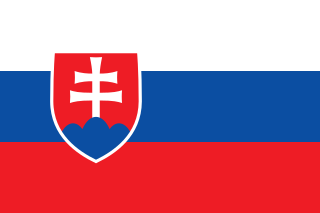
Slovakia, officially the Slovak Republic, is a landlocked country in Central Europe. It is bordered by Poland to the north, Ukraine to the east, Hungary to the south, Austria to the southwest, and the Czech Republic to the northwest. Slovakia's mostly mountainous territory spans about 49,000 square kilometres (19,000 sq mi), with a population of over 5.4 million. The capital and largest city is Bratislava, while the second largest city is Košice.

Slovenia, officially the Republic of Slovenia, is a country in Central Europe. It is bordered by Italy to the west, Austria to the north, Hungary to the northeast, Croatia to the southeast, and the Adriatic Sea to the southwest. Slovenia is mostly mountainous and forested, covers 20,271 square kilometres (7,827 sq mi), and has a population of 2.1 million. Slovenes constitute over 80% of the country's population. Slovene, a South Slavic language, is the official language. Slovenia has a predominantly temperate continental climate, with the exception of the Slovene Littoral and the Julian Alps. A sub-mediterranean climate reaches to the northern extensions of the Dinaric Alps that traverse the country in a northwest–southeast direction. The Julian Alps in the northwest have an alpine climate. Toward the northeastern Pannonian Basin, a continental climate is more pronounced. Ljubljana, the capital and largest city of Slovenia, is geographically situated near the centre of the country.
Sansad Bhavan, the building housing the Indian Parliament, is attacked by terrorists. Twelve people are killed, including the terrorists.

The Parliament House in New Delhi is the seat of the Parliament of India. Its houses the Lok Sabha and the Rajya Sabha which represent lower and upper houses respectively in India's bicameral parliament.

The Parliament of India is the supreme legislative body of the Republic of India. It is a bicameral legislature composed of the president of India and two houses: the Rajya Sabha and the Lok Sabha. The president in his role as head of the legislature has full powers to summon and prorogue either house of Parliament or to dissolve the Lok Sabha. The president can exercise these powers only upon the advice of the prime minister and his Union Council of Ministers.
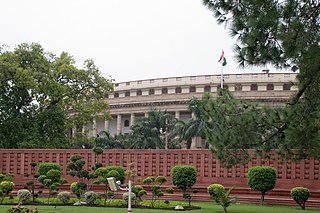
The 2001 Indian Parliament attack was a terrorist attack on the Parliament of India in New Delhi, India on 13 December 2001. The perpetrators belonged to Lashkar-e-Taiba (LeT) and Jaish-e-Mohammed (JeM) - two Pakistan-raised terrorist organisations. The attack led to the deaths of six Delhi Police personnel, two Parliament Security Service personnel, and a gardener – in total 9 – and led to increased tensions between India and Pakistan, resulting in the 2001–02 India–Pakistan standoff. The 5 terrorists were killed outside the parliament.
Banat Air Flight 166 crashes in Sommacampagna near Verona Villafranca Airport in Verona, Italy, killing 49.

Banat Air Flight 166 was an Antonov Antonov An-24 chartered on 13 December 1995 from Romavia by Banat Air.

Sommacampagna is a town and comune in the province of Verona, Veneto, northern Italy. As of 2017, its population was of 14,746.

Verona Villafranca Airport, also known as Valerio Catullo Airport or Villafranca Airport, is located 10 km (6.2 mi) southwest of Verona, Italy. The airport is situated next to the junction of A4 Milan-Venice and A22 Modena-Brenner motorways. It serves a population of more than 4 million inhabitants in the provinces of Verona, Brescia, Mantua (Mantova) and Trentino-Alto Adige/Südtirol.

Verona is a city on the Adige River in Veneto, Italy, with 258,031 inhabitants. It is one of the seven provincial capitals of the region. It is the largest city municipality in the region and the second largest in northeastern Italy. The metropolitan area of Verona covers an area of 1,426 km2 (550.58 sq mi) and has a population of 714,310 inhabitants. It is one of the main tourist destinations in northern Italy because of its artistic heritage and several annual fairs and shows as well as the opera season in the Arena, an ancient Roman amphitheater.

Italy, officially the Italian Republic, is a country located in the middle of the Mediterranean Sea, in Southern Europe; its territory largely coincides with the homonymous geographical region. Italy is also considered part of Western Europe. A unitary parliamentary republic with Rome as its capital and largest city, the country covers a total area of 301,230 km2 (116,310 sq mi) and shares land borders with France, Switzerland, Austria, Slovenia and the enclaved microstates of Vatican City and San Marino. Italy has a territorial exclave in Switzerland, Campione. With over 60 million inhabitants, Italy is the third-most populous member state of the European Union.
Flagship Airlines Flight 3379 crashes in Morrisville, North Carolina, near Raleigh–Durham International Airport, killing 15.

Flagship Airlines Flight 3379 was a scheduled flight under the American Eagle branding from Piedmont Triad International Airport to Raleigh–Durham International Airport during which a British Aerospace Jetstream crashed while executing a missed approach to the Raleigh–Durham International Airport on the evening of Tuesday, December 13, 1994. The two pilots and 13 passengers died in the crash; five passengers survived with serious injuries.

Morrisville is a town located primarily in Wake County, North Carolina, United States. The population was 18,576 at the 2010 census. The U.S. Census Bureau estimated the town's population to be 28,846 as of July 1, 2019. Morrisville is part of the Research Triangle metropolitan region. The regional name originated after the 1959 creation of the Research Triangle Park, located midway between the cities of Raleigh and Durham. The Research Triangle region encompasses the U.S. Census Bureau's Combined Statistical Area (CSA) of Raleigh-Durham-Cary. The estimated population of the Raleigh-Durham-Cary CSA was 1,565,223 as of July 1, 2006, with the Raleigh-Cary Metropolitan Statistical Area (MSA) portion estimated at 994,551 residents. The operational headquarter of an American -Chinese multinational technology company Lenovo is located in the municipal limits.

Raleigh–Durham International Airport, locally known by its IATA code RDU, is an international airport that serves Raleigh, Durham, and the surrounding Research Triangle region of North Carolina as its main airport. It is located in unincorporated Wake County, but is surrounded by the City of Raleigh to the North and East, and the towns of Cary and Morrisville to the South. The airport covers 5,000 acres and has three runways.
The Troubles: The Provisional Irish Republican Army engaged in a fierce firefight with the King's Own Scottish Borderers at a vehicle checkpoint complex in County Fermanagh, Northern Ireland.

The Troubles were an ethno-nationalist conflict in Northern Ireland that lasted about 30 years from the late 1960s to 1998. Also known internationally as the Northern Ireland conflict, it is sometimes described as an "irregular war" or "low-level war". The conflict began in the late 1960s and is usually deemed to have ended with the Good Friday Agreement of 1998. Although the Troubles mostly took place in Northern Ireland, at times violence spilled over into parts of the Republic of Ireland, England and mainland Europe.
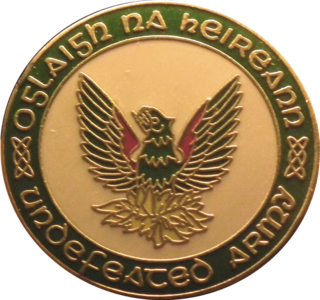
The Irish Republican Army, also known as the Provisional Irish Republican Army, and informally as the Provos, was an Irish republican paramilitary organisation that sought to end British rule in Northern Ireland, facilitate Irish reunification and bring about an independent, socialist republic encompassing all of Ireland. It was the most active republican paramilitary group during the Troubles. It saw itself as the army of the all-island Irish Republic and as the sole legitimate successor to the original IRA from the Irish War of Independence. It was designated a terrorist organisation in the United Kingdom and an unlawful organisation in the Republic of Ireland, both of whose authority it rejected.

On 13 December 1989 the Provisional Irish Republican Army (IRA) attacked a British Army permanent vehicle checkpoint complex manned by the King's Own Scottish Borderers (KOSB) near the Northern Ireland–Republic of Ireland border at Derryard, north of Rosslea, County Fermanagh. The IRA unit, firing from the back of an armoured dump truck, attacked the small base with heavy machine-guns, grenades, anti-tank rockets and a flamethrower. A nearby Army patrol arrived at the scene and a fierce firefight erupted. The IRA withdrew after leaving a van bomb inside the complex, but it did not fully detonate. The assault on the outpost left two soldiers dead and two wounded.

The King's Own Scottish Borderers (KOSBs) was a line infantry regiment of the British Army, part of the Scottish Division. On 28 March 2006 the regiment was amalgamated with the Royal Scots, the Royal Highland Fusiliers, the Black Watch, the Highlanders, the Argyll and Sutherland Highlanders, 52nd Lowland Regiment, and 51st Highland Regiment to form the Royal Regiment of Scotland, becoming the 2nd Battalion of the new regiment. However, after just a few months the battalion merged with the Royal Scots to form the Royal Scots Borderers. In 2021, the battalion was disbanded and its personnel transferred to the 1st Battalion, Ranger Regiment.

County Fermanagh is one of the thirty-two counties of Ireland, one of the nine counties of Ulster and one of the six counties of Northern Ireland.
The Troubles: Attack on Derryard checkpoint: The Provisional Irish Republican Army launches an attack on a British Army temporary vehicle checkpoint near Rosslea, Northern Ireland. Two British soldiers are killed and two others are wounded.

The Troubles were an ethno-nationalist conflict in Northern Ireland that lasted about 30 years from the late 1960s to 1998. Also known internationally as the Northern Ireland conflict, it is sometimes described as an "irregular war" or "low-level war". The conflict began in the late 1960s and is usually deemed to have ended with the Good Friday Agreement of 1998. Although the Troubles mostly took place in Northern Ireland, at times violence spilled over into parts of the Republic of Ireland, England and mainland Europe.

On 13 December 1989 the Provisional Irish Republican Army (IRA) attacked a British Army permanent vehicle checkpoint complex manned by the King's Own Scottish Borderers (KOSB) near the Northern Ireland–Republic of Ireland border at Derryard, north of Rosslea, County Fermanagh. The IRA unit, firing from the back of an armoured dump truck, attacked the small base with heavy machine-guns, grenades, anti-tank rockets and a flamethrower. A nearby Army patrol arrived at the scene and a fierce firefight erupted. The IRA withdrew after leaving a van bomb inside the complex, but it did not fully detonate. The assault on the outpost left two soldiers dead and two wounded.

The Irish Republican Army, also known as the Provisional Irish Republican Army, and informally as the Provos, was an Irish republican paramilitary organisation that sought to end British rule in Northern Ireland, facilitate Irish reunification and bring about an independent, socialist republic encompassing all of Ireland. It was the most active republican paramilitary group during the Troubles. It saw itself as the army of the all-island Irish Republic and as the sole legitimate successor to the original IRA from the Irish War of Independence. It was designated a terrorist organisation in the United Kingdom and an unlawful organisation in the Republic of Ireland, both of whose authority it rejected.

The British Army is the principal land warfare force of the United Kingdom, a part of the British Armed Forces along with the Royal Navy and the Royal Air Force. As of 2022, the British Army comprises 79,380 regular full-time personnel, 4,090 Gurkhas, and 28,330 volunteer reserve personnel.

Rosslea or Roslea is a small village in County Fermanagh, Northern Ireland, near the border with County Monaghan in the Republic of Ireland. It stands on the Finn River and is beset by small natural lakes. Roslea Forest, also known as Spring Grove Forest, is nearby. In the 2011 Census it had a population of 528 people.
PLO Chairman Yasser Arafat gives a speech at a UN General Assembly meeting in Geneva, Switzerland, after United States authorities refused to grant him a visa to visit UN headquarters in New York.

The Chairman of the Executive Committee of the Palestine Liberation Organization is the leader of the Executive Committee (EC) of the Palestine Liberation Organization (PLO), the executive body of the PLO, which was established in 1964. The Chairman represents the PLO and the Palestinian people before the international community, including the United Nations. The Chairman is chosen by the members of the PLO EC. Since 29 October 2004, Mahmoud Abbas has been the Chairman of the PLO EC.

Mohammed Abdel Rahman Abdel Raouf al-Qudwa al-Husseini, popularly known as Yasser Arafat or by his kunya Abu Ammar, was a Palestinian political leader. He was Chairman of the Palestine Liberation Organization (PLO) from 1969 to 2004 and President of the Palestinian National Authority (PNA) from 1994 to 2004. Ideologically an Arab nationalist and a socialist, he was a founding member of the Fatah political party, which he led from 1959 until 2004.

The United Nations General Assembly is one of the six principal organs of the United Nations (UN), serving as the main deliberative, policymaking, and representative organ of the UN. Currently in its 77th session, its powers, composition, functions, and procedures are set out in Chapter IV of the United Nations Charter. The UNGA is responsible for the UN budget, appointing the non-permanent members to the Security Council, appointing the UN secretary-general, receiving reports from other parts of the UN system, and making recommendations through resolutions. It also establishes numerous subsidiary organs to advance or assist in its broad mandate. The UNGA is the only UN organ wherein all member states have equal representation.

Geneva is the second-most populous city in Switzerland and the most populous city of Romandy, the French-speaking part of Switzerland. Situated in the south west of the country, where the Rhône exits Lake Geneva, it is the capital of the Republic and Canton of Geneva.

A visa is a conditional authorization granted by a polity to a foreigner that allows them to enter, remain within, or leave its territory. Visas typically include limits on the duration of the foreigner's stay, areas within the country they may enter, the dates they may enter, the number of permitted visits, or if the individual has the ability to work in the country in question. Visas are associated with the request for permission to enter a territory and thus are, in most countries, distinct from actual formal permission for an alien to enter and remain in the country. In each instance, a visa is subject to entry permission by an immigration official at the time of actual entry and can be revoked at any time. Visa evidence most commonly takes the form of a sticker endorsed in the applicant's passport or other travel document but may also exist electronically. Some countries no longer issue physical visa evidence, instead recording details only in immigration databases.
An earthquake registering 6.2 Mw struck North Yemen, killing about 2,800 people.
The 1982 North Yemen earthquake hit near the city of Dhamar, North Yemen on December 13. Measuring 6.2 on the moment magnitude scale, with a maximum perceived intensity of VIII (Severe) on the Mercalli intensity scale, as many as 2,800 people were killed and another 1,500 injured. The shock occurred within several hundred kilometers of a plate boundary in a geologically complex region that includes active volcanoes and seafloor spreading ridges. Yemen has a history of destructive earthquakes, though this was the first instrumentally recorded event to be detected on global seismograph networks.
The moment magnitude scale is a measure of an earthquake's magnitude based on its seismic moment. It was defined in a 1979 paper by Thomas C. Hanks and Hiroo Kanamori. Similar to the local magnitude scale (ML ) defined by Charles Francis Richter in 1935, it uses a logarithmic scale; small earthquakes have approximately the same magnitudes on both scales.

The Yemen Arab Republic, also known simply as North Yemen or Yemen (Sanaʽa), was a country from 1962 to 1990 in the northwestern part of what is now Yemen. Its capital was at Sanaa. It united with the People's Democratic Republic of Yemen on 22 May 1990 to form the current Republic of Yemen.
The 6.0 Ms North Yemen earthquake shakes southwestern Yemen with a maximum Mercalli intensity of VIII (Severe), killing 2,800, and injuring 1,500.
The 1982 North Yemen earthquake hit near the city of Dhamar, North Yemen on December 13. Measuring 6.2 on the moment magnitude scale, with a maximum perceived intensity of VIII (Severe) on the Mercalli intensity scale, as many as 2,800 people were killed and another 1,500 injured. The shock occurred within several hundred kilometers of a plate boundary in a geologically complex region that includes active volcanoes and seafloor spreading ridges. Yemen has a history of destructive earthquakes, though this was the first instrumentally recorded event to be detected on global seismograph networks.

Yemen, officially the Republic of Yemen, is a country in Western Asia. It is situated on the southern end of the Arabian Peninsula, and borders Saudi Arabia to the north and Oman to the northeast and shares maritime borders with Eritrea, Djibouti, and Somalia. Yemen is the second-largest Arab sovereign state in the peninsula, occupying 555,000 square kilometres, with a coastline stretching about 2,000 kilometres. Its constitutionally stated capital, and largest city, is Sanaa. As of 2021, Yemen has an estimated population of some 30.4 million.
The Modified Mercalli intensity scale, developed from Giuseppe Mercalli's Mercalli intensity scale of 1902, is a seismic intensity scale used for measuring the intensity of shaking produced by an earthquake. It measures the effects of an earthquake at a given location, distinguished from the earthquake's inherent force or strength as measured by seismic magnitude scales. While shaking is caused by the seismic energy released by an earthquake, earthquakes differ in how much of their energy is radiated as seismic waves. Deeper earthquakes also have less interaction with the surface, and their energy is spread out across a larger volume. Shaking intensity is localized, generally diminishing with distance from the earthquake's epicenter, but can be amplified in sedimentary basins and certain kinds of unconsolidated soils.
Polish prime minister Wojciech Jaruzelski (pictured) performed a self-coup by declaring martial law, suspending the trade union Solidarity and imprisoning many of its leaders.

Wojciech Witold Jaruzelski was a Polish military officer, politician and de facto leader of the Polish People's Republic from 1981 until 1989. He was the First Secretary of the Polish United Workers' Party between 1981 and 1989, making him the last leader of the Polish People's Republic. Jaruzelski served as Prime Minister from 1981 to 1985, the Chairman of the Council of State from 1985 to 1989 and briefly as President of Poland from 1989 to 1990, when the office of President was restored after 37 years. He was also the last commander-in-chief of the Polish People's Army, which in 1990 became the Polish Armed Forces.
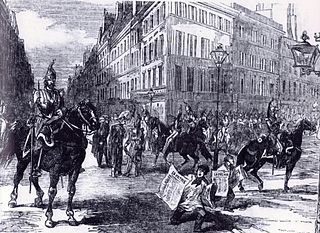
A self-coup, also called autocoup, is a form of coup d'état in which a nation's head, having come to power through legal means, tries to stay in power through illegal means. The leader may dissolve or render powerless the national legislature and unlawfully assume extraordinary powers not granted under normal circumstances. Other measures may include annulling the nation's constitution, suspending civil courts, and having the head of government assume dictatorial powers.
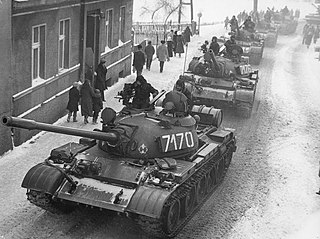
Martial law in Poland existed between 13 December 1981 and 22 July 1983. The government of the Polish People's Republic drastically restricted everyday life by introducing martial law and a military junta in an attempt to counter political opposition, in particular the Solidarity movement.

Solidarity, full name Independent Self-Governing Trade Union "Solidarity", is a Polish trade union founded in August 1980 at the Lenin Shipyard in Gdańsk, Poland. Subsequently, it was the first independent trade union in a Warsaw Pact country to be recognised by the state. The union's membership peaked at 10 million in September 1981, representing one-third of the country's working-age population. Solidarity's leader Lech Wałęsa was awarded the Nobel Peace Prize in 1983 and the union is widely recognised as having played a central role in the end of Communist rule in Poland.
General Wojciech Jaruzelski declares martial law in Poland, largely due to the actions by Solidarity.

Wojciech Witold Jaruzelski was a Polish military officer, politician and de facto leader of the Polish People's Republic from 1981 until 1989. He was the First Secretary of the Polish United Workers' Party between 1981 and 1989, making him the last leader of the Polish People's Republic. Jaruzelski served as Prime Minister from 1981 to 1985, the Chairman of the Council of State from 1985 to 1989 and briefly as President of Poland from 1989 to 1990, when the office of President was restored after 37 years. He was also the last commander-in-chief of the Polish People's Army, which in 1990 became the Polish Armed Forces.

Martial law in Poland existed between 13 December 1981 and 22 July 1983. The government of the Polish People's Republic drastically restricted everyday life by introducing martial law and a military junta in an attempt to counter political opposition, in particular the Solidarity movement.

Solidarity, full name Independent Self-Governing Trade Union "Solidarity", is a Polish trade union founded in August 1980 at the Lenin Shipyard in Gdańsk, Poland. Subsequently, it was the first independent trade union in a Warsaw Pact country to be recognised by the state. The union's membership peaked at 10 million in September 1981, representing one-third of the country's working-age population. Solidarity's leader Lech Wałęsa was awarded the Nobel Peace Prize in 1983 and the union is widely recognised as having played a central role in the end of Communist rule in Poland.
Air Indiana Flight 216 crashes near Evansville Regional Airport, killing 29, including the University of Evansville basketball team, support staff, and boosters of the team.

The Air Indiana Flight 216 crash occurred on December 13, 1977, at 19:22 CST, when a Douglas DC-3, registration N51071 carrying the University of Evansville basketball team, crashed on takeoff at the Evansville Regional Airport in Evansville, Indiana. The aircraft lost control and crashed shortly after lift-off. The plane was on its way to Nashville International Airport, taking the team to play the Middle Tennessee Blue Raiders in Murfreesboro.

Evansville Regional Airport is three miles north of Evansville, in Vanderburgh County, Indiana, United States. It is owned and operated by the Evansville-Vanderburgh Airport Authority District.

The Evansville Purple Aces men's basketball team represents the Purple Aces of the University of Evansville, located in Evansville, Indiana, in NCAA Division I basketball competition. They play their home games at the Ford Center. Evansville's athletics teams were originally known as the Pioneers in the early part of the 1900s. In the 1920s, the name Aces arose after a local sports writer wrote in a game story of the men's basketball team, "They played like Aces." The team has been known as the Aces and/or Purple Aces ever since. Evansville has won five Division II national championships. On November 12, 2019, the Aces earned one of the biggest victories in their Division I history, upsetting top-ranked Kentucky at Rupp Arena.
Malta becomes a republic within the Commonwealth of Nations.

Malta, officially the Republic of Malta, is an island country in the Mediterranean Sea. It consists of an archipelago, between Italy and Libya, and is often considered a part of Southern Europe. It lies 80 km (50 mi) south of Sicily (Italy), 284 km (176 mi) east of Tunisia, and 333 km (207 mi) north of Libya. The official languages are Maltese and English, and 66% of the current Maltese population is at least conversational in the Italian language.
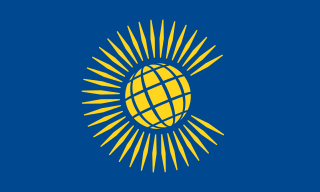
The Commonwealth of Nations, simply referred to as the Commonwealth, is a political association of 56 member states, the vast majority of which are former territories of the British Empire. The chief institutions of the organisation are the Commonwealth Secretariat, which focuses on intergovernmental aspects, and the Commonwealth Foundation, which focuses on non-governmental relations amongst member states. Numerous organisations are associated with and operate within the Commonwealth.
In the Vietnam War, the North Vietnamese forces launch their 1975 Spring Offensive (to 30 April 1975), which results in the final capitulation of South Vietnam.

The Vietnam War was a conflict in Vietnam, Laos, and Cambodia from 1 November 1955 to the fall of Saigon on 30 April 1975. It was the second of the Indochina Wars and was officially fought between North Vietnam and South Vietnam. The north was supported by the Soviet Union, China, and other communist states, while the south was supported by the United States and other anti-communist allies. The war is widely considered to be a Cold War-era proxy war. It lasted almost 20 years, with direct U.S. involvement ending in 1973. The conflict also spilled over into neighboring states, exacerbating the Laotian Civil War and the Cambodian Civil War, which ended with all three countries becoming communist states by 1975.

North Vietnam, officially the Democratic Republic of Vietnam was a socialist state supported by the Soviet Union (USSR) and the People's Republic of China (PRC) in Southeast Asia that existed from 1945 to 1976 and was recognized in 1954. Both the North Vietnamese and South Vietnamese states ceased to exist when they unified as the Socialist Republic of Vietnam.
The 1975 spring offensive, officially known as the general offensive and uprising of spring 1975 was the final North Vietnamese campaign in the Vietnam War that led to the capitulation of Republic of Vietnam. After the initial success capturing Phước Long Province, the North Vietnamese leadership increased the scope of the People's Army of Vietnam's (PAVN) offensive and captured and held the key Central Highlands city of Buôn Ma Thuột between 10 and 18 March. These operations were intended to be preparatory to launching a general offensive in 1976.
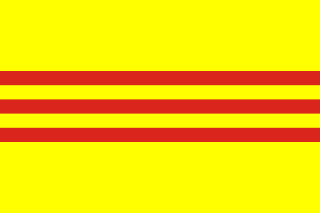
South Vietnam, officially the Republic of Vietnam, was a country in Southeast Asia that existed from 1955 to 1975, the period when the southern portion of Vietnam was a member of the Western Bloc during part of the Cold War after the 1954 division of Vietnam. It first received international recognition in 1949 as the State of Vietnam within the French Union, with its capital at Saigon, before becoming a republic in 1955. South Vietnam was bordered by North Vietnam to the north, Laos to the northwest, Cambodia to the southwest, and Thailand across the Gulf of Thailand to the southwest. Its sovereignty was recognized by the United States and 87 other nations, though it failed to gain admission into the United Nations as a result of a Soviet veto in 1957. It was succeeded by the Republic of South Vietnam in 1975.
Apollo program: Eugene Cernan and Harrison Schmitt begin the third and final extra-vehicular activity (EVA) or "Moonwalk" of Apollo 17. To date they are the last humans to set foot on the Moon.

The Apollo program, also known as Project Apollo, was the third United States human spaceflight program carried out by the National Aeronautics and Space Administration (NASA), which succeeded in preparing and landing the first humans on the Moon from 1968 to 1972. It was first conceived in 1960 during President Dwight D. Eisenhower's administration as a three-person spacecraft to follow the one-person Project Mercury, which put the first Americans in space. Apollo was later dedicated to President John F. Kennedy's national goal for the 1960s of "landing a man on the Moon and returning him safely to the Earth" in an address to Congress on May 25, 1961. It was the third US human spaceflight program to fly, preceded by the two-person Project Gemini conceived in 1961 to extend spaceflight capability in support of Apollo.

Eugene Andrew Cernan was an American astronaut, naval aviator, electrical engineer, aeronautical engineer, and fighter pilot. During the Apollo 17 mission, Cernan became the eleventh human being to walk on the Moon. As he re-entered the Apollo Lunar Module after Harrison Schmitt on their third and final lunar excursion, he remains as of 2022, famously: "The last man on the Moon".
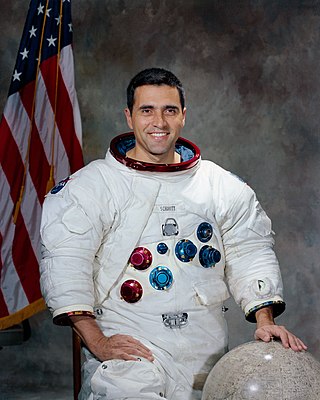
Harrison Hagan "Jack" Schmitt is an American geologist, retired NASA astronaut, university professor, former U.S. senator from New Mexico, and the most recent living person—and only person without a background in military aviation—to have walked on the Moon.

Extravehicular activity (EVA) is any activity done by an astronaut in outer space outside a spacecraft. Absent a breathable Earthlike atmosphere, the astronaut is completely reliant on a space suit for environmental support. EVA includes spacewalks and lunar or planetary surface exploration. In a stand-up EVA (SEVA), an astronaut stands through an open hatch but does not fully leave the spacecraft. EVA has been conducted by the Soviet Union/Russia, the United States, Canada, the European Space Agency and China.

Apollo 17 was the final mission of NASA's Apollo program, the most recent time humans have set foot on the Moon or traveled beyond low Earth orbit. Commander Gene Cernan and Lunar Module Pilot Harrison Schmitt walked on the Moon, while Command Module Pilot Ronald Evans orbited above. Schmitt was the only professional geologist to land on the Moon, selected in place of Joe Engle with NASA under pressure to send a scientist to the Moon. The mission's heavy emphasis on science meant the inclusion of a number of new experiments, including a biological experiment containing five mice carried in the command module.
Brazilian President Artur da Costa e Silva issues AI-5 (Institutional Act No. 5), enabling government by decree and suspending habeas corpus.

Artur da Costa e Silva was a Brazilian Army Marshal and the second president of the Brazilian military government that came to power after the 1964 coup d'état. He reached the rank of Marshal of the Brazilian Army, and held the post of Minister of War in the military government of President Castelo Branco.

The Ato Institucional Número Cinco – AI-5 was the fifth of seventeen major decrees issued by the military dictatorship in the years following the 1964 coup d'état in Brazil. Institutional Acts were the highest form of legislation during the military regime, given that they overruled even the highly authoritarian Constitution, and were enforced without the possibility of judicial review. They were issued on behalf of the "Supreme Command of the Revolution".
Habeas corpus is a recourse in law through which a person can report an unlawful detention or imprisonment to a court and request that the court order the custodian of the person, usually a prison official, to bring the prisoner to court, to determine whether the detention is lawful.
Constantine II of Greece attempts an unsuccessful counter-coup against the Regime of the Colonels.

Constantine II reigned as the last King of Greece, from 6 March 1964 until the abolition of the Greek monarchy on 1 June 1973.

The Greek junta or Regime of the Colonels was a right-wing military dictatorship that ruled Greece from 1967 to 1974. On 21 April 1967, a group of colonels overthrew the caretaker government a month before scheduled elections which Georgios Papandreou's Centre Union was favoured to win. The dictatorship was characterised by right-wing cultural policies, anti-communism, restrictions on civil liberties, and the imprisonment, torture, and exile of political opponents. It was ruled by Georgios Papadopoulos from 1967 to 1973, but an attempt to renew its support in a 1973 referendum on the monarchy and gradual democratisation was ended by another coup by the hardliner Dimitrios Ioannidis, who ruled it until it fell on 24 July 1974 under the pressure of the Turkish invasion of Cyprus, leading to the Metapolitefsi to democracy and the establishment of the Third Hellenic Republic.
NASA launches Relay 1, the first active repeater communications satellite in orbit.

The National Aeronautics and Space Administration is an independent agency of the US federal government responsible for the civil space program, aeronautics research, and space research.

The Relay program consisted of Relay 1 and Relay 2, two early American satellites in elliptical medium Earth orbit. Both were primarily experimental communications satellites funded by NASA and developed by RCA. As of December 2, 2016, both satellites were still in orbit. Relay 1 provided the first American television transmissions across the Pacific Ocean.

A satellite or artificial satellite is an object intentionally placed into orbit in outer space. Except for passive satellites, most satellites have an electricity generation system for equipment on board, such as solar panels or radioisotope thermoelectric generators (RTGs). Most satellites also have a method of communication to ground stations, called transponders. Many satellites use a standardized bus to save cost and work, the most popular of which is small CubeSats. Similar satellites can work together as a group, forming constellations. Because of the high launch cost to space, satellites are designed to be as lightweight and robust as possible. Most communication satellites are radio relay stations in orbit and carry dozens of transponders, each with a bandwidth of tens of megahertz.
With Haile Selassie, Emperor of Ethiopia, out of the country, four conspirators staged a coup attempt to install Crown Prince Asfaw Wossen as the new emperor.

Haile Selassie I was Emperor of Ethiopia from 1930 to 1974. He rose to power as Regent Plenipotentiary of Ethiopia (Enderase) for Empress Zewditu from 1916. Haile Selassie is widely considered a defining figure in modern Ethiopian history, and the key figure of Rastafari, a religious movement in Jamaica that emerged shortly after he became emperor in the 1930s. He was a member of the Solomonic dynasty, which claims to trace lineage to Emperor Menelik I, believed to be the son of King Solomon and Makeda the Queen of Sheba.

The emperor of Ethiopia, also known as the Atse, was the hereditary ruler of the Ethiopian Empire, from at least the 13th century until the abolition of the monarchy in 1975. The emperor was the head of state and head of government, with ultimate executive, judicial and legislative power in that country. A National Geographic article from 1965 called imperial Ethiopia "nominally a constitutional monarchy; in fact [it was] a benevolent autocracy".
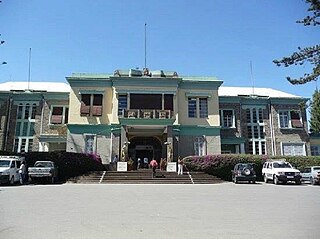
The 1960 Ethiopian coup d'etat attempt was an attempted coup d'etat and a series of shootouts in the Ethiopian Empire on 13 December 1960 against Emperor Haile Selassie. The Council of the Revolution, four conspirators led by brothers Germame Neway and Brigadier General Mengistu Neway, commander of the Kebur Zabagna, sought to overthrow the Emperor during a state visit to Brazil in order to install a progressive government. The coup leaders declared the beginning of a new government under the rule of Haile Selassie's eldest son, Crown Prince Asfaw Wossen, that would address the numerous economic and social problems Ethiopia faced. The Council gained control of most of the capital city, Addis Ababa, and took several ministers and other important people hostage. After its initial success, the majority of the military and populace quickly aligned against the coup, and by 17 December loyalists had regained control of Addis Ababa. At least 300 people were killed during the coup, including most of the conspirators.

Amha Selassie was Emperor-in-exile of Ethiopia. As son of Haile Selassie I, he was Crown Prince and was proclaimed Emperor three times. He was first proclaimed Emperor during an unsuccessful coup attempt against his father in December 1960, during which he alleged that he was detained and compelled to accept the title. After his father was deposed in a later coup, he was proclaimed Emperor again in absentia by the Derg on 12 September 1974 in an act which he never accepted as legitimate and that ended in the abolition of the Ethiopian monarchy on 12 March 1975. He was again proclaimed Emperor in exile on 8 April 1989. This time he sanctioned the proclamation and accepted its legitimacy. After his accession, his full reign name was His Imperial Majesty Emperor Amha Selassie I, Elect of God, Conquering Lion of the Tribe of Judah and King of Kings of Ethiopia.
While Emperor Haile Selassie of Ethiopia visits Brazil, his Imperial Bodyguard seizes the capital and proclaims him deposed and his son, Crown Prince Asfa Wossen, Emperor.

The emperor of Ethiopia, also known as the Atse, was the hereditary ruler of the Ethiopian Empire, from at least the 13th century until the abolition of the monarchy in 1975. The emperor was the head of state and head of government, with ultimate executive, judicial and legislative power in that country. A National Geographic article from 1965 called imperial Ethiopia "nominally a constitutional monarchy; in fact [it was] a benevolent autocracy".

Haile Selassie I was Emperor of Ethiopia from 1930 to 1974. He rose to power as Regent Plenipotentiary of Ethiopia (Enderase) for Empress Zewditu from 1916. Haile Selassie is widely considered a defining figure in modern Ethiopian history, and the key figure of Rastafari, a religious movement in Jamaica that emerged shortly after he became emperor in the 1930s. He was a member of the Solomonic dynasty, which claims to trace lineage to Emperor Menelik I, believed to be the son of King Solomon and Makeda the Queen of Sheba.

Ethiopia, officially the Federal Democratic Republic of Ethiopia, is a landlocked country in the Horn of Africa. It shares borders with Eritrea to the north, Djibouti to the northeast, Somalia to the east and northeast, Kenya to the south, South Sudan to the west, and Sudan to the northwest. Ethiopia has a total area of 1,100,000 square kilometres. As of 2022, it is home to around 113.5 million inhabitants, making it the 12th-most populous country in the world and the 2nd-most populous in Africa after Nigeria. The national capital and largest city, Addis Ababa, lies several kilometres west of the East African Rift that splits the country into the African and Somali tectonic plates.
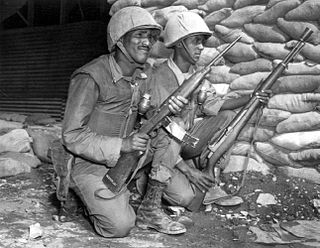
Kebur Zabagna or Zebenya was the Ethiopian imperial guard. Also known as the First Division, this unit served the dual purposes of providing security for the Emperor of Ethiopia, and being an elite infantry division. It was not, however, part of the organizational structure of the Ethiopian regular army as it was part of the Zebagna, the Addis Ababa Guard. The Kebur Zabagna was based at Addis Ababa.

The 1960 Ethiopian coup d'etat attempt was an attempted coup d'etat and a series of shootouts in the Ethiopian Empire on 13 December 1960 against Emperor Haile Selassie. The Council of the Revolution, four conspirators led by brothers Germame Neway and Brigadier General Mengistu Neway, commander of the Kebur Zabagna, sought to overthrow the Emperor during a state visit to Brazil in order to install a progressive government. The coup leaders declared the beginning of a new government under the rule of Haile Selassie's eldest son, Crown Prince Asfaw Wossen, that would address the numerous economic and social problems Ethiopia faced. The Council gained control of most of the capital city, Addis Ababa, and took several ministers and other important people hostage. After its initial success, the majority of the military and populace quickly aligned against the coup, and by 17 December loyalists had regained control of Addis Ababa. At least 300 people were killed during the coup, including most of the conspirators.

Amha Selassie was Emperor-in-exile of Ethiopia. As son of Haile Selassie I, he was Crown Prince and was proclaimed Emperor three times. He was first proclaimed Emperor during an unsuccessful coup attempt against his father in December 1960, during which he alleged that he was detained and compelled to accept the title. After his father was deposed in a later coup, he was proclaimed Emperor again in absentia by the Derg on 12 September 1974 in an act which he never accepted as legitimate and that ended in the abolition of the Ethiopian monarchy on 12 March 1975. He was again proclaimed Emperor in exile on 8 April 1989. This time he sanctioned the proclamation and accepted its legitimacy. After his accession, his full reign name was His Imperial Majesty Emperor Amha Selassie I, Elect of God, Conquering Lion of the Tribe of Judah and King of Kings of Ethiopia.
Archbishop Makarios III becomes the first President of Cyprus.
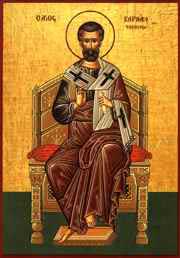
This is a list of Archbishops of Cyprus since its foundation with known dates of enthronement. According to tradition, the Church of Cyprus was created by St. Barnabas in 45 AD. The see of Cyprus was declared autocephalous by the Council of Ephesus, on 30 July 431; its autocephaly was abolished in 1260, and was restored in 1571. As the head of the Church of Cyprus, the holder is styled Archbishop of Nova Justiniana and All Cyprus.

Makarios III was a Cypriot clergyman and politician who served as the archbishop and primate of the autocephalous Church of Cyprus (1950–1977) and as the first president of Cyprus (1960–1977). In his three terms as president he survived four assassination attempts and a coup d'état. He is widely regarded by Greek Cypriots as the Father of the Nation or "Ethnarch".
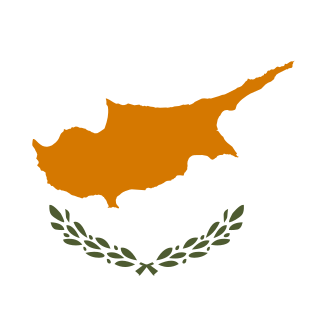
The president of Cyprus, officially the president of the Republic of Cyprus, is the head of state and the head of government of Cyprus. The office was created in 1960, after Cyprus gained its independence from the United Kingdom.
The Mw 6.5 Farsinaj earthquake strikes Iran with a maximum Mercalli intensity of VII, causing at least 1,119 deaths and damaging over 5,000 homes.
The 1957 Farsinaj earthquake struck Hamadan, Iran on 13 December at 05:15 local time. The moment magnitude 6.5 earthquake destroyed 211 villages, killed approximately 1,130 people, and left another 900 injured.
The Knesset votes to move the capital of Israel from Tel Aviv to Jerusalem.

The Knesset is the unicameral legislature of Israel. As the supreme state body, the Knesset is sovereign and thus has complete control of the entirety of the Israeli government.

Israel, officially the State of Israel, is a country in Western Asia. It is situated on the southeastern shore of the Mediterranean Sea and the northern shore of the Red Sea, and shares borders with Lebanon to the north, Syria to the northeast, Jordan to the east, and Egypt to the southwest. Israel also is bordered by the Palestinian territories of the West Bank and the Gaza Strip to the east and west, respectively. Tel Aviv is the economic and technological center of the country, while its seat of government is in its proclaimed capital of Jerusalem, although Israeli sovereignty over East Jerusalem is unrecognized internationally.

Tel Aviv-Yafo, often referred to as just Tel Aviv, is the most populous city in the Gush Dan metropolitan area of Israel. Located on the Israeli Mediterranean coastline and with a population of 460,613, it is the economic and technological center of the country. If East Jerusalem is considered part of Israel, Tel Aviv is the country's second most populous city after Jerusalem; if not, Tel Aviv is the most populous city ahead of West Jerusalem.
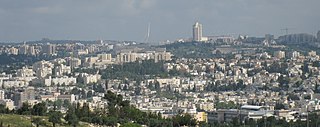
Jerusalem is a city in Western Asia. Situated on a plateau in the Judaean Mountains between the Mediterranean and the Dead Sea, it is one of the oldest cities in the world and is considered to be a holy city for the three major Abrahamic religions: Judaism, Christianity, and Islam. Both Israelis and Palestinians claim Jerusalem as their capital, as Israel maintains its primary governmental institutions there and the State of Palestine ultimately foresees it as its seat of power. Because of this dispute, neither claim is widely recognized internationally.
World War II: The Massacre of Kalavryta by German occupying forces in Greece.

The Kalavryta massacre, or the Holocaust of Kalavryta, was the near-extermination of the male population and the total destruction of the town of Kalavryta, Axis-occupied Greece, by the 117th Jäger Division (Wehrmacht) during World War II, on 13 December 1943.
The Battle of the River Plate is fought off the coast of Uruguay; the first naval battle of World War II. The Kriegsmarine's Deutschland-class cruiser (pocket battleship) Admiral Graf Spee engages with three Royal Navy cruisers: HMS Ajax, HMNZS Achilles and HMS Exeter.

The Battle of the River Plate was fought in the South Atlantic on 13 December 1939 as the first naval battle of the Second World War. The Kriegsmarine heavy cruiser Admiral Graf Spee, commanded by Captain Hans Langsdorff, engaged a Royal Navy squadron, commanded by Commodore Henry Harwood, comprising the light cruisers HMS Ajax, HMS Achilles and the heavy cruiser HMS Exeter.

World War II or the Second World War, often abbreviated as WWII or WW2, was a world war that lasted from 1939 to 1945. It involved the vast majority of the world's countries—including all of the great powers—forming two opposing military alliances: the Allies and the Axis powers. World War II was a total war that directly involved more than 100 million personnel from more than 30 countries.
The Kriegsmarine was the navy of Germany from 1935 to 1945. It superseded the Imperial German Navy of the German Empire (1871–1918) and the inter-war Reichsmarine (1919–1935) of the Weimar Republic. The Kriegsmarine was one of three official branches, along with the Heer and the Luftwaffe, of the Wehrmacht, the German armed forces from 1935 to 1945.

The Deutschland class was a series of three Panzerschiffe, a form of heavily armed cruiser, built by the Reichsmarine officially in accordance with restrictions imposed by the Treaty of Versailles. The ships of the class, Deutschland, Admiral Scheer, and Admiral Graf Spee, were all stated to displace 10,000 long tons (10,160 t) in accordance with the Treaty, though they actually displaced 10,600 to 12,340 long tons at standard displacement. The design for the ships incorporated several radical innovations, including the first major use of welding in a warship and all-diesel propulsion. Due to their heavy armament of six 28 cm (11 in) guns and lighter weight, the British began referring to the vessels as "pocket battleships". The Deutschland-class ships were initially classified as Panzerschiffe, but the Kriegsmarine reclassified them as heavy cruisers in February 1940.

Admiral Graf Spee was a Deutschland-class "Panzerschiff", nicknamed a "pocket battleship" by the British, which served with the Kriegsmarine of Nazi Germany during World War II. The vessel was named after World War I Admiral Maximilian von Spee, commander of the East Asia Squadron who fought the battles of Coronel and the Falkland Islands, where he was killed in action. She was laid down at the Reichsmarinewerft shipyard in Wilhelmshaven in October 1932 and completed by January 1936. The ship was nominally under the 10,000 long tons (10,000 t) limitation on warship size imposed by the Treaty of Versailles, though with a full load displacement of 16,020 long tons (16,280 t), she significantly exceeded it. Armed with six 28 cm (11 in) guns in two triple gun turrets, Admiral Graf Spee and her sisters were designed to outgun any cruiser fast enough to catch them. Their top speed of 28 knots left only the few battlecruisers in the Anglo-French navies fast enough and powerful enough to sink them.

The Royal Navy (RN) is the United Kingdom's naval warfare force. Although warships were used by English and Scottish kings from the early medieval period, the first major maritime engagements were fought in the Hundred Years' War against France. The modern Royal Navy traces its origins to the early 16th century; the oldest of the UK's armed services, it is consequently known as the Senior Service.
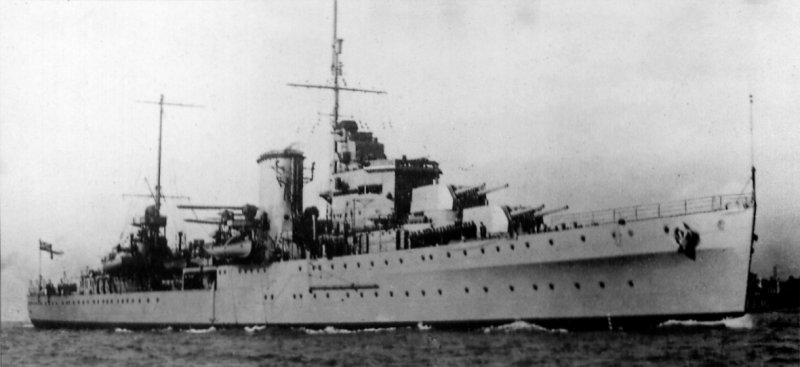
HMS Ajax was a Leander-class light cruiser which served with the Royal Navy during World War II. She became famous for her part in the Battle of the River Plate, the Battle of Crete, the Battle of Malta and as a supply escort in the siege of Tobruk. This ship was the eighth in the Royal Navy to bear the name. In February 1942, she was adopted by the civil community of Halifax.

HMNZS Achilles was a Leander-class light cruiser, the second of five in the class. She served in the Royal New Zealand Navy in the Second World War. She was launched in 1931 for the Royal Navy, loaned to New Zealand in 1936 and transferred to the new Royal New Zealand Navy in 1941. She became famous for her part in the Battle of the River Plate, alongside HMS Ajax and HMS Exeter and notable for being the first Royal Navy cruiser to have fire control radar, with the installation of the New Zealand-made SS1 fire-control radar in June 1940.

HMS Exeter was the second and last York-class heavy cruiser built for the Royal Navy during the late 1920s. Aside from a temporary deployment with the Mediterranean Fleet during the Abyssinia Crisis of 1935–36, she spent the bulk of the 1930s assigned to the Atlantic Fleet or the North America and West Indies Station. When World War II began in September 1939, the cruiser was assigned to patrol South American waters against German commerce raiders. Exeter was one of three British cruisers that fought the German pocket battleship, the Admiral Graf Spee, later that year in the Battle of the River Plate. She was severely damaged during the battle, and she was in the shipyard for over a year.
The Holocaust: The Neuengamme concentration camp opens in the Bergedorf district of Hamburg, Germany.

The Holocaust, also known as the Shoah, was the genocide of European Jews during World War II. Between 1941 and 1945, Nazi Germany and its collaborators systematically murdered some six million Jews across German-occupied Europe; around two-thirds of Europe's Jewish population. The murders were carried out in pogroms and mass shootings; by a policy of extermination through labor in concentration camps; and in gas chambers and gas vans in German extermination camps, chiefly Auschwitz-Birkenau, Bełżec, Chełmno, Majdanek, Sobibór, and Treblinka in occupied Poland.

Neuengamme was a network of Nazi concentration camps in Northern Germany that consisted of the main camp, Neuengamme, and more than 85 satellite camps. Established in 1938 near the village of Neuengamme in the Bergedorf district of Hamburg, the Neuengamme camp became the largest concentration camp in Northwest Germany. Over 100,000 prisoners came through Neuengamme and its subcamps, 24 of which were for women. The verified death toll is 42,900: 14,000 in the main camp, 12,800 in the subcamps, and 16,100 in the death marches and bombings during the final weeks of World War II. Following Germany's defeat in 1945, the British Army used the site as an internment camp for SS and other Nazi officials. In 1948, the British transferred the land to the Free Hanseatic City of Hamburg, which summarily demolished the camp's wooden barracks and built in its stead a prison cell block, converting the former concentration camp site into two state prisons operated by the Hamburg authorities from 1950 to 2004. Following protests by various groups of survivors and allies, the site now serves as a memorial. It is situated 15 km southeast of the centre of Hamburg.
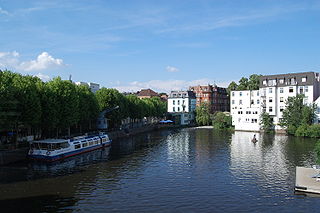
Bergedorf is the largest of the seven boroughs of Hamburg, Germany, named after Bergedorf quarter within this borough. In 2020 the population of the borough was 130,994.

Hamburg, officially the Free and Hanseatic City of Hamburg, is the second-largest city in Germany after Berlin, as well as the overall 7th largest city and largest non-capital city in the European Union with a population of over 1.85 million. Hamburg's urban area has a population of around 2.5 million and is part of the Hamburg Metropolitan Region, which has a population of over 5.1 million people in total. The city lies on the River Elbe and two of its tributaries, the River Alster and the River Bille. One of Germany's 16 federated states, Hamburg is surrounded by Schleswig-Holstein to the north and Lower Saxony to the south.
Second Sino-Japanese War: Japanese forces captured Nanking in China and then committed numerous atrocities over the next several weeks.
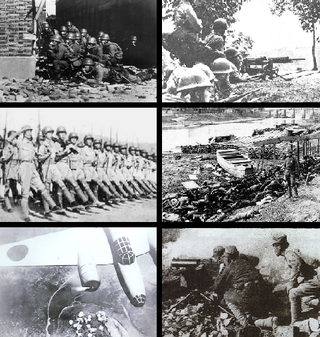
The Second Sino-Japanese War (1937–1945) or War of Resistance was a military conflict that was primarily waged between the Republic of China and the Empire of Japan. The war made up the Chinese theater of the wider Pacific Theater of the Second World War. The beginning of the war is conventionally dated to the Marco Polo Bridge Incident on 7 July 1937, when a dispute between Japanese and Chinese troops in Peking escalated into a full-scale invasion. Some Chinese historians believe that the Japanese invasion of Manchuria on 18 September 1931 marks the start of the war. This full-scale war between the Chinese and the Empire of Japan is often regarded as the beginning of World War II in Asia.

The Battle of Nanking was fought in early December 1937 during the Second Sino-Japanese War between the Chinese National Revolutionary Army and the Imperial Japanese Army for control of Nanking (Nanjing), the capital of the Republic of China.
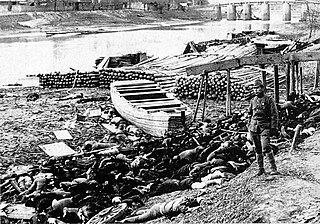
The Nanjing Massacre or the Rape of Nanjing was the mass murder of Chinese civilians in Nanjing, the capital of the Republic of China, immediately after the Battle of Nanking in the Second Sino-Japanese War, by the Imperial Japanese Army. Beginning on December 13, 1937, the massacre lasted six weeks. The perpetrators also committed other war crimes such as mass rape, looting, and arson. The massacre was one of the worst atrocities committed during World War II.
Second Sino-Japanese War: Japanese forces captured Nanjing in China and then began to commit numerous atrocities over the next several weeks, such as looting, rape and the execution of prisoners of war and civilians.

The Second Sino-Japanese War (1937–1945) or War of Resistance was a military conflict that was primarily waged between the Republic of China and the Empire of Japan. The war made up the Chinese theater of the wider Pacific Theater of the Second World War. The beginning of the war is conventionally dated to the Marco Polo Bridge Incident on 7 July 1937, when a dispute between Japanese and Chinese troops in Peking escalated into a full-scale invasion. Some Chinese historians believe that the Japanese invasion of Manchuria on 18 September 1931 marks the start of the war. This full-scale war between the Chinese and the Empire of Japan is often regarded as the beginning of World War II in Asia.

The Imperial Japanese Army was the official ground-based armed force of the Empire of Japan from 1868 to 1945. It was controlled by the Imperial Japanese Army General Staff Office and the Ministry of the Army, both of which were nominally subordinate to the Emperor of Japan as supreme commander of the army and the Imperial Japanese Navy. Later an Inspectorate General of Aviation became the third agency with oversight of the army. During wartime or national emergencies, the nominal command functions of the emperor would be centralized in an Imperial General Headquarters (IGHQ), an ad hoc body consisting of the chief and vice chief of the Army General Staff, the Minister of the Army, the chief and vice chief of the Naval General Staff, the Inspector General of Aviation, and the Inspector General of Military Training.

The Battle of Nanking was fought in early December 1937 during the Second Sino-Japanese War between the Chinese National Revolutionary Army and the Imperial Japanese Army for control of Nanking (Nanjing), the capital of the Republic of China.

Nanjing, alternately romanized as Nanking, is the capital of Jiangsu province of the People's Republic of China. It is a sub-provincial city, a megacity, and the third largest city in the East China region. The city has 11 districts, an administrative area of 6,600 km2 (2,500 sq mi), and a total recorded population of 9,314,685 as of 2020.

China, officially the People's Republic of China (PRC), is a country in East Asia. It is the world's most populous country, with a population exceeding 1.4 billion, slightly ahead of India. China spans the equivalent of five time zones and borders fourteen countries by land, the most of any country in the world, tied with Russia. China also has a narrow maritime boundary with the disputed Taiwan. Covering an area of approximately 9.6 million square kilometers (3,700,000 sq mi), it is the world's third largest country by total land area. The country consists of 22 provinces, five autonomous regions, four municipalities, and two Special Administrative Regions. The national capital is Beijing, and the most populous city and financial center is Shanghai.

The Nanjing Massacre or the Rape of Nanjing was the mass murder of Chinese civilians in Nanjing, the capital of the Republic of China, immediately after the Battle of Nanking in the Second Sino-Japanese War, by the Imperial Japanese Army. Beginning on December 13, 1937, the massacre lasted six weeks. The perpetrators also committed other war crimes such as mass rape, looting, and arson. The massacre was one of the worst atrocities committed during World War II.
Second Sino-Japanese War: Battle of Nanking: The city of Nanjing, defended by the National Revolutionary Army under the command of General Tang Shengzhi, falls to the Japanese. This is followed by the Nanking Massacre, in which Japanese troops rape and slaughter hundreds of thousands of civilians.

The Second Sino-Japanese War (1937–1945) or War of Resistance was a military conflict that was primarily waged between the Republic of China and the Empire of Japan. The war made up the Chinese theater of the wider Pacific Theater of the Second World War. The beginning of the war is conventionally dated to the Marco Polo Bridge Incident on 7 July 1937, when a dispute between Japanese and Chinese troops in Peking escalated into a full-scale invasion. Some Chinese historians believe that the Japanese invasion of Manchuria on 18 September 1931 marks the start of the war. This full-scale war between the Chinese and the Empire of Japan is often regarded as the beginning of World War II in Asia.

The Battle of Nanking was fought in early December 1937 during the Second Sino-Japanese War between the Chinese National Revolutionary Army and the Imperial Japanese Army for control of Nanking (Nanjing), the capital of the Republic of China.

Nanjing, alternately romanized as Nanking, is the capital of Jiangsu province of the People's Republic of China. It is a sub-provincial city, a megacity, and the third largest city in the East China region. The city has 11 districts, an administrative area of 6,600 km2 (2,500 sq mi), and a total recorded population of 9,314,685 as of 2020.

The National Revolutionary Army, sometimes shortened to Revolutionary Army (革命軍) before 1928, and as National Army (國軍) after 1928, was the military arm of the Kuomintang from 1925 until 1947 in China. It also became the regular army of the Republican era during the KMT's period of party rule beginning in 1928. It was renamed the Republic of China Armed Forces after the 1947 Constitution, which instituted civilian control of the military.

Tang Shengzhi was a Chinese warlord during the Warlord Era, a military commander during the Second Sino-Japanese War and a politician after World War II.

The Empire of Japan, also known as the Japanese Empire or Imperial Japan, was a historical nation-state and great power that existed from the Meiji Restoration in 1868 until the enactment of the post-World War II 1947 constitution and subsequent formation of modern Japan. It encompassed the Japanese archipelago and several colonies, protectorates, mandates, and other territories.

The Nanjing Massacre or the Rape of Nanjing was the mass murder of Chinese civilians in Nanjing, the capital of the Republic of China, immediately after the Battle of Nanking in the Second Sino-Japanese War, by the Imperial Japanese Army. Beginning on December 13, 1937, the massacre lasted six weeks. The perpetrators also committed other war crimes such as mass rape, looting, and arson. The massacre was one of the worst atrocities committed during World War II.
An American in Paris, a jazz-influenced orchestral piece by George Gershwin, premiered at Carnegie Hall in New York.

An American in Paris is a jazz-influenced orchestral piece by American composer George Gershwin first performed in 1928. It was inspired by the time that Gershwin had spent in Paris and evokes the sights and energy of the French capital during the Années follescode: fra promoted to code: fr .
Jazz is a music genre that originated in the African-American communities of New Orleans, Louisiana in the late 19th and early 20th centuries, with its roots in blues and ragtime. Since the 1920s Jazz Age, it has been recognized as a major form of musical expression in traditional and popular music. Jazz is characterized by swing and blue notes, complex chords, call and response vocals, polyrhythms and improvisation. Jazz has roots in European harmony and African rhythmic rituals.
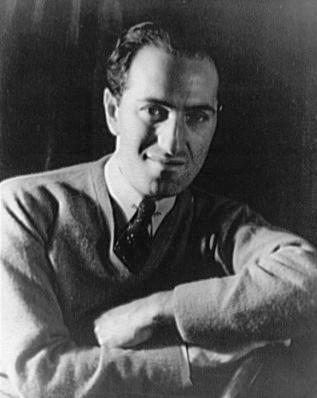
George Gershwin was an American composer and pianist whose compositions spanned popular, jazz and classical genres. Among his best-known works are the orchestral compositions Rhapsody in Blue (1924) and An American in Paris (1928), the songs "Swanee" (1919) and "Fascinating Rhythm" (1924), the jazz standards "Embraceable You" (1928) and "I Got Rhythm" (1930), and the opera Porgy and Bess (1935), which included the hit "Summertime".

Carnegie Hall is a concert venue in Midtown Manhattan in New York City. It is at 881 Seventh Avenue, occupying the east side of Seventh Avenue between West 56th and 57th Streets. Designed by architect William Burnet Tuthill and built by philanthropist Andrew Carnegie, it is one of the most prestigious venues in the world for both classical music and popular music. Carnegie Hall has its own artistic programming, development, and marketing departments and presents about 250 performances each season. It is also rented out to performing groups.
A Fenian bomb explodes in Clerkenwell, London, killing 12 people and injuring 50.

The word Fenian served as an umbrella term for the Irish Republican Brotherhood (IRB) and their affiliate in the United States, the Fenian Brotherhood, secret political organisations in the late 19th and early 20th centuries dedicated to the establishment of an independent Irish Republic. In 1867 they sought to coordinate raids into Canada from the United States with a rising in Ireland. In the 1916 Easter Rising and the 1919–1921 Irish War of Independence, the IRB led the republican struggle.

Clerkenwell is an area of central London, England.
American Civil War: Union forces under Ambrose Burnside suffered severe casualties against entrenched Confederate defenders at the Battle of Fredericksburg in Virginia.

The American Civil War was a civil war in the United States. It was fought between the Union and the Confederacy, the latter formed by states that had seceded. The central cause of the war was the dispute over whether slavery would be permitted to expand into the western territories, leading to more slave states, or be prevented from doing so, which was widely believed would place slavery on a course of ultimate extinction.

During the American Civil War, the Union Army, also known as the Federal Army and the Northern Army, referring to the United States Army, was the land force that fought to preserve the Union of the collective states. It proved essential to the preservation of the United States as a working, viable republic.

Ambrose Everett Burnside was an American army officer and politician who became a senior Union general in the Civil War and three times Governor of Rhode Island, as well as being a successful inventor and industrialist.

The Confederate States Army, also called the Confederate Army or the Southern Army, was the military land force of the Confederate States of America during the American Civil War (1861–1865), fighting against the United States forces in order to win the independence of the Southern states and uphold the institution of slavery. On February 28, 1861, the Provisional Confederate Congress established a provisional volunteer army and gave control over military operations and authority for mustering state forces and volunteers to the newly chosen Confederate president, Jefferson Davis. Davis was a graduate of the U.S. Military Academy, and colonel of a volunteer regiment during the Mexican–American War. He had also been a United States senator from Mississippi and U.S. Secretary of War under President Franklin Pierce. On March 1, 1861, on behalf of the Confederate government, Davis assumed control of the military situation at Charleston, South Carolina, where South Carolina state militia besieged Fort Sumter in Charleston harbor, held by a small U.S. Army garrison. By March 1861, the Provisional Confederate Congress expanded the provisional forces and established a more permanent Confederate States Army.

The Battle of Fredericksburg was fought December 11–15, 1862, in and around Fredericksburg, Virginia, in the Eastern Theater of the American Civil War. The combat, between the Union Army of the Potomac commanded by Maj. Gen. Ambrose Burnside and the Confederate Army of Northern Virginia under Gen. Robert E. Lee, included futile frontal attacks by the Union army on December 13 against entrenched Confederate defenders along the Sunken Wall on the heights behind the city. It is remembered as one of the most one-sided battles of the war, with Union casualties more than twice as heavy as those suffered by the Confederates. A visitor to the battlefield described the battle as a "butchery" to U.S. President Abraham Lincoln.
American Civil War: At the Battle of Fredericksburg, Confederate General Robert E. Lee defeats Union Major General Ambrose Burnside.

The American Civil War was a civil war in the United States. It was fought between the Union and the Confederacy, the latter formed by states that had seceded. The central cause of the war was the dispute over whether slavery would be permitted to expand into the western territories, leading to more slave states, or be prevented from doing so, which was widely believed would place slavery on a course of ultimate extinction.

The Battle of Fredericksburg was fought December 11–15, 1862, in and around Fredericksburg, Virginia, in the Eastern Theater of the American Civil War. The combat, between the Union Army of the Potomac commanded by Maj. Gen. Ambrose Burnside and the Confederate Army of Northern Virginia under Gen. Robert E. Lee, included futile frontal attacks by the Union army on December 13 against entrenched Confederate defenders along the Sunken Wall on the heights behind the city. It is remembered as one of the most one-sided battles of the war, with Union casualties more than twice as heavy as those suffered by the Confederates. A visitor to the battlefield described the battle as a "butchery" to U.S. President Abraham Lincoln.

The Confederate States of America (CSA), commonly referred to as the Confederate States, the Confederacy, or "the South", was an unrecognized breakaway republic in North America that existed from February 8, 1861, to May 9, 1865. The Confederacy comprised U.S. states that declared secession and warred against the United States during the American Civil War. Eleven U.S. states, nicknamed Dixie, declared secession and formed the main part of the CSA. They were South Carolina, Mississippi, Florida, Alabama, Georgia, Louisiana, Texas, Virginia, Arkansas, Tennessee, and North Carolina. Kentucky, and Missouri also had declarations of secession and full representation in the Confederate Congress during their Union army occupation.

Robert Edward Lee was a Confederate general during the American Civil War, towards the end of which he was appointed the overall commander of the Confederate States Army. He led the Army of Northern Virginia—the Confederacy's most powerful army—from 1862 until its surrender in 1865, earning a reputation as a skilled tactician.

During the American Civil War, the Union Army, also known as the Federal Army and the Northern Army, referring to the United States Army, was the land force that fought to preserve the Union of the collective states. It proved essential to the preservation of the United States as a working, viable republic.

Ambrose Everett Burnside was an American army officer and politician who became a senior Union general in the Civil War and three times Governor of Rhode Island, as well as being a successful inventor and industrialist.
Cyril VI of Constantinople resigns from his position as Ecumenical Patriarch under pressure from the Ottoman Empire.

Cyril VI, lay name Konstantinos Serpetzoglou was the Ecumenical Patriarch of Constantinople between the years 1813 and 1818.
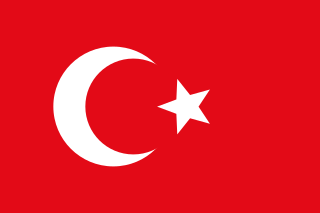
The Ottoman Empire, also known as the Turkish Empire, was an empire that controlled much of Southeast Europe, Western Asia, and Northern Africa between the 14th and early 20th centuries. It was founded at the end of the 13th century in northwestern Anatolia in the town of Söğüt by the Turkoman tribal leader Osman I. After 1354, the Ottomans crossed into Europe and, with the conquest of the Balkans, the Ottoman beylik was transformed into a transcontinental empire. The Ottomans ended the Byzantine Empire with the conquest of Constantinople in 1453 by Mehmed the Conqueror.
Dartmouth College, in present-day Hanover, New Hampshire, was established by royal charter, becoming the last university to be founded in the Thirteen Colonies before the American Revolution.

Dartmouth College is a private Ivy League research university in Hanover, New Hampshire. Established in 1769 by Eleazar Wheelock, it is one of the nine colonial colleges chartered before the American Revolution and among the most prestigious in the United States. Although founded to educate Native Americans in Christian theology and the English way of life, the university primarily trained Congregationalist ministers during its early history before it gradually secularized, emerging at the turn of the 20th century from relative obscurity into national prominence.

Hanover is a town located along the Connecticut River in Grafton County, New Hampshire, United States. As of the 2020 census, its population was 11,870. The town is home to the Ivy League university Dartmouth College, the U.S. Army Corps of Engineers Cold Regions Research and Engineering Laboratory, and Hanover High School. The Appalachian Trail crosses the town, connecting with a number of trails and nature preserves.

A royal charter is a formal grant issued by a monarch under royal prerogative as letters patent. Historically, they have been used to promulgate public laws, the most famous example being the English Magna Carta of 1215, but since the 14th century have only been used in place of private acts to grant a right or power to an individual or a body corporate. They were, and are still, used to establish significant organisations such as boroughs, universities and learned societies.

The Thirteen Colonies, also known as the Thirteen British Colonies, the Thirteen American Colonies, or later as the United Colonies, were a group of British colonies on the Atlantic coast of North America. Founded in the 17th and 18th centuries, they began fighting the American Revolutionary War in April 1775 and formed the United States of America by declaring full independence in July 1776. Just prior to declaring independence, the Thirteen Colonies in their traditional groupings were: New England ; Middle ; Southern. The Thirteen Colonies came to have very similar political, constitutional, and legal systems, dominated by Protestant English-speakers. The first of these colonies was Virginia Colony in 1607, a Southern colony. While all these colonies needed to become economically viable, the founding of the New England colonies, as well as the colonies of Maryland and Pennsylvania, were substantially motivated by their founders' concerns related to the practice of religion. The other colonies were founded for business and economic expansion. The Middle Colonies were established on an earlier Dutch colony, New Netherland. All the Thirteen Colonies were part of Britain's possessions in the New World, which also included territory in Canada, Florida, and the Caribbean.

The American Revolution was an ideological and political revolution that occurred in British America between 1765 and 1791. The Americans in the Thirteen Colonies formed independent states that defeated the British in the American Revolutionary War (1775–1783), gaining independence from the British Crown and establishing the United States of America as the first nation-state founded on Enlightenment principles of liberal democracy.
Dartmouth College is founded by the Reverend Eleazar Wheelock, with a royal charter from King George III, on land donated by Royal governor John Wentworth.

Dartmouth College is a private Ivy League research university in Hanover, New Hampshire. Established in 1769 by Eleazar Wheelock, it is one of the nine colonial colleges chartered before the American Revolution and among the most prestigious in the United States. Although founded to educate Native Americans in Christian theology and the English way of life, the university primarily trained Congregationalist ministers during its early history before it gradually secularized, emerging at the turn of the 20th century from relative obscurity into national prominence.

Eleazar Wheelock was an American Congregational minister, orator, and educator in Lebanon, Connecticut, for 35 years before founding Dartmouth College in New Hampshire. He had tutored Samson Occom, a Mohegan who became a Presbyterian minister and the first Native American to publish writings in English. Before founding Dartmouth, Wheelock founded and ran the Moor's Charity School in Connecticut to educate Native Americans. The college was primarily for the sons of American colonists.

A royal charter is a formal grant issued by a monarch under royal prerogative as letters patent. Historically, they have been used to promulgate public laws, the most famous example being the English Magna Carta of 1215, but since the 14th century have only been used in place of private acts to grant a right or power to an individual or a body corporate. They were, and are still, used to establish significant organisations such as boroughs, universities and learned societies.

George III was King of Great Britain and of Ireland from 25 October 1760 until the union of the two kingdoms on 1 January 1801, after which he was King of the United Kingdom of Great Britain and Ireland until his death in 1820. He was the longest-lived and longest-reigning king in British history. He was concurrently Duke and Prince-elector of Brunswick-Lüneburg ("Hanover") in the Holy Roman Empire before becoming King of Hanover on 12 October 1814. He was a monarch of the House of Hanover but, unlike his two predecessors, he was born in Great Britain, spoke English as his first language and never visited Hanover.

Governor-general, or governor general, is the title of an office-holder. In the context of governors-general and former British colonies, governors-general are appointed as viceroy to represent the monarch of a personal union in any sovereign state over which the monarch does not normally reign in person. Governors-general have also previously been appointed in respect of major colonial states or other territories held by either a monarchy or republic, such as Japan in Korea and France in Indochina.
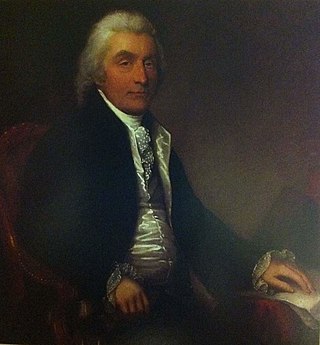
Sir John Wentworth, 1st Baronet was the British colonial governor of New Hampshire at the time of the American Revolution. He was later also Lieutenant-Governor of Nova Scotia. He is buried in the crypt of St. Paul's Church in Halifax.
The English transport ship Duke William sinks in the North Atlantic, killing over 360 people.
Duke William was a ship which served as a troop transport at the Siege of Louisbourg and as a deportation ship in the Île Saint-Jean Campaign of the Expulsion of the Acadians during the Seven Years' War. While Duke William was transporting Acadians from Île Saint-Jean to France, the ship sank in the North Atlantic on December 13, 1758, with the loss of over 360 lives. The sinking was one of the greatest marine disasters in Canadian history.
First English Civil War: Roundhead forces under Sir William Waller led a successful surprise attack on a winter garrison of Royalist infantry and cavalry.
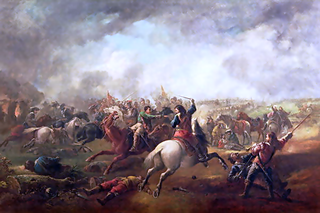
The First English Civil War took place in England and Wales from 1642 to 1646, and forms part of the 1639 to 1653 Wars of the Three Kingdoms. They include the Bishops' Wars, the Irish Confederate Wars, the Second English Civil War, the Anglo-Scottish war (1650–1652) and the 1649 to 1653 Cromwellian conquest of Ireland. Historians estimate that between 15% to 20% of all adult males in England and Wales served in the military between 1639 to 1653, while around 4% of the total population died from war-related causes. This compares to a figure of 2.23% for World War I, which illustrates the impact of the conflict on society in general and the bitterness it engendered.

Roundheads were the supporters of the Parliament of England during the English Civil War (1642–1651). Also known as Parliamentarians, they fought against King Charles I of England and his supporters, known as the Cavaliers or Royalists, who claimed rule by absolute monarchy and the principle of the divine right of kings. The goal of the Roundheads was to give to Parliament the supreme control over executive administration of the country/kingdom.

Sir William Waller was an English soldier and politician, who commanded Parliamentarian armies during the First English Civil War, before relinquishing his commission under the 1645 Self-denying Ordinance.

The Battle of Alton, of the First English Civil War, took place on 13 December 1643 in the town of Alton, Hampshire, England. There, Parliamentary forces serving under Sir William Waller led a successful surprise attack on a winter garrison of Royalist infantry and cavalry serving under the Earl of Crawford. The Battle of Alton was the first decisive defeat of Sir Ralph Hopton, leader of Royalist forces in the south, and the event had a significant psychological effect on him as commander. More important to Hopton was the loss of men, however, as he was already short-handed in much-needed infantry. The successful Parliamentarians were able, after their victory, to attack and successfully besiege Arundel, a larger and more formidable Royalist outpost to the south-east of Alton.

The term 'Cavalier' was first used by Roundheads as a term of abuse for the wealthier royalist supporters of King Charles I and his son Charles II of England during the English Civil War, the Interregnum, and the Restoration. It was later adopted by the Royalists themselves. Although it referred originally to political and social attitudes and behaviour, of which clothing was a very small part, it has subsequently become strongly identified with the fashionable clothing of the court at the time. Prince Rupert, commander of much of Charles I's cavalry, is often considered to be an archetypal Cavalier.
English Civil War: The Battle of Alton takes place in Hampshire.

The English Civil War (1642–1651) was a series of civil wars and political machinations between Parliamentarians ("Roundheads") and Royalists led by Charles I ("Cavaliers"), mainly over the manner of England's governance and issues of religious freedom. It was part of the wider Wars of the Three Kingdoms. The first (1642–1646) and second (1648–1649) wars pitted the supporters of King Charles I against the supporters of the Long Parliament, while the third (1649–1651) saw fighting between supporters of King Charles II and supporters of the Rump Parliament. The wars also involved the Scottish Covenanters and Irish Confederates. The war ended with Parliamentarian victory at the Battle of Worcester on 3 September 1651.

The Battle of Alton, of the First English Civil War, took place on 13 December 1643 in the town of Alton, Hampshire, England. There, Parliamentary forces serving under Sir William Waller led a successful surprise attack on a winter garrison of Royalist infantry and cavalry serving under the Earl of Crawford. The Battle of Alton was the first decisive defeat of Sir Ralph Hopton, leader of Royalist forces in the south, and the event had a significant psychological effect on him as commander. More important to Hopton was the loss of men, however, as he was already short-handed in much-needed infantry. The successful Parliamentarians were able, after their victory, to attack and successfully besiege Arundel, a larger and more formidable Royalist outpost to the south-east of Alton.
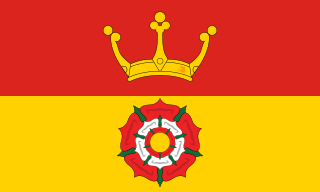
Hampshire is a ceremonial and non-metropolitan county in western South East England on the coast of the English Channel. Home to two major English cities on its south coast, Southampton and Portsmouth, Hampshire is the 9th-most populous county in England. The county town of Hampshire is Winchester, located in the north of the county. The county is bordered by Dorset to the south-west, Wiltshire to the north-west, Berkshire to the north, Surrey to the north-east, and West Sussex to the south east. The county is geographically diverse, with upland rising to 286 m (938 ft) and mostly south-flowing rivers. There are areas of downland and marsh, and two national parks: the New Forest and part of the South Downs, which together cover 45 per cent of Hampshire.
Abel Tasman is the first recorded European to sight New Zealand.
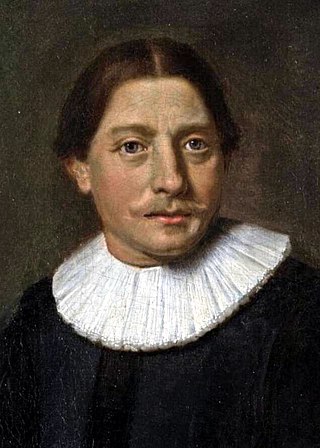
Abel Janszoon Tasman was a Dutch seafarer, explorer, and merchant, best known for his voyages of 1642 and 1644 in the service of the Dutch East India Company (VOC). He was the first known European explorer to reach New Zealand and the islands of Fiji and Van Diemen's Land.

New Zealand is an island country in the southwestern Pacific Ocean. It consists of two main landmasses—the North Island and the South Island —and over 700 smaller islands. It is the sixth-largest island country by area, covering 268,021 square kilometres (103,500 sq mi). New Zealand is about 2,000 kilometres (1,200 mi) east of Australia across the Tasman Sea and 1,000 kilometres (600 mi) south of the islands of New Caledonia, Fiji, and Tonga. The country's varied topography and sharp mountain peaks, including the Southern Alps, owe much to tectonic uplift and volcanic eruptions. New Zealand's capital city is Wellington, and its most populous city is Auckland.
The Massachusetts Bay Colony organizes three militia regiments to defend the colony against the Pequot Indians, a date now considered the founding of the National Guard of the United States.

The Massachusetts Bay Colony (1630–1691), more formally the Colony of Massachusetts Bay, was an English settlement on the east coast of North America around the Massachusetts Bay, the northernmost of the several colonies later reorganized as the Province of Massachusetts Bay. The lands of the settlement were in southern New England, with initial settlements on two natural harbors and surrounding land about 15.4 miles (24.8 km) apart—the areas around Salem and Boston, north of the previously established Plymouth Colony. The territory nominally administered by the Massachusetts Bay Colony covered much of central New England, including portions of Massachusetts, Maine, New Hampshire, and Connecticut.

A militia is generally an army or some other fighting organization of non-professional soldiers, citizens of a country, or subjects of a state, who may perform military service during a time of need, as opposed to a professional force of regular, full-time military personnel; or, historically, to members of a warrior-nobility class. Generally unable to hold ground against regular forces, militias commonly support regular troops by skirmishing, holding fortifications, or conducting irregular warfare, instead of undertaking offensive campaigns by themselves. Local civilian laws often limit militias to serve only in their home region, and to serve only for a limited time; this further reduces their use in long military campaigns.
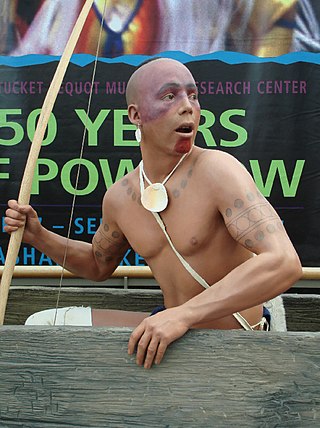
The Pequot are a Native American people of Connecticut. The modern Pequot are members of the federally recognized Mashantucket Pequot Tribe, four other state-recognized groups in Connecticut including the Eastern Pequot Tribal Nation, or the Brothertown Indians of Wisconsin. They historically spoke Pequot, a dialect of the Mohegan-Pequot language, which became extinct by the early 20th century. Some tribal members are undertaking revival efforts.

Native Americans, also known as American Indians, First Americans, Indigenous Americans, and other terms, are the Indigenous peoples of the mainland United States. There are 574 federally recognized tribes living within the US, about half of which are associated with Indian reservations. As defined by the United States Census, "Native Americans" are Indigenous tribes that are originally from the contiguous United States, along with Alaska Natives. Indigenous peoples of the United States who are not listed as American Indian or Alaska Native include Native Hawaiians, Samoan Americans, and the Chamorro people. The US Census groups these peoples as "Native Hawaiian and other Pacific Islanders".

The National Guard is a state-based military force that becomes part of the reserve components of the United States Army and the United States Air Force when activated for federal missions. It is a military reserve force composed of National Guard military members or units of each state and the territories of Guam, the Virgin Islands, Puerto Rico, and the District of Columbia, for a total of 54 separate organizations. It is officially created under Congress's Article 1 Section 8 ability to 'raise and support armies'. All members of the National Guard are also members of the organized militia of the United States as defined by 10 U.S.C. § 246. National Guard units are under the dual control of the state governments and the federal government.
The Plymouth Colony establishes the system of trial by 12-men jury in the American colonies.

Plymouth Colony was, from 1620 to 1691, the first permanent English colony in New England and the second permanent English colony in North America, after the Jamestown Colony. It was first settled by the passengers on the Mayflower, at a location that had previously been surveyed and named by Captain John Smith. The settlement served as the capital of the colony and developed as the town of Plymouth, Massachusetts. At its height, Plymouth Colony occupied most of the southeastern portion of Massachusetts. Many of the people and events surrounding Plymouth Colony have become part of American folklore, including the American tradition of Thanksgiving and the monument of Plymouth Rock.

A jury trial, or trial by jury, is a legal proceeding in which a jury makes a decision or findings of fact. It is distinguished from a bench trial in which a judge or panel of judges makes all decisions.
Sir Francis Drake sets sail from Plymouth, England, on his round-the-world voyage.

Sir Francis Drake was an English explorer, sea captain, privateer, slave trader, naval officer, and politician. Drake is best known for his circumnavigation of the world in a single expedition, from 1577 to 1580. This included his incursion into the Pacific Ocean, until then an area of exclusive Spanish interest, and his claim to New Albion for England, an area in what is now the U.S. state of California. His expedition inaugurated an era of conflict with the Spanish on the western coast of the Americas, an area that had previously been largely unexplored by Western shipping.

Plymouth is a port city and unitary authority in South West England. It is located on the south coast of Devon, approximately 36 miles (58 km) south-west of Exeter and 193 miles (311 km) south-west of London. It is bordered by Cornwall to the west and south-west.

Francis Drake's circumnavigation, also known as Drake's Raiding Expedition, was an important historical maritime event that took place between 15 December 1577 and 26 September 1580. Authorised by Queen Elizabeth I and led by Francis Drake; the latter sailed with five ships in what was termed a 'voyage of discovery', although in effect it was an ambitious covert raiding voyage and the start of England's challenge to the global domination of Spain and Portugal.
The Council of Trent begins as the embodiment of the Counter-Reformation.

The Council of Trent, held between 1545 and 1563 in Trent, was the 19th ecumenical council of the Catholic Church. Prompted by the Protestant Reformation, it has been described as the embodiment of the Counter-Reformation.

The Counter-Reformation, also called the Catholic Reformation or the Catholic Revival, was the period of Catholic resurgence that was initiated in response to the Protestant Reformation. It began with the Council of Trent (1545–1563) and largely ended with the conclusion of the European wars of religion in 1648. Initiated to address the effects of the Protestant Reformation, the Counter-Reformation was a comprehensive effort composed of apologetic and polemical documents and ecclesiastical configuration as decreed by the Council of Trent. The last of these included the efforts of Imperial Diets of the Holy Roman Empire, heresy trials and the Inquisition, anti-corruption efforts, spiritual movements, and the founding of new religious orders. Such policies had long-lasting effects in European history with exiles of Protestants continuing until the 1781 Patent of Toleration, although smaller expulsions took place in the 19th century.
Saint Celestine V resigns the papacy after only five months to return to his previous life as an ascetic hermit.
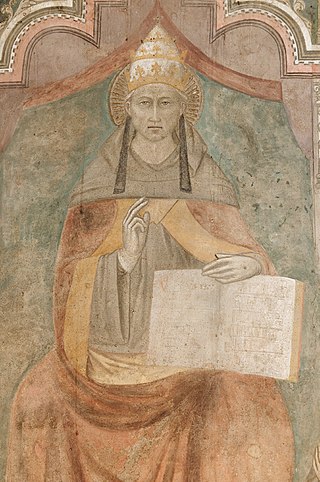
Pope Celestine V, born Pietro Angelerio, also known as Pietro da Morrone, Peter of Morrone, and Peter Celestine, was head of the Catholic Church and ruler of the Papal States for five months from 5 July to 13 December 1294, when he resigned. He was also a monk and hermit who founded the order of the Celestines as a branch of the Benedictine order.
A papal renunciation also called a papal abdication, occurs when the reigning pope of the Catholic Church voluntarily steps down from his position. As the reign of the pope has conventionally been from election until death, papal renunciation is an uncommon event. Before the 21st century, only five popes unambiguously resigned with historical certainty, all between the 10th and 15th centuries. Additionally, there are disputed claims of four popes having resigned, dating from the 3rd to the 11th centuries; a fifth disputed case may have involved an antipope.

The pope, also known as supreme pontiff, Roman pontiff or sovereign pontiff, is the bishop of Rome, head of the worldwide Catholic Church, and has also served as the head of state or sovereign of the Papal States and later the Vatican City State since the eighth century. From a Catholic viewpoint, the primacy of the bishop of Rome is largely derived from his role as the apostolic successor to Saint Peter, to whom primacy was conferred by Jesus, who gave Peter the Keys of Heaven and the powers of "binding and loosing", naming him as the "rock" upon which the Church would be built. The current pope is Francis, who was elected on 13 March 2013.

Asceticism is a lifestyle characterized by abstinence from sensual pleasures, often for the purpose of pursuing spiritual goals. Ascetics may withdraw from the world for their practices or continue to be part of their society, but typically adopt a frugal lifestyle, characterised by the renunciation of material possessions and physical pleasures, and also spend time fasting while concentrating on the practice of religion or reflection upon spiritual matters. Various individuals have also attempted an ascetic lifestyle to free themselves from addictions, some of them particular to modern life, such as money, alcohol, tobacco, drugs, entertainment, sex, food, etc.
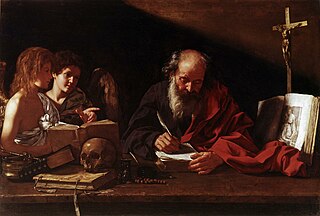
A hermit, also known as an eremite or solitary, is a person who lives in seclusion. Eremitism plays a role in a variety of religions.
Noah Klieger, Holocaust survivor who became an award-winning Israeli journalist (b. 1926) deaths

Noah Klieger was an Israeli journalist and sports administrator. Klieger, a survivor of the Nazi concentration camps Auschwitz, Mittelbau-Dora and Ravensbruck, covered trials of Nazi criminals after the end of World War II, besides working as a sports journalist in Israel. He also was the president of the basketball club Maccabi Tel Aviv and chairman of the FIBA's media council. In 2010 he was awarded the FIBA Order of Merit, and in 2012 became a Chevalier of the Légion d'honneur. In 2015, Klieger was inducted into the FIBA Hall of Fame for his contributions.

The Holocaust, also known as the Shoah, was the genocide of European Jews during World War II. Between 1941 and 1945, Nazi Germany and its collaborators systematically murdered some six million Jews across German-occupied Europe; around two-thirds of Europe's Jewish population. The murders were carried out in pogroms and mass shootings; by a policy of extermination through labor in concentration camps; and in gas chambers and gas vans in German extermination camps, chiefly Auschwitz-Birkenau, Bełżec, Chełmno, Majdanek, Sobibór, and Treblinka in occupied Poland.

A journalist is an individual that collects/gathers information in form of text, audio, or pictures, processes them into a news-worthy form, and disseminates it to the public. The act or process mainly done by the journalist is called journalism.
Alan Thicke, Canadian actor, songwriter, game and talk-show host (b. 1947) deaths

Alan Thicke was a Canadian actor, songwriter, and game and talk show host. He is the father of singer Robin Thicke. In 2013, Thicke was inducted into Canada's Walk of Fame. Thicke was best known for playing Dr. Jason Seaver on the 1980s sitcom Growing Pains on ABC.
Lamar Hunt, American businessman, co-founded the American Football League and World Championship Tennis (b. 1932) deaths

Lamar Hunt was an American businessman most notable for his promotion of American football, soccer, and tennis in the United States.

The American Football League (AFL) was a major professional American football league that operated for ten seasons from 1960 until 1970, when it merged with the older National Football League (NFL), and became the American Football Conference. The upstart AFL operated in direct competition with the more established NFL throughout its existence. It was more successful than earlier rivals to the NFL with the same name, the 1926, 1936 and 1940 leagues, and the later All-America Football Conference.
World Championship Tennis (WCT) was a tour for professional male tennis players established in 1968 and lasted until the emergence of the ATP Tour in 1990. A number of tennis tournaments around the world were affiliated with WCT and players were ranked in a special WCT ranking according to their results in those tournaments.
Alan Shields, American painter and ferryboat captain (b. 1944) deaths

Alan J. Shields was born in Herington, Kansas. He had a long career as a painter, and for a time during the 1980s, had a secondary career as a commercial boat operator, including as ferryboat captain.
David Wheeler, English computer scientist and academic (b. 1927) deaths
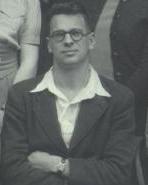
David John Wheeler FRS was a computer scientist and professor of computer science at the University of Cambridge.
Zal Yanovsky, Canadian singer-songwriter and guitarist who founded The Lovin' Spoonful (b. 1944) deaths

Zalman Yanovsky was a Canadian folk-rock musician. Born in Toronto, he was the son of political cartoonist Avrom Yanovsky and teacher Nechama Yanovsky, who died in 1958. He played lead guitar and sang for the Lovin' Spoonful, a rock band which he founded with John Sebastian in 1964. He was inducted into the Canadian Music Hall of Fame in 1996. He was also inducted into the Rock and Roll Hall of Fame in 2000 as a member of the Lovin’ Spoonful. He was married to actress Jackie Burroughs, with whom he had one daughter, Zoe.

The Lovin' Spoonful is an American rock band popular during the mid- to late-1960s. Founded in New York City in 1965 by lead singer/songwriter John Sebastian and guitarist Zal Yanovsky, the band is widely known for a number of hits, including "Summer in the City", "Do You Believe In Magic", "Did You Ever Have to Make Up Your Mind?", and "Daydream".
Simona Waltert, Swiss tennis player births

Simona Waltert is a Swiss tennis player.
Marina Bassols Ribera, Spanish tennis player births
Marina Bassols Ribera is a Spanish tennis player.
Lew Grade, Ukrainian-born British impresario and media proprietor (b. 1906) deaths
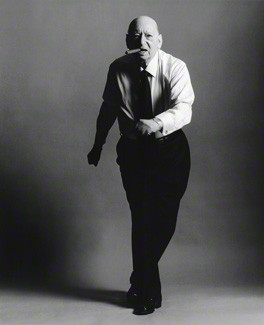
Lew Grade, Baron Grade, was a British media proprietor and impresario. Originally a dancer, and later a talent agent, Grade's interest in television production began in 1954 when, in partnership, he successfully bid for franchises in the newly created ITV network, which led to the creation of Associated Television (ATV). Having worked for a time in the United States, he was aware of the potential for the sale of television programming to American networks. The Incorporated Television Company was formed with this specific objective in mind. Grade had some success in this field with such series as Gerry Anderson's many Supermarionation series such as Thunderbirds, Patrick McGoohan's The Prisoner, and Jim Henson's The Muppet Show. Later, Grade invested in feature film production, but several expensive box-office failures caused him to lose control of ITC, and ultimately resulted in the disestablishment of ATV after it lost its ITV franchise.
Richard Thomas, Royal Naval Officer (b. 1922) deaths
Admiral Sir William Richard Scott Thomas was the Gentleman Usher of the Black Rod in the British Parliament's House of Lords from January 1992 to 8 May 1995.
Wade Watts, civil rights activist (b. 1919) deaths
Wade Watts was an American gospel preacher and civil rights activist from Oklahoma. He served as the state president of the Oklahoma chapter of the NAACP for sixteen years, challenging the Ku Klux Klan through Christian love doctrine. He worked with Thurgood Marshall and developed a friendship with Martin Luther King Jr. during the American civil rights movement, and has been cited as a mentor by the current leader of the NAACP in Oklahoma, Miller Newman, and his nephew, former congressman, J. C. Watts.
Don E. Fehrenbacher, American historian, author, and academic (b. 1920) deaths

Don Edward Fehrenbacher was an American historian. He wrote on politics, slavery, and Abraham Lincoln. He won the 1979 Pulitzer Prize for History for The Dred Scott Case: Its Significance in American Law and Politics, his book about the Dred Scott Decision. In 1977 David M. Potter's The Impending Crisis, 1848-1861, which he edited and completed, won the Pulitzer Prize. In 1997 he won the Lincoln Prize.
Edward Blishen, English author and educator (b. 1920) deaths
Edward Blishen was an English author and broadcaster. He may be known best for the first of two children's novels based on Greek mythology, written with Leon Garfield, illustrated by Charles Keeping, and published by Longman in 1970. For The God Beneath the Sea Blishen and Garfield won the 1970 Carnegie Medal from the Library Association, recognising the year's best children's book by a British subject.
Emma Corrin, English actor births

Emma-Louise Corrin is an English actor. They portrayed Diana, Princess of Wales in the fourth season of the Netflix historical drama The Crown (2020), for which they won a Golden Globe, a Critics' Choice Award, and were nominated for a Primetime Emmy Award.
Ann Nolan Clark, American author and educator (b. 1896) deaths
Ann Nolan Clark, born Anna Marie Nolan, was an American writer who won the 1953 Newbery Medal.
Danielle Collins, American tennis player births

Danielle Rose Collins is an American professional tennis player. She has reached career-high WTA rankings of No. 7 in singles and world No. 86 in doubles. Collins has won two WTA Tour singles titles, at the 2021 Palermo Open and the 2021 Silicon Valley Classic. She reached her first major singles final at the 2022 Australian Open.
Vanessa Duriès, French author (b. 1972) deaths
Vanessa Duriès, also known as Katia Lamara, was a French novelist.
K. C. Irving, Canadian businessman (b. 1899) deaths
Kenneth Colin Irving, was a Canadian businessman whose business began with a family sawmill in Bouctouche, N.B., in 1882. In 1989, he was made an Officer of the Order of Canada.
Cornelius Vanderbilt Whitney, American businessman and philanthropist (b. 1899) deaths

Cornelius "Sonny" Vanderbilt Whitney was an American businessman, film producer, government official, writer and philanthropist. He was also a polo player and the owner of a significant stable of Thoroughbred racehorses.
Dave Leduc, Lethwei World Champion births

Dave Leduc is a Canadian Lethwei fighter who competes in the World Lethwei Championship, where he is the former WLC Cruiserweight World Champion. He is also the undefeated Openweight Lethwei World Champion under traditional rules. Leduc gained widespread notoriety by becoming the first Canadian to win in the controversial Prison Fight. In 2016, he travelled to Myanmar to achieve his dream of fighting Burmese bareknuckle boxing, considered the world's most brutal sport. Leduc challenged and defeated Tun Tun Min, who was then recognized as the best in the world and became the first non-Burmese to win a Lethwei Golden Belt. The same year, he married Moldovan writer and model Irina Terehova in a nationally televised traditional Burmese wedding ceremony in Yangon with approximately 30 million viewers in Myanmar.

Lethwei or Burmese boxing, is a full contact combat sport from Myanmar that uses stand-up striking including headbutts. Lethwei is considered to be one of the most brutal martial arts in the world, as the sport is practiced bareknuckle with only tape and gauze while fighters are allowed to strike with their fists, elbows, knees, and feet, and the use of headbutts is also permitted. Disallowed in most combat sports, headbutts are important weapons in a Lethwei fighter's arsenal, giving Lethwei its name of The Art of 9 Limbs, and deemed one of the bloodiest martial arts. A vast majority of Lethwei fighters originate from the Karen ethnicity.
Fletcher Cox, American football player births

Fletcher Cox is an American football defensive tackle for the Philadelphia Eagles of the National Football League (NFL). He played college football at Mississippi State, and was drafted by the Eagles in the first round of the 2012 NFL Draft. Cox is a Super Bowl champion and has been selected to the Pro Bowl six times.
Arantxa Rus, Dutch tennis player births

Arantxa Rus is a Dutch tennis player. In 2008, she won the girl's singles title at the Australian Open, defeating Jessica Moore from Australia in the final. With this win she went from 35th to second place on the junior rankings, ultimately becoming the world No. 1 junior player.
Hellen Obiri, Kenyan runner; twice world champion in the 5000 metres event births

Hellen Onsando Obiri is a Kenyan middle- and long-distance runner. She is a two-time Olympic 5000 metres silver medallist from the 2016 Rio and 2020 Tokyo Olympics, where she also placed fourth over the 10,000 metres. She is a two-time world champion after winning the 5000m in 2017 and again in 2019, when she set a new championship record. Obiri also took bronze for the 1500 metres in 2013 and silver in the 10,000m in 2022. She won the 3000 metres race at the 2012 World Indoor Championships, claimed silver in 2014, and placed fourth in 2018. She holds the Kenyan national records for the mile, 3000 metres both out and indoors, and 5000 metres events.
The World Athletics Championships are a biennial athletics competition organized by World Athletics. Alongside the Olympic Games, they represent the highest level championships of senior international outdoor athletics competition for track and field athletics globally, including marathon running and race walking. Separate World Championships are held by World Athletics for certain other outdoor events, including cross-country running and half-marathon, as well as indoor and age-group championships.

The 5000 metres or 5000-metre run is a common long-distance running event in track and field, approximately equivalent to 3 miles 188 yards or 16,404 feet 2 inches. It is one of the track events in the Olympic Games and the World Championships in Athletics, run over 12+1⁄2 laps of a standard track. The same distance in road running is called a 5K run; referring to the distance in metres rather than kilometres serves to disambiguate the two events. The 5000 m has been present on the Olympic programme since 1912 for men and since 1996 for women. Prior to 1996, women had competed in an Olympic 3000 metres race since 1984. The 5000 m has been held at each of the World Championships in Athletics in men's competition and since 1995 in women's.
Katherine Schwarzenegger, American author births

Katherine Schwarzenegger Pratt is an American author. She has written three self-help books, on subjects like self-image, forgiveness and finding direction after college; she has also written a children’s book about adopting her dog. Schwarzenegger is the eldest child of Arnold Schwarzenegger and Maria Shriver. She is married to actor Chris Pratt, with whom she has two daughters.
Taylor Swift, American singer-songwriter births

Taylor Alison Swift is an American singer-songwriter. Her discography spans multiple genres, and her narrative songwriting—often inspired by her personal life—has received critical praise and media coverage. Born in West Reading, Pennsylvania, Swift moved to Nashville at age 14 to become a country artist. She signed a songwriting deal with Sony/ATV Music Publishing in 2004 and a recording contract with Big Machine Records in 2005. Her 2006 self-titled debut album made her the first female country singer to write or co-write a U.S. platinum-certified album entirely.
Rickie Fowler, American Ryder Cup golfer on the PGA Tour; three-time runner-up in major tournaments births

Rick Yutaka Fowler is an American professional golfer who plays on the PGA Tour. He was the number one ranked amateur golfer in the world for 36 weeks in 2007 and 2008. On January 24, 2016 he reached a career high fourth in the Official World Golf Ranking following his victory in the Abu Dhabi HSBC Golf Championship.

The Ryder Cup is a biennial men's golf competition between teams from Europe and the United States. The competition is contested every two years with the venue alternating between courses in the United States and Europe. The Ryder Cup is named after the English businessman Samuel Ryder who donated the trophy. The event is jointly administered by the PGA of America and Ryder Cup Europe, the latter a joint venture of the PGA European Tour (60%), the PGA of Great Britain and Ireland (20%), and the PGAs of Europe (20%).

The PGA Tour is the organizer of professional golf tours in the United States and North America. It organizes most of the events on the flagship annual series of tournaments also known as the PGA Tour, as well as PGA Tour Champions and the Korn Ferry Tour, as well as PGA Tour Canada, PGA Tour Latinoamérica, and PGA Tour China. The PGA Tour is a nonprofit organization headquartered in Ponte Vedra Beach, Florida, a suburb southeast of Jacksonville. Originally established by the Professional Golfers' Association of America, it was spun off in December 1968 into a separate organization for tour players, as opposed to club professionals, the focal members of today's PGA of America. Originally the "Tournament Players Division", it adopted the name "PGA Tour" in 1975 and runs most of the week-to-week professional golf events on the tournament known as the PGA Tour, including The Players Championship, hosted at TPC Sawgrass; the FedEx Cup, with its finale at The Tour Championship at East Lake Golf Club; and the biennial Presidents Cup. The remaining events on the PGA Tour are run by different organizations, as are the U.S.-based LPGA Tour for women and other men's and women's professional tours around the world.
Heather Angel, British-American actress (b. 1909) deaths

Heather Grace Angel was a British actress. She has been known for providing the voice of Mrs. Darling, Wendy's mother in Peter Pan (1953) and Alice's sister in Alice in Wonderland (1951).
Ella Baker, American activist (b. 1903) deaths

Ella Josephine Baker was an African-American civil rights and human rights activist. She was a largely behind-the-scenes organizer whose career spanned more than five decades. In New York City and the South, she worked alongside some of the most noted civil rights leaders of the 20th century, including W. E. B. Du Bois, Thurgood Marshall, A. Philip Randolph, and Martin Luther King Jr. She also mentored many emerging activists, such as Diane Nash, Stokely Carmichael, and Bob Moses, as leaders in the Student Nonviolent Coordinating Committee (SNCC).
Smita Patil, Indian actress and journalist (b. 1955) deaths

Smita Patil was an Indian actress of film, television and theatre. Smita Patil appeared in over 80 Hindi, Bengali, Marathi, Gujarati, Malayalam and Kannada films in a career that spanned just over a decade. During her career, she received two National Film Awards and a Filmfare Award. She was the recipient of the Padma Shri, India's fourth-highest civilian honour in 1985. She made her film debut with Shyam Benegal's Charandas Chor (1975). She became one of the leading actresses of parallel cinema, a New Wave movement in India cinema, though she also appeared in several mainstream movies throughout her career. Her performances were often acclaimed, and her most notable roles include Manthan (1977), Bhumika (1977), Jait Re Jait (1978), Aakrosh (1980), Chakra (1981), Namak Halaal (1982), Bazaar (1982), Umbartha (1982), Shakti (1982), Arth (1982), Ardh Satya (1983), Mandi (1983), Aaj Ki Awaaz (1984), Chidambaram (1985), Mirch Masala (1985), Amrit (1986) and Waaris (1988).
Santi Cazorla, Spanish international footballer births

Santiago "Santi" Cazorla González is a Spanish professional footballer. A former Spanish international, Cazorla operated primarily as an attacking midfielder, but also played as a winger, central midfielder or as a deep-lying playmaker.
Hanna-Maria Seppälä, Finnish freestyle swimmer; 2003 world champion in the 100 m freestyle births

Hanna-Maria Hintsa is a Finnish freestyle swimmer, who won the world title in the 100 m freestyle at the 2003 World Aquatics Championships in Barcelona, Spain.

Freestyle is a category of swimming competition, defined by the rules of the International Swimming Federation (FINA), in which competitors are subject to a few limited restrictions on their swimming stroke. Freestyle races are the most common of all swimming competitions, with distances beginning with 50 meters and reaching 1500 meters, also known as the mile. The term 'freestyle stroke' is sometimes used as a synonym for 'front crawl', as front crawl is the fastest surface swimming stroke. It is now the most common stroke used in freestyle competitions.
The 10th FINA World Aquatics Championships were held July 12–27, 2003 in Barcelona, Spain. The championships featured competition in all 5 of FINA's disciplines: Swimming, Diving, Synchronised swimming, Water Polo, and Open Water Swimming.
Alexander Schmemann, Estonian-American priest and theologian (b. 1921) deaths

Alexander Dmitrievich Schmemann was an influential Orthodox priest, theologian, and author who had most of his career in the United States.
Nichita Stănescu, Romanian poet and critic (b. 1933) deaths
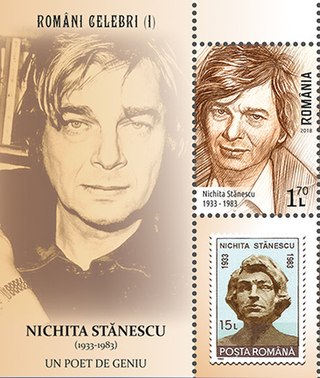
Nichita Stănescu was a Romanian poet and essayist.
Amy Lee, American singer, songwriter and pianist; co-founder and lead vocalist of Evanescence births

Amy Lynn Hartzler is an American singer-songwriter and musician. She is the co-founder, lead vocalist, and principal member of the rock band Evanescence. Alongside her contributions with the band, Lee has also participated on other musical projects, including Nightmare Revisited and Muppets: The Green Album, composed the soundtrack to the films War Story (2014) and Indigo Grey: The Passage (2015) with cellist Dave Eggar, and the song "Speak to Me" for the film Voice from the Stone (2017). She has also collaborated with other artists such as Korn, Seether, Bring Me the Horizon, and Lindsey Stirling. A classically trained pianist, Lee possesses a mezzo-soprano vocal range.

Evanescence is an American rock band founded in Little Rock, Arkansas in 1995 by singer and musician Amy Lee and guitarist Ben Moody. After recording independent EPs as a duo in the late 90's, and a demo CD, Evanescence released their debut studio album, Fallen, on Wind-up Records in 2003. Propelled by the success of hit singles "Bring Me to Life" and "My Immortal", Fallen sold more than four million copies in the US by January 2004, garnering the band two Grammy Awards out of six nominations. A year later, the band released their first live album and concert DVD, Anywhere but Home, which sold over one million copies worldwide.
Jon Hall, American actor and director (b. 1915) deaths

Jon Hall was an American film actor known for playing a variety of adventurous roles, as in 1937's The Hurricane, and later when contracted to Universal Pictures, including Invisible Agent and The Invisible Man's Revenge and six films he made with Maria Montez. He was also known to 1950s fans as the creator and star of the Ramar of the Jungle television series which ran from 1952 to 1954. Hall directed and starred in two 1960s sci-fi films in his later years, The Beach Girls and the Monster (1965) and The Navy vs. the Night Monsters (1966).
Behçet Necatigil, Turkish author, poet and translator (b. 1916) deaths

Behçet Necatigil was a leading Turkish author, poet and translator.
Oguz Atay, Turkish engineer and author (b. 1934) deaths

Oğuz Atay was a pioneer of the modern novel in Turkey. His first novel, Tutunamayanlar, appeared in 1971–72. Never reprinted in his lifetime and controversial among critics, it has become a best-seller since a new edition came out in 1984. It has been described as “probably the most eminent novel of twentieth-century Turkish literature”: this reference is due to a UNESCO survey, which goes on: “it poses an earnest challenge to even the most skilled translator with its kaleidoscope of colloquialisms and sheer size.” In fact four translations have so far been published: into Dutch, as Het leven in stukken, translated by Hanneke van der Heijden and Margreet Dorleijn ; into German, as Die Haltlosen, translated by Johannes Neuner ; into English, as The Disconnected, translated by Sevin Seydi : an excerpt from this won the Dryden Translation Prize in 2008 ; into Greek, as ΑΠΟΣΥΝΑΓΩΓΟΙ, translated from Turkish by Νίκη Σταυρίδη, poetry sections by Δημήτρης Μαύρος, Gutenberg Editio Minor 34, 2022. ISBN 978-960-01-2397-5.
Tom DeLonge, American singer-songwriter, guitarist, author, and filmmaker births
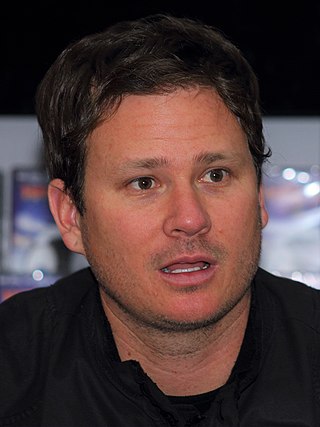
Thomas Matthew DeLonge is an American musician, singer, songwriter, author, filmmaker, and actor. Possessing a distinctive nasal singing voice, he is a co-founder of the rock band Blink-182 and has been the guitarist and co-lead vocalist across three stints: 1992 to 2005, 2009 to 2015, and from 2022 onwards. He is also the lead vocalist and guitarist of the rock band Angels & Airwaves, which he formed in 2005 after his first departure from Blink-182.
Cyril Delevanti, English-American actor (b. 1889) deaths

Harry Cyril Delevanti was an English character actor with a long career in American films. He was sometimes credited as Syril Delevanti.
Yakup Kadri Karaosmanoglu, Egyptian-Turkish journalist, author, and politician (b. 1889) deaths
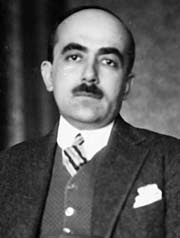
Yakup Kadri Karaosmanoğlu was a Turkish novelist, journalist, diplomat, and member of parliament.
Henry Green, English author (b. 1905) deaths

Henry Green was the pen name of Henry Vincent Yorke, an English writer best remembered for the novels Party Going, Living and Loving. He published a total of nine novels between 1926 and 1952.
Raymond A. Spruance, American admiral and diplomat, United States Ambassador to the Philippines (b. 1886) deaths

Raymond Ames Spruance was a United States Navy admiral during World War II. He commanded U.S. naval forces during one of the most significant naval battles that took place in the Pacific Theatre: the Battle of the Philippine Sea. He also commanded Task Force 16 at the Battle of Midway, comprising the carriers Enterprise and Hornet. At Midway, dive bombers from the Enterprise crippled two carriers of the Imperial Japanese Navy, Kaga and the flagship Akagi. Most historians consider Midway the turning point of the Pacific War.

The ambassador of the United States of America to the Republic of the Philippines was established on July 4, 1946, after the Philippines gained its independence from the United States.
Jamie Foxx, American actor, singer, songwriter, producer, and comedian births

Eric Marlon Bishop, known professionally as Jamie Foxx, is an American actor, comedian, and singer. He became widely known for his portrayal of Ray Charles in the 2004 biographical film Ray, for which he won the Academy Award, BAFTA, Screen Actors Guild Award, Critics' Choice Movie Award and Golden Globe Award for Best Actor. That same year, he was nominated for the Academy Award for Best Supporting Actor for his role in the crime film Collateral. Since 2017, Foxx has served as the host and executive producer of the Fox game show Beat Shazam.
Krišjānis Kariņš, American- born Latvian politician, 23rd Prime Minister of Latvia births

Arturs Krišjānis Kariņš is an American-Latvian politician who has served as the Prime Minister of Latvia since 2019. A linguist and businessperson by profession, he previously served as Latvia's Minister of Economics and a Member of the European Parliament. Born in Wilmington, Delaware, United States, to parents who had left Latvia during the Soviet occupation, he was active in the American Latvian community throughout his youth.

The prime minister of Latvia is the most powerful member of the Government of Latvia, who presides over the Latvian Cabinet of Ministers. The officeholder is nominated by the president of Latvia, but must be able to obtain the support of a parliamentary majority in the Saeima.
Harry Barris, American singer-songwriter and pianist (b. 1905) deaths

Harry Barris was an American popular singer and songwriter. He was one of the earliest singers to use "scat singing" in recordings. Barris, one of Paul Whiteman's Rhythm Boys, along with Bing Crosby and Al Rinker, scatted on several songs, including "Mississippi Mud," which Barris wrote in 1927.
Grandma Moses, American painter (b. 1860) deaths

Anna Mary Robertson Moses, or Grandma Moses, was an American folk artist. She began painting in earnest at the age of 78 and is a prominent example of a newly successful art career at an advanced age. Her works have been shown and sold worldwide, including in museums, and have been merchandised such as on greeting cards. Sugaring Off was sold for US$1.2 million in 2006.
Richard Dent, American pro football player (NFL); MVP of Super Bowl XX; elected to Hall of Fame in 2011 births

Richard Lamar Dent is an American former professional football player who was a defensive end in the National Football League (NFL), primarily for the Chicago Bears. He was the MVP of Super Bowl XX. He was elected to the Pro Football Hall of Fame in 2011.

Super Bowl XX was an American football game between the National Football Conference (NFC) champion Chicago Bears and the American Football Conference (AFC) champion New England Patriots to decide the National Football League (NFL) champion for the 1985 season. The Bears defeated the Patriots by the score of 46–10, capturing their first NFL championship since 1963, three years prior to the birth of the Super Bowl. Super Bowl XX was played on January 26, 1986 at the Louisiana Superdome in New Orleans.

The Pro Football Hall of Fame is the hall of fame for professional American football, located in Canton, Ohio. Opened on September 7, 1963, the Hall of Fame enshrines exceptional figures in the sport of professional football, including players, coaches, officials, franchise owners, and front-office personnel, almost all of whom made their primary contributions to the game in the National Football League (NFL).
Dora Marsden, English author and activist (b. 1882) deaths

Dora Marsden was an English suffragette, editor of literary journals, and philosopher of language. Beginning her career as an activist in the Women's Social and Political Union, Marsden eventually broke off from the suffragist organization in order to found a journal that would provide a space for more radical voices in the movement. Her prime importance lies with her contributions to the suffrage movement, her criticism of the Pankhursts' WSPU, and her radical feminism, via The Freewoman. There are those who also claim she has relevance to the emergence of literary modernism, while others value her contribution to the understanding of Egoism.
Steve Buscemi, American actor and director births

Steven Vincent Buscemi is an American actor and filmmaker. He is known for his roles in Quentin Tarantino's Reservoir Dogs (1992), Robert Rodriguez's Desperado (1995), Simon West's Con Air (1997), Michael Bay's Armageddon (1998), the dark comedy Ghost World (2001), Tim Burton's drama Big Fish (2003), and Armando Iannucci's political satire The Death of Stalin (2017). Buscemi is also known for his many collaborations with the Coen brothers, having appeared in six of their films: Miller's Crossing (1990), Barton Fink (1991), The Hudsucker Proxy (1994), Fargo (1996), The Big Lebowski (1998), and Paris, je t'aime (2006).
Morris Day, American musician and actor births

Morris E. Day is an American musician, songwriter, and actor. He is best known as the lead singer of The Time.
Egas Moniz, Portuguese psychiatrist and neurosurgeon, Nobel Prize laureate (b. 1874) deaths

António Caetano de Abreu Freire Egas Moniz, known as Egas Moniz, was a Portuguese neurologist and the developer of cerebral angiography. He is regarded as one of the founders of modern psychosurgery, having developed the surgical procedure leucotomy—better known today as lobotomy—for which he became the first Portuguese national to receive a Nobel Prize in 1949.

The Nobel Prize in Physiology or Medicine is awarded yearly by the Nobel Assembly at the Karolinska Institute for outstanding discoveries in physiology or medicine. The Nobel Prize is not a single prize, but five separate prizes that, according to Alfred Nobel's 1895 will, are awarded "to those who, during the preceding year, have conferred the greatest benefit to humankind". Nobel Prizes are awarded in the fields of Physics, Chemistry, Physiology or Medicine, Literature, and Peace.
John Raymond Hubbell, American director and composer (b. 1879) deaths
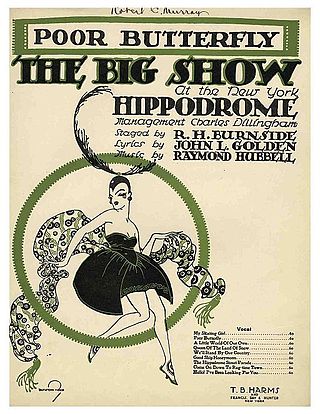
John Raymond Hubbell was an American writer, composer and lyricist. He is best known for the popular song, "Poor Butterfly".
Ben Bernanke, American economist births
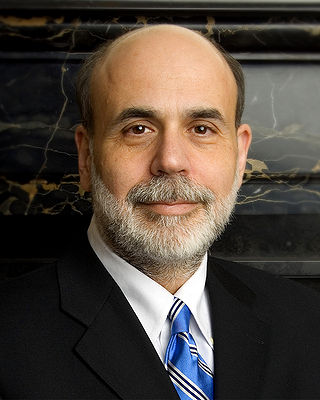
Ben Shalom Bernanke is an American economist who served as the 14th chairman of the Federal Reserve from 2006 to 2014. After leaving the Fed, he was appointed a distinguished fellow at the Brookings Institution. During his tenure as chairman, Bernanke oversaw the Federal Reserve's response to the late-2000s financial crisis, for which he was named the 2009 Time Person of the Year. Before becoming Federal Reserve chairman, Bernanke was a tenured professor at Princeton University and chaired the department of economics there from 1996 to September 2002, when he went on public service leave. Bernanke was awarded the 2022 Nobel Memorial Prize in Economic Sciences, jointly with Douglas Diamond and Philip H. Dybvig, "for research on banks and financial crises", more specifically for his analysis of the Great Depression.
Abraham Wald, Hungarian mathematician and academic (b. 1902) deaths

Abraham Wald was a Jewish Hungarian mathematician who contributed to decision theory, geometry, and econometrics and founded the field of statistical sequential analysis. One of his well-known statistical works was written during World War II on how to minimize the damage to bomber aircraft and took into account the survivorship bias in his calculations. He spent his research career at Columbia University.
Jeff Baxter, American guitarist, songwriter, and producer births

Jeffrey Allen "Skunk" Baxter is an American guitarist, known for his stints in the rock bands Steely Dan and The Doobie Brothers during the 1970s and Spirit in the 1980s. More recently, he has worked as a defense consultant and advised U.S. members of Congress on missile defense. He was inducted into the Rock and Roll Hall of Fame as a member of The Doobie Brothers in 2020.
Lillian Board, British athlete; European champion at 400m and 800m (d. 1970) births
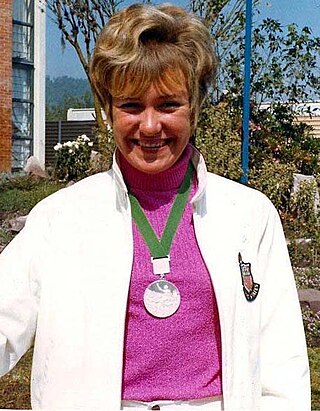
Lillian Barbara Board, was a British athlete. She won the silver medal in the 400 metres at the 1968 Summer Olympics in Mexico City, and two gold medals at the 1969 European Championships in Athletics in Athens. Her career was cut short in 1970 when she developed the colorectal cancer that within months would claim her life.
Henry James, American lawyer and author (b. 1879) deaths
Henry James III was an American writer who won the Pulitzer Prize for Biography or Autobiography in 1931. James, who was described as "delightful, rather pedantic, crisp, and humorous," was the son of William James and the nephew of novelist Henry James.
Nicholas Roerich, Russian archaeologist, painter, and philosopher (b. 1874) deaths

Nicholas Roerich, also known as Nikolai Konstantinovich Rerikh, was a Russian painter, writer, archaeologist, theosophist, philosopher, and public figure. In his youth he was influenced by Russian Symbolism, a movement in Russian society centered on the spiritual. He was interested in hypnosis and other spiritual practices and his paintings are said to have hypnotic expression.
Irma Grese, German concentration camp guard (b. 1923) deaths

Irma Ilse Ida Grese was a Nazi concentration camp guard at Ravensbrück and Auschwitz, and served as warden of the women's section of Bergen-Belsen. She was a volunteer member of the SS.
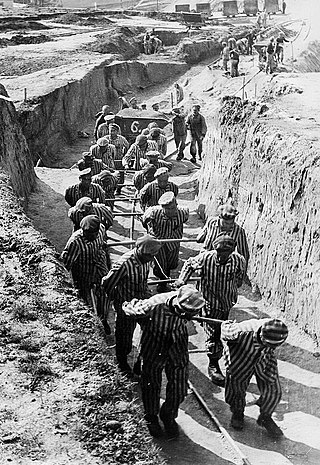
From 1933 to 1945, Nazi Germany operated more than a thousand concentration camps on its own territory and in parts of German-occupied Europe.
Josef Kramer, German concentration camp commandant (b. 1906) deaths

Josef Kramer was Hauptsturmführer and the Commandant of Auschwitz-Birkenau and of the Bergen-Belsen concentration camp. Dubbed the Beast of Belsen by camp inmates, he was a German Nazi war criminal, directly responsible for the deaths of thousands of people. He was detained by the British Army after the Second World War, convicted of war crimes, and hanged on the gallows in the prison at Hamelin by British executioner Albert Pierrepoint.

From 1933 to 1945, Nazi Germany operated more than a thousand concentration camps on its own territory and in parts of German-occupied Europe.
Elisabeth Volkenrath, Polish-German concentration camp supervisor (b. 1919) deaths

Elisabeth Volkenrath was a German supervisor at several Nazi concentration camps during World War II.

From 1933 to 1945, Nazi Germany operated more than a thousand concentration camps on its own territory and in parts of German-occupied Europe.
Wassily Kandinsky, Russian-French painter and theorist (b. 1866) deaths

Wassily Wassilyevich Kandinsky was a Russian painter and art theorist. Kandinsky is generally credited as one of the pioneers of abstraction in western art, possibly after Hilma af Klint. Born in Moscow, he spent his childhood in Odessa, where he graduated at Grekov Odessa Art School. He enrolled at the University of Moscow, studying law and economics. Successful in his profession—he was offered a professorship at the University of Dorpat —Kandinsky began painting studies at the age of 30.
Howard Brenton, English playwright and screenwriter births
Howard John Brenton FRSL is an English playwright and screenwriter. While little-known in the United States, he is celebrated in his home country and often ranked alongside contemporaries such as Edward Bond, Caryl Churchill, and David Hare.
Ferguson Jenkins, Canadian baseball player births
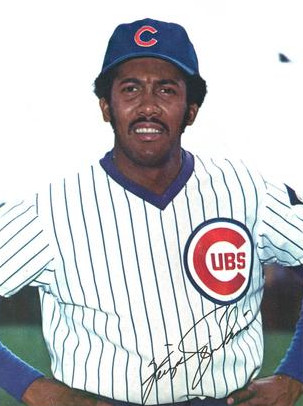
Ferguson Arthur "Fergie" Jenkins CM is a Canadian former professional baseball pitcher and coach. He played Major League Baseball (MLB) from 1965 to 1983 for the Philadelphia Phillies, Chicago Cubs, Texas Rangers and Boston Red Sox.
Wlodimir Ledóchowski, Austrian-Polish religious leader, 26th Superior-General of the Society of Jesus (b. 1866) deaths

Włodzimierz Halka Ledóchowski, S.J. was a Polish nobleman who was the 26th Superior-General of the Society of Jesus from 11 February 1914 until his death. Prior to taking holy orders, he was briefly a page in the Habsburg Court.

The superior general of the Society of Jesus is the leader of the Society of Jesus, the Catholic religious order also known as the Jesuits. He is generally addressed as Father General. The position sometimes carries the nickname of the Black Pope, because of his responsibility for the largest male religious order, in contrast with the white garb of the pope. The thirty-first and current superior general is Fr Arturo Sosa, elected by the 36th General Congregation on 14 October 2016.
Robert Robinson Taylor, American architect (b. 1868) deaths

Robert Robinson Taylor was an American architect and educator. Taylor was the first African-American student enrolled at the Massachusetts Institute of Technology (MIT), and the first accredited African-American architect when he graduated in 1892. He was an early and influential member of the Tuskegee Institute faculty.
Sanjaya Lall, Indian economist and academic (d. 2005) births
Sanjaya Lall was a development economist and Professor of Economics at the University of Oxford. Lall's research interests included the impact of foreign direct investment in developing countries, the economics of multi-national corporations, and the development of technological capability and industrial competitiveness in developing countries. One of the world's pre-eminent development economists, Lall was also one of the founding editors of the journal Oxford Development Studies and a senior economist at the World Bank.
Gus Johnson, American basketball player; elected to Hall of Fame in 2010 (d. 1987) births

Gus Johnson Jr. was an American professional basketball player in the National Basketball Association (NBA). A 6 ft 6 in (1.98 m), 235-pound (107 kg) forward–center, he spent nine seasons with the Baltimore Bullets, and his final season was split between the Phoenix Suns and the Indiana Pacers of the American Basketball Association (ABA).

The Naismith Memorial Basketball Hall of Fame is an American history museum and hall of fame, located at 1000 Hall of Fame Avenue in Springfield, Massachusetts. It serves as basketball's most complete library, in addition to promoting and preserving the history of basketball. Dedicated to Canadian-American physician James Naismith, who invented the sport in Springfield, the Hall of Fame inducted its first class in 1959, before opening its first facility on February 17, 1968.
Prince Karim al-Husayn Shāh, Aga Khan IV, Swiss humanitarian and religious leader births

Shāh Karim al-Husayni, known by the religious title Mawlānā Hazar Imam by his Ismaili followers and elsewhere as Aga Khan IV, is the 49th and current Imam of Nizari Ismailis, a denomination within Shia Islam. He has held the position of imam and the title of Aga Khan since 11 July 1957, when, at the age of 20, he succeeded his grandfather, Sir Sultan Muhammad Shah Aga Khan III. The Aga Khan claims direct lineal descent from the Islamic prophet Muhammad through Muhammad's cousin and son-in-law, Ali, considered an imam in Shia Islam, and Ali's wife Fatima, Muhammad's daughter from his first marriage.
Türkan Saylan, Turkish physician and academic (d. 2009) births

Türkan Saylan was a Turkish medical doctor in dermatology, academic, writer, teacher and social activist. She was famous for fighting leprosy, and for founding a charitable foundation called "Association for the Support of Contemporary Living".
Victor Grignard, French chemist and academic, Nobel Prize laureate (b. 1871) deaths

Francois Auguste Victor Grignard was a French chemist who won the Nobel Prize for his discovery of the eponymously named Grignard reagent and Grignard reaction, both of which are important in the formation of carbon–carbon bonds.

The Nobel Prize in Chemistry is awarded annually by the Royal Swedish Academy of Sciences to scientists in the various fields of chemistry. It is one of the five Nobel Prizes established by the will of Alfred Nobel in 1895, awarded for outstanding contributions in chemistry, physics, literature, peace, and physiology or medicine. This award is administered by the Nobel Foundation, and awarded by the Royal Swedish Academy of Sciences on proposal of the Nobel Committee for Chemistry which consists of five members elected by the Academy. The award is presented in Stockholm at an annual ceremony on 10 December, the anniversary of Nobel's death.
Richard D. Zanuck, American film producer (d. 2012) births

Richard Darryl Zanuck was an American film producer. His 1989 film Driving Miss Daisy won the Academy Award for Best Picture. Zanuck was also instrumental in launching the career of director Steven Spielberg, who described Zanuck as a "director's producer" and "one of the most honorable and loyal men of our profession."
Antoinette Rodez Schiesler, American chemist (d. 1996) births
Mary Antoinette "Toni" Rodez Schiesler was an American chemist and Director of Research at Villanova University. She was also a former Roman Catholic nun and Episcopal deaconess.
Georgios Jakobides, Greek painter and sculptor (b. 1853) deaths
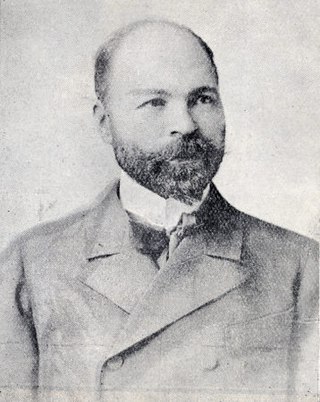
Georgios Jakobides was a painter and one of the main representatives of the Greek artistic movement of the Munich School. He founded and was the first curator of the National Gallery of Greece in Athens.
Gustave Le Bon, French psychologist, sociologist, and anthropologist (b. 1840) deaths

Charles-Marie Gustave Le Bon was a leading French polymath whose areas of interest included anthropology, psychology, sociology, medicine, invention, and physics. He is best known for his 1895 work The Crowd: A Study of the Popular Mind, which is considered one of the seminal works of crowd psychology.
Fritz Pregl, Slovenian-Austrian chemist and physician, Nobel Prize laureate (b. 1869) deaths
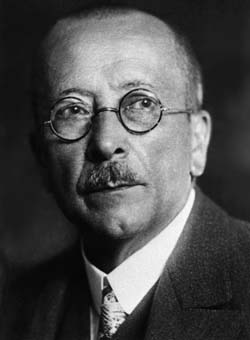
Fritz Pregl, was a Slovenian-Austrian chemist and physician from a mixed Slovene-German-speaking background. He won the Nobel Prize in Chemistry in 1923 for making important contributions to quantitative organic microanalysis, one of which was the improvement of the combustion train technique for elemental analysis.

The Nobel Prize in Chemistry is awarded annually by the Royal Swedish Academy of Sciences to scientists in the various fields of chemistry. It is one of the five Nobel Prizes established by the will of Alfred Nobel in 1895, awarded for outstanding contributions in chemistry, physics, literature, peace, and physiology or medicine. This award is administered by the Nobel Foundation, and awarded by the Royal Swedish Academy of Sciences on proposal of the Nobel Committee for Chemistry which consists of five members elected by the Academy. The award is presented in Stockholm at an annual ceremony on 10 December, the anniversary of Nobel's death.
Christopher Plummer, Canadian actor and producer (d. 2021) births
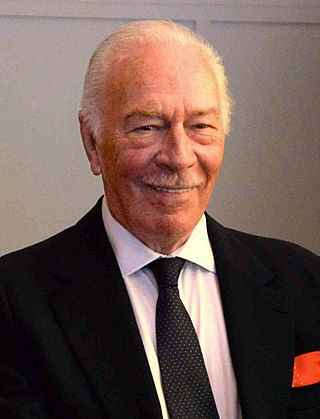
Arthur Christopher Orme Plummer was a Canadian actor. His career spanned seven decades, gaining him recognition for his performances in film, stage, and television. He received multiple accolades, including an Academy Award, two Tony Awards, two Primetime Emmy Awards and a Grammy Award nomination―making him the only Canadian recipient of the "Triple Crown of Acting" to also acquire a Grammy nomination. He made his Broadway debut in 1954 and continued to act in leading roles on stage, playing Cyrano de Bergerac in Cyrano (1974), Iago in Othello, as well as playing the titular roles in Hamlet at Elsinore (1964), Macbeth, King Lear, and Barrymore. Plummer performed in stage productions, including J.B., No Man's Land, and Inherit the Wind.
Rosina Heikel, Finnish physician (b. 1842) deaths

Emma Rosina Heikel was a Finnish medical doctor and feminist. In 1878, she became the first female physician in Finland, and specialised in gynaecology and paediatrics.

A physician, medical practitioner, medical doctor, or simply doctor, is a health professional who practices medicine, which is concerned with promoting, maintaining or restoring health through the study, diagnosis, prognosis and treatment of disease, injury, and other physical and mental impairments. Physicians may focus their practice on certain disease categories, types of patients, and methods of treatment—known as specialities—or they may assume responsibility for the provision of continuing and comprehensive medical care to individuals, families, and communities—known as general practice. Medical practice properly requires both a detailed knowledge of the academic disciplines, such as anatomy and physiology, underlying diseases and their treatment—the science of medicine—and also a decent competence in its applied practice—the art or craft of medicine.
James Wright, American poet and academic (d. 1980) births
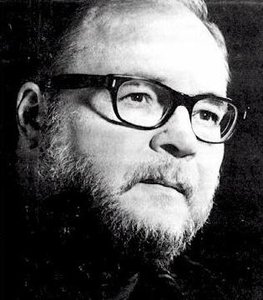
James Arlington Wright was an American poet.
Mehmet Nadir, Turkish mathematician and academic (b. 1856) deaths

Mehmet Nadir was a Turkish mathematician and educator.
Dick Van Dyke, American actor, singer, and dancer births
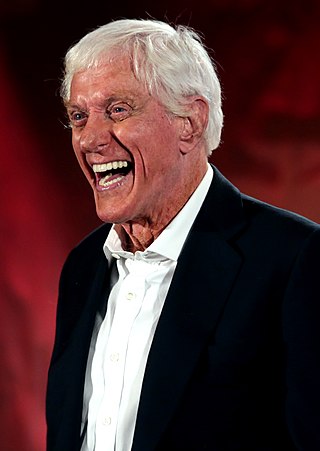
Richard Wayne Van Dyke is an American actor, entertainer and comedian. His award-winning career has spanned seven decades in film, television, and stage.
Samuel Gompers, English-born American labor leader, founded the American Federation of Labor (b. 1850) deaths
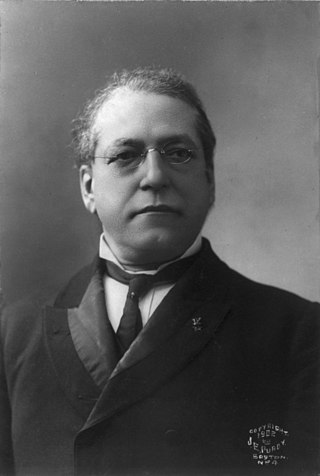
Samuel Gompers was a British-born American cigar maker, labor union leader and a key figure in American labor history. Gompers founded the American Federation of Labor (AFL) and served as the organization's president from 1886 to 1894, and from 1895 until his death in 1924. He promoted harmony among the different craft unions that comprised the AFL, trying to minimize jurisdictional battles. He promoted thorough organization and collective bargaining in order to secure shorter hours and higher wages, which he considered the essential first steps to emancipating labor.

The American Federation of Labor was a national federation of labor unions in the United States that continues today as the AFL-CIO. It was founded in Columbus, Ohio, in 1886 by an alliance of craft unions eager to provide mutual support and disappointed in the Knights of Labor. Samuel Gompers was elected the full-time president at its founding convention and reelected every year, except one, until his death in 1924. He became the major spokesperson for the union movement.
Philip Warren Anderson, American physicist and academic, Nobel Prize laureate (d. 2020) births

Philip Warren Anderson was an American theoretical physicist and Nobel laureate. Anderson made contributions to the theories of localization, antiferromagnetism, symmetry breaking, and high-temperature superconductivity, and to the philosophy of science through his writings on emergent phenomena. Anderson is also responsible for naming the field of physics that is now known as condensed matter physics.

The Nobel Prize in Physics is a yearly award given by the Royal Swedish Academy of Sciences for those who have made the most outstanding contributions for humankind in the field of physics. It is one of the five Nobel Prizes established by the will of Alfred Nobel in 1895 and awarded since 1901, the others being the Nobel Prize in Chemistry, Nobel Prize in Literature, Nobel Peace Prize, and Nobel Prize in Physiology or Medicine. Physics is traditionally the first award presented in the Nobel Prize ceremony.
Larry Doby, American baseball player (d. 2003) births
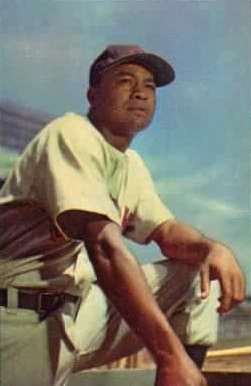
Lawrence Eugene Doby was an American professional baseball player in the Negro leagues and Major League Baseball (MLB) who was the second black player to break baseball's color barrier and the first black player in the American League. A native of Camden, South Carolina, and three-sport all-state athlete while in high school in Paterson, New Jersey, Doby accepted a basketball scholarship from Long Island University. At 17 years of age, he began his professional baseball career with the Newark Eagles as the team's second baseman. Doby joined the United States Navy during World War II. His military service complete, Doby returned to baseball in 1946, and along with teammate Monte Irvin, helped the Eagles win the Negro League World Series.
Arthur Wesley Dow, American painter and photographer (b. 1857) deaths

Arthur Wesley Dow was an American painter, printmaker, photographer and an arts educator.
Hannes Hafstein, Icelandic poet and politician, 1st Prime Minister of Iceland (b. 1861) deaths

Hannes Þórður Pétursson Hafstein was an Icelandic politician and poet. In 1904 he became the first Icelander to be appointed to the Danish Cabinet as the minister for Iceland in the Cabinet of Deuntzer and was – unlike the previous minister for Iceland Peter Adler Alberti – responsible to the Icelandic Althing.

The prime minister of Iceland is Iceland's head of government. The prime minister is appointed formally by the president and exercises executive authority along with the cabinet subject to parliamentary support.
Turgut Demirağ, Turkish film producer, director and screenwriter (d. 1987) births
Turgut Demirağ was a Turkish film producer, director and screenwriter. He directed 16 films between 1947 and 1973. His 1964 film Love and Grudge was entered into the 4th Moscow International Film Festival.
George P. Shultz, American economist and politician, 60th United States Secretary of State (d. 2021) births

George Pratt Shultz was an American economist, businessman, diplomat and statesman. He served in various positions under three different Republican presidents and is one of the only two persons to have held four different Cabinet-level posts, the other being Elliot Richardson. Shultz had played a major role in shaping the foreign policy of the Ronald Reagan administration. From 1974 to 1982, he was an executive of the Bechtel Group, an engineering and services company.

The United States secretary of state is a member of the executive branch of the federal government of the United States and the head of the U.S. Department of State. The office holder is one of the highest ranking members of the president's Cabinet, and ranks the first in the U.S. presidential line of succession among Cabinet secretaries.
Hans-Joachim Marseille, German captain and pilot (d. 1942) births

Hans-Joachim Marseille was a German Luftwaffe fighter pilot and flying ace during World War II. He is noted for his aerial battles during the North African Campaign and his Bohemian lifestyle. One of the most successful fighter pilots, he was nicknamed the "Star of Africa". Marseille claimed all but seven of his 158 victories against the British Commonwealth's Desert Air Force over North Africa, flying the Messerschmitt Bf 109 fighter for his entire combat career. No other pilot claimed as many Western Allied aircraft as Marseille.
Woldemar Voigt, German physicist and academic (b. 1850) deaths
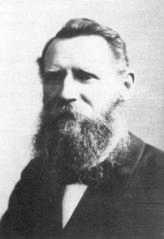
Woldemar Voigt was a German physicist, who taught at the Georg August University of Göttingen. Voigt eventually went on to head the Mathematical Physics Department at Göttingen and was succeeded in 1914 by Peter Debye, who took charge of the theoretical department of the Physical Institute. In 1921, Debye was succeeded by Max Born.
Leonard Weisgard, American author and illustrator (d. 2000) births
Leonard Joseph Weisgard was an American writer and illustrator of more than 200 children's books. He is known best for his collaborations with writer Margaret Wise Brown.
B. J. Vorster, South African lawyer and politician, 4th State President of South Africa (d. 1983) births

Balthazar Johannes "B. J." Vorster was a South African apartheid politician who served as the prime minister of South Africa from 1966 to 1978 and the fourth state president of South Africa from 1978 to 1979. Known as B. J. Vorster during much of his career, he came to prefer the anglicized name John in the 1970s.
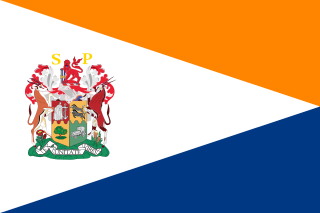
The State President of the Republic of South Africa was the head of state of South Africa from 1961 to 1994. The office was established when the country became a republic on 31 May 1961, albeit, outside the Commonwealth of Nations, and Queen Elizabeth II ceased to be Queen of South Africa. The position of Governor-General of South Africa was accordingly abolished. From 1961 to 1984, the post was largely ceremonial. After constitutional reforms enacted in 1983 and taking effect in 1984, the State President became an executive post, and its holder was both head of state and head of government.
Alan Bullock, English historian and author (d. 2004) births
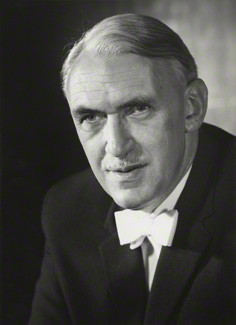
Alan Louis Charles Bullock, Baron Bullock, was a British historian. He is best known for his book Hitler: A Study in Tyranny (1952), the first comprehensive biography of Adolf Hitler, which influenced many other Hitler biographies.
Larry Noble, English comedian and actor (d. 1993) births
Larry Noble was a stage comedian and actor best known for starring in the Whitehall farces with Brian Rix. He starred in the original production of Reluctant Heroes and as the chirpy French jockey in Dry Rot. On television, he made guest appearances on Last of the Summer Wine in 1975 and Blake's 7 in 1981. He died on 9 September 1993, aged 78.
Archie Moore, American boxer and actor; world light-heavyweight champion (d. 1998) births
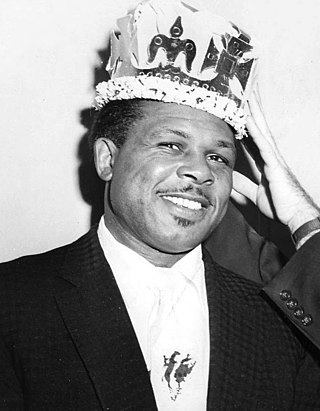
Archie Moore was an American professional boxer and the longest reigning World Light Heavyweight Champion of all time. He had one of the longest professional careers in the history of the sport, competing from 1935 to 1963. Nicknamed "The Mongoose", and then "The Old Mongoose" in the latter half of his career, Moore was a highly strategic and defensive boxer. As of December 2020, BoxRec ranks Moore as the third greatest pound-for-pound boxer of all time. He also ranks fourth on The Ring's list of "100 greatest punchers of all time". Moore was also a trainer for a short time after retirement, training Muhammad Ali, George Foreman and James Tillis.
Arnold Brown, English-Canadian missionary, 11th General of The Salvation Army (d. 2002) births
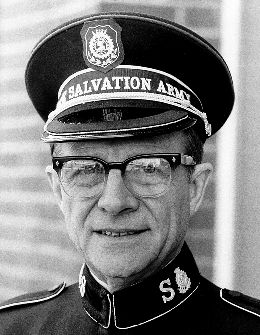
Arnold Brown was the 11th General of The Salvation Army (1977–1981).

General is the title of the international leader and Chief Executive Officer (CEO) of the Salvation Army, a Christian denomination with extensive charitable social services that gives quasi-military rank to its ministers. The General is elected by the High Council of The Salvation Army and serves a term of five years, which may be extended to seven years. Brian Peddle, the current general, assumed the position in August 2018 upon the retirement of Andre Cox. The organisation's founder, William Booth, was the first and longest-serving general. There have been 21 generals as of 2018.
Luiz Gonzaga, Brazilian singer-songwriter and accordion player (d. 1989) births

Luiz Gonzaga do Nascimento was a Brazilian singer, songwriter, musician and poet and one of the most influential figures of Brazilian popular music in the twentieth century. He has been credited with having presented the rich universe of Northeastern musical genres to all of Brazil, having popularized the musical genre baião and has been called a "revolutionary" by Antônio Carlos Jobim. According to Caetano Veloso, he was the first significant cultural event with mass appeal in Brazil. Luiz Gonzaga received the Shell prize for Brazilian Popular Music in 1984 and was only the fourth artist to receive this prize after Pixinguinha, Antônio Carlos Jobim and Dorival Caymmi. The Luiz Gonzaga Dam was named in his honor.
Trygve Haavelmo, Norwegian economist and mathematician, Nobel Prize laureate (d. 1999) births
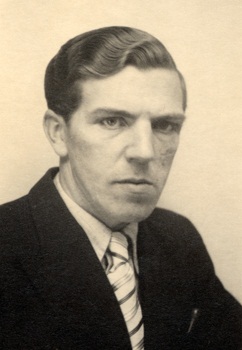
Trygve Magnus Haavelmo, born in Skedsmo, Norway, was an economist whose research interests centered on econometrics. He received the Nobel Memorial Prize in Economic Sciences in 1989.

The Nobel Memorial Prize in Economic Sciences, officially the Sveriges Riksbank Prize in Economic Sciences in Memory of Alfred Nobel, is an economics award administered by the Nobel Foundation.
Kenneth Patchen, American poet and painter (d. 1972) births
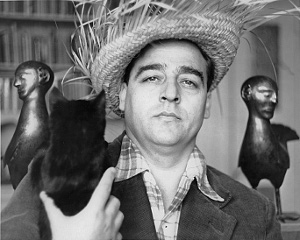
Kenneth Patchen was an American poet and novelist. He experimented with different forms of writing and incorporated painting, drawing, and jazz music into his works, which have been compared with those of William Blake and Walt Whitman. Patchen's biographer wrote that he "developed in his fabulous fables, love poems, and picture poems a deep yet modern mythology that conveys a sense of compassionate wonder amidst the world's violence." Along with his friend and peer Kenneth Rexroth, he was a central influence on the San Francisco Renaissance and the Beat Generation.
Plinio Corrêa de Oliveira, Brazilian historian and activist (d. 1995) births
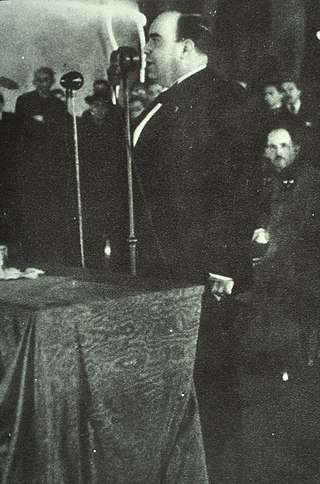
Plinio Corrêa de Oliveira was a Brazilian intellectual and traditionalist Catholic activist, best known for the foundation of Tradition, Family and Property organization.
Van Heflin, American film actor (d. 1971) births
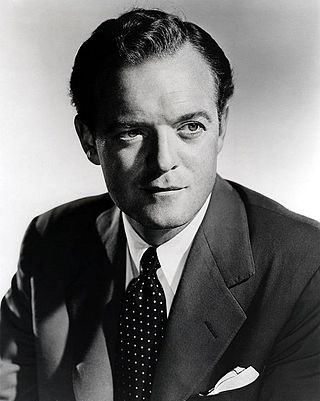
Emmett Evan "Van" Heflin Jr. was an American theatre, radio and film actor. He played mostly character parts over the course of his film career, but during the 1940s had a string of roles as a leading man. Heflin won the Academy Award for Best Supporting Actor for his performance in Johnny Eager (1942). He also had memorable roles in Westerns such as Shane (1953), 3:10 to Yuma (1957), and Gunman's Walk (1958).
Elizabeth Alexander, British geologist, academic, and physicist (d. 1958) births

Frances Elizabeth Somerville Alexander was a British geologist, academic, and physicist, whose wartime work with radar and radio led to early developments in radio astronomy and whose post-war work on the geology of Singapore is considered a significant foundation to contemporary research. Alexander earned her PhD from Newnham College, Cambridge, and worked in Radio Direction Finding at Singapore Naval Base from 1938 to 1941. In January 1941, unable to return to Singapore from New Zealand, she became Head of Operations Research in New Zealand's Radio Development Lab, Wellington. In 1945, Alexander correctly interpreted that anomalous radar signals picked up on Norfolk Island were caused by the sun. This interpretation became pioneering work in the field of radio astronomy, making her one of the first women scientists to work in that field, albeit briefly.
Augustus Le Plongeon, French photographer and historian (b. 1825) deaths

Augustus Henry Julian Le Plongeon was a British-American archeologist and photographer who studied the pre-Columbian ruins of America, particularly those of the Maya civilization on the northern Yucatán Peninsula. While his writings contain many notions that were not well received by his contemporaries and were later disproven, Le Plongeon left a lasting legacy in his photographs documenting the ancient ruins. He was one of the earliest proponents of Mayanism.
Princess Marina of Greece and Denmark (d. 1968) births

Princess Marina, Duchess of Kent, born Princess Marina of Greece and Denmark, was a Greek princess by birth and a British princess by marriage. She was a daughter of Prince Nicholas of Greece and Denmark and Grand Duchess Elena Vladimirovna of Russia, and a granddaughter of King George I and Queen Olga of Greece. Princess Marina married Prince George, Duke of Kent, fourth son of King George V and Queen Mary, in 1934. They had three children: Prince Edward, Princess Alexandra, and Prince Michael.
Laurens van der Post, South African-English soldier and author (d. 1996) births

Sir Laurens Jan van der Post, was a South African Afrikaner writer, farmer, soldier, educator, journalist, humanitarian, philosopher, explorer and conservationist. He was noted for his interest in Jungianism and the Kalahari Bushmen, his experiences during World War II, as well as his relationships with notable figures such as the future King Charles III and British Prime Minister Margaret Thatcher. After his death, there was controversy over claims that he had exaggerated many aspects of his life, as well his sexual abuse and impregnation of a 14-year-old girl.
Ann Barzel, American writer and dance critic (d. 2007) births
Ann Barzel was an American writer, critic and lecturer on dance.
Ella Baker, American activist (d. 1986) births

Ella Josephine Baker was an African-American civil rights and human rights activist. She was a largely behind-the-scenes organizer whose career spanned more than five decades. In New York City and the South, she worked alongside some of the most noted civil rights leaders of the 20th century, including W. E. B. Du Bois, Thurgood Marshall, A. Philip Randolph, and Martin Luther King Jr. She also mentored many emerging activists, such as Diane Nash, Stokely Carmichael, and Bob Moses, as leaders in the Student Nonviolent Coordinating Committee (SNCC).
Carlos Montoya, Spanish guitarist and composer (d. 1993) births

Carlos García Montoya in Madrid, Spain, was a prominent flamenco guitarist and a founder of the modern-day popular flamenco style of music.
Panagiotis Kanellopoulos, Greek philosopher and politician, 138th Prime Minister of Greece (d. 1986) births
Panagiotis Kanellopoulos or Panayotis Kanellopoulos was a Greek writer, politician and Prime Minister of Greece. He was the Prime Minister of Greece deposed by the Greek military junta of 1967–1974.

The prime minister of the Hellenic Republic, colloquially referred to as the prime minister of Greece, is the head of government of the Hellenic Republic and the leader of the Greek Cabinet. The incumbent prime minister is Kyriakos Mitsotakis, who took office on 8 July 2019 from Alexis Tsipras.
Talcott Parsons, American sociologist and academic (d. 1979) births
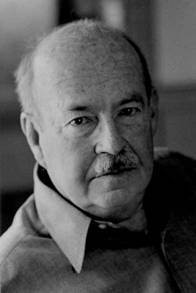
Talcott Parsons was an American sociologist of the classical tradition, best known for his social action theory and structural functionalism. Parsons is considered one of the most influential figures in sociology in the 20th century. After earning a PhD in economics, he served on the faculty at Harvard University from 1927 to 1929. In 1930, he was among the first professors in its new sociology department. Later, he was instrumental in the establishment of the Department of Social Relations at Harvard.
Olev Roomet, Estonian singer, violinist, and bagpipe player (d. 1987) births
Olev Roomet was an Estonian musician, a violin player, a player of the torupill and a singer in the State Academic Male Choir of Estonia. He became interested in the Estonian bagpipe in his 50s. At the death of Aleksander Maaker in 1968, Roomer became the only living player of the torupill at that time.

Bagpipes are a woodwind instrument using enclosed reeds fed from a constant reservoir of air in the form of a bag. The Scottish Great Highland bagpipes are the best known examples in the Anglophone world, but people have played bagpipes for centuries throughout large parts of Europe, Northern Africa, Western Asia, around the Persian Gulf and northern parts of South Asia.
Jonel Perlea, Romanian-American conductor and educator (d. 1970) births
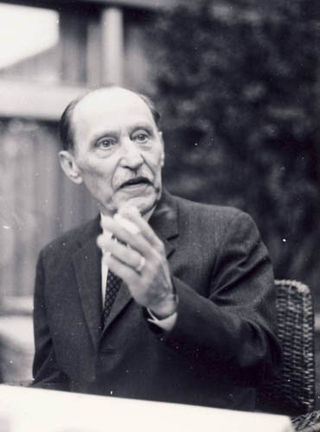
Ionel Perlea was a Romanian conductor particularly associated with the Italian and German opera repertories.
Albert Aalbers, Dutch architect, designed the Savoy Homann Bidakara Hotel (d. 1961) births

Albert Frederik Aalbers was a Dutch architect who created elegant villas, hotels and office buildings in Bandung, Indonesia during Dutch colonial rule in the 1930s. Albert Aalbers worked in the Netherlands between 1924 and 1930 and then migrated to the Dutch East Indies after which he returned to the Netherlands in 1942 due to World War II and political circumstances following Indonesian independence. During his stay in Bandung, in a period when the city was dubbed the city of architecture laboratory, a number of his buildings were considered architectural masterpieces. Aalbers' style was inspired by expressionist Frank Lloyd Wright and modernist Le Corbusier. In Bandung, the DENIS bank in Braga Street and the Savoy Homann Hotel in Asia-Afrika Street, still carry Aalber's ocean wave ornamentation.

The Hotel Savoy Homann is a historic four stars hotel located on Asia Afrika Street, Bandung, Indonesia. It was built in 1939, replacing the 19th century Homann Hotel. Designed by the Dutch architect Albert Aalbers, the hotel features art deco exterior and interior, and historic furniture. It is an architectural heritage and a fine example of art deco colonial architecture of the East Indies.
Drew Pearson, American journalist and author (d. 1969) births

Andrew Russell Pearson was one of the best-known American columnists of his day, noted for his syndicated newspaper column "Washington Merry-Go-Round". He also had a program on NBC Radio titled Drew Pearson Comments. He often attacked conservative politicians, such as Joe McCarthy and Ronald Reagan.
Ányos Jedlik, Hungarian physicist and engineer (b. 1800) deaths
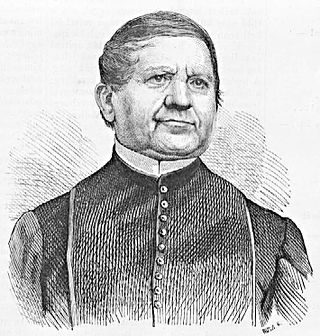
Ányos István Jedlik was a Hungarian inventor, engineer, physicist, and Benedictine priest. He was also a member of the Hungarian Academy of Sciences, and author of several books. He is considered by Hungarians and Slovaks to be the unsung father of the dynamo and electric motor.
Georg August Rudolph, German lawyer and politician, 3rd Mayor of Marburg (b. 1816) deaths

Georg August Rudolph was a German politician and from 4 December 1856 until 2 August 1884 mayor of Marburg.

This is a list of all the mayors of Marburg in Germany since 1835.
George Pólya, Hungarian-American mathematician and academic (d. 1985) births
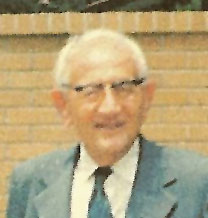
George Pólya was a Hungarian mathematician. He was a professor of mathematics from 1914 to 1940 at ETH Zürich and from 1940 to 1953 at Stanford University. He made fundamental contributions to combinatorics, number theory, numerical analysis and probability theory. He is also noted for his work in heuristics and mathematics education. He has been described as one of The Martians, an informal category which included one of his most famous students at ETH Zurich, John Von Neumann.
Alvin C. York, American colonel, Medal of Honor recipient (d. 1964) births

Alvin Cullum York, also known as Sergeant York, was one of the most decorated United States Army soldiers of World War I. He received the Medal of Honor for leading an attack on a German machine gun nest, gathering 35 machine guns, killing at least 25 enemy soldiers and capturing 132 prisoners. York's Medal of Honor action occurred during the United States-led portion of the Meuse-Argonne Offensive in France, which was intended to breach the Hindenburg line and force the Germans to surrender. He earned decorations from several allied countries during WWI, including France, Italy and Montenegro.
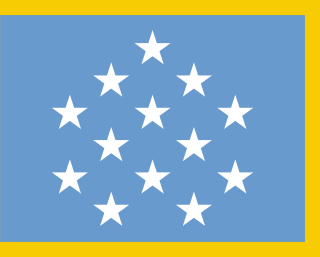
The Medal of Honor (MOH) is the United States Armed Forces' highest military decoration and is awarded to recognize American soldiers, sailors, marines, airmen, guardians and coast guardsmen who have distinguished themselves by acts of valor. The medal is normally awarded by the president of the United States, but as it is presented "in the name of the United States Congress", it is sometimes erroneously referred to as the "Congressional Medal of Honor".
Annie Dale Biddle Andrews, American mathematician (d. 1940) births
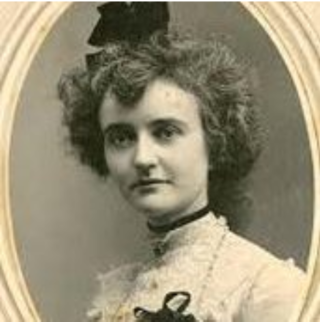
Annie Dale Biddle Andrews was the first woman to earn a Ph.D. in mathematics from the University of California, Berkeley.
Aimilios Veakis, Greek actor, director, and playwright (d. 1951) births
Aimilios Veakis was a Greek actor. An active member of the National Liberation Front during the Axis occupation of Greece, he was persecuted for his leftist beliefs during the White Terror.
Belle da Costa Greene, American librarian and bibliographer (d. 1950) births

Belle da Costa Greene was an American librarian best known for managing and developing the personal library of J. P. Morgan. After Morgan's death in 1913, Greene continued as librarian for his son, Jack Morgan, and in 1924 was named the first director of the Pierpont Morgan Library. Despite being born to Black parents, Greene spent her professional career passing for white.
Victor de Laprade, French poet and critic (b. 1812) deaths
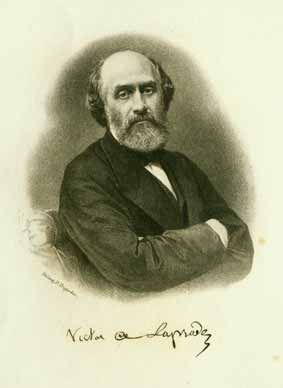
Pierre Martin Victor Richard de Laprade, known as Victor de Laprade, was a French poet and critic.
Jane Edna Hunter, African-American social worker (d. 1971) births
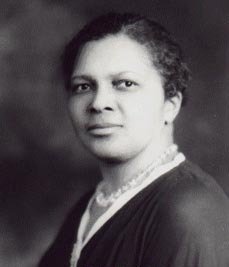
Jane Edna Hunter, an African-American social worker, was born near Pendleton, South Carolina. In 1911 she established the Working Girls Association in Cleveland, Ohio, which later became the Phillis Wheatley Association of Cleveland.
August Šenoa, Croatian author and poet (b. 1838) deaths

August Ivan Nepomuk Eduard Šenoa was a Croatian novelist. Born to an ethnic German and Slovak family, Šenoa became a key figure in the development of an independent literary tradition in Croatian and shaping the emergence of the urban Croatian identity of Zagreb and its surroundings at a time when Austrian control was weaning. He was a literary transitional figure, who helped bring Croatian literature from Romanticism to Realism and introduced the historical novel to Croatia. He wrote more than ten novels, among which the most notable are: Zlatarovo zlato, Čuvaj se senjske ruke, Seljačka buna, and Diogenes (1878).
Josef Lhévinne, Russian pianist and educator (d. 1944) births

Josef Lhévinne was a Russian pianist and piano teacher. Lhévinne wrote a short book in 1924 that is considered a classic: Basic Principles in Pianoforte Playing. Asked how to say his name, he told The Literary Digest it was lay-VEEN.
Emily Carr, Canadian painter and author (d. 1945) births

Emily Carr was a Canadian artist and writer who was inspired by the Indigenous peoples of the Pacific Northwest Coast. One of the painters in Canada to adopt a Modernist and Post-Impressionist style, Carr did not receive widespread recognition for her work until she changed her subject matter from Aboriginal themes to landscapes — forest scenes in particular, evoking primeval grandeur. As a writer Carr was one of the earliest chroniclers of life in British Columbia. The Canadian Encyclopedia describes her as a "Canadian icon".
Edward LeSaint, American actor and director (d. 1940) births

Edward LeSaint was an American stage and film actor and director whose career began in the silent era. He acted in over 300 films and directed more than 90. He was sometimes credited as Edward J. Le Saint.
Carl Friedrich Philipp von Martius, German botanist and explorer (b. 1794) deaths

Carl Friedrich Philipp von Martius was a German botanist and explorer.
Kristian Birkeland, Norwegian physicist and author (d. 1917) births

Kristian Olaf Bernhard Birkeland was a Norwegian scientist. He is best remembered for his theories of atmospheric electric currents that elucidated the nature of the aurora borealis. In order to fund his research on the aurorae, he invented the electromagnetic cannon and the Birkeland–Eyde process of fixing nitrogen from the air. Birkeland was nominated for the Nobel Prize seven times.
Emil Seidel, American woodcarver and politician, 36th Mayor of Milwaukee (d. 1947) births

Emil Seidel was a prominent German-American politician. Seidel was the mayor of Milwaukee from 1910 to 1912. The first Socialist mayor of a major city in the United States, Seidel became the Vice Presidential candidate for the Socialist Party of America in the 1912 presidential election.
This is a list of mayors of Milwaukee, Wisconsin.
Christian Friedrich Hebbel, German poet and playwright (b. 1813) deaths

Christian Friedrich Hebbel was a German poet and dramatist.
Thomas Reade Rootes Cobb, American general, lawyer, and politician (b. 1823) deaths
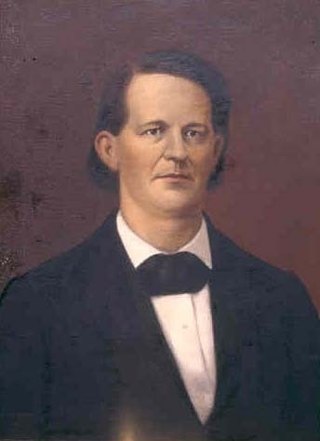
Thomas Reade Rootes Cobb was an American lawyer, author, politician, and Confederate States Army officer, killed in the Battle of Fredericksburg during the American Civil War. He was the brother of noted Confederate statesman Howell Cobb.
Lucien Guitry, French actor (d. 1925) births

Lucien Germain Guitry was a French actor.
Svetozar Boroević, Croatian-Austrian field marshal (d. 1920) births

Svetozar Boroević von Bojna was an Austro-Hungarian field marshal who was described as one of the finest defensive strategists of the First World War. He commanded Austro-Hungarian forces in the Isonzo front, for which he was nicknamed the "Lion of Isonzo".
Herman Bavinck, Dutch philosopher, theologian, and academic (d. 1921) births
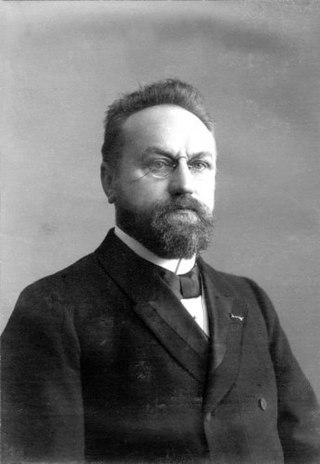
Herman Bavinck was a Dutch Calvinist theologian and churchman. He was a significant scholar in the Calvinist tradition, alongside Abraham Kuyper and B. B. Warfield.
Johann Centurius Hoffmannsegg, German botanist and entomologist (b. 1766) deaths

Johann Centurius Hoffmann Graf von Hoffmannsegg was a German botanist, entomologist and ornithologist. The standard author abbreviation Hoffmanns. is used to indicate this person as the author when citing a botanical name.
Franz von Lenbach, German painter and academic (d. 1904) births
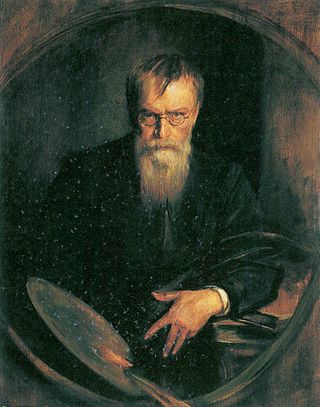
Franz Seraph Lenbach, after 1882, Ritter von Lenbach, was a German painter known primarily for his portraits of prominent personalities from the nobility, the arts, and industry. Because of his standing in society, he was often referred to as the "Malerfürst".
Mathilde Fibiger, Danish feminist, novelist and telegraphist (d. 1892) births

Mathilde Fibiger was a Danish feminist, novelist, and telegraphist.
Mary Todd Lincoln, 16th First Lady of the United States (d. 1882) births

Mary Ann Todd Lincoln served as First Lady of the United States from 1861 until the assassination of her husband, President Abraham Lincoln in 1865.
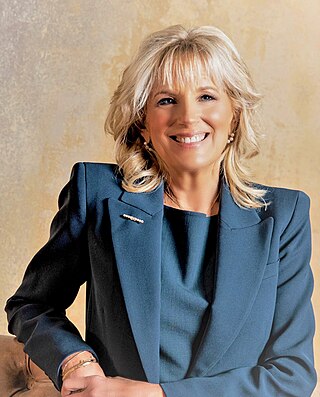
The first lady of the United States (FLOTUS) is the title held by the hostess of the White House, usually the wife of the president of the United States, concurrent with the president's term in office. Although the first lady's role has never been codified or officially defined, she figures prominently in the political and social life of the United States. Since the early 20th century, the first lady has been assisted by official staff, now known as the Office of the First Lady and headquartered in the East Wing of the White House.
Werner von Siemens, German engineer and businessman, founded Siemens (d. 1892) births

Ernst Werner Siemens was a German electrical engineer, inventor and industrialist. Siemens's name has been adopted as the SI unit of electrical conductance, the siemens. He founded the electrical and telecommunications conglomerate Siemens.
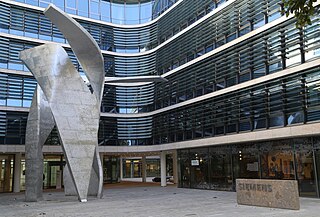
Siemens AG is a German multinational conglomerate corporation and the largest industrial manufacturing company in Europe headquartered in Munich with branch offices abroad.
Ana Néri, Brazilian nurse and philanthropist (d. 1880) births
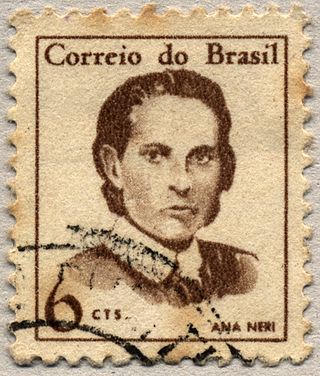
Ana Justina Ferreira Néri was a Brazilian nurse, considered the first in her country. She is best known for her volunteer work with the Triple Alliance during the Paraguayan War.
Charles-Joseph, 7th Prince of Ligne, Belgian-Austrian field marshal (b. 1735) deaths

Charles-Joseph Lamoral, 7th Prince de Ligne in French; in German Karl-Joseph Lamoral 7. Fürst von Ligne : was a field marshal, inhaber of an infantry regiment, prolific writer, intellectual, member of the princely family of Ligne. He fought as a field officer during several famous battles during the Seven Years' War and briefly returned to military duty in the War of the Bavarian Succession. He performed an important diplomatic mission to Catherine the Great in 1787 and led troops against the Ottoman Empire at Belgrade in 1789. Beginning in the 1770s, he authored an impressive volume of work. After his estates in the Austrian Netherlands were lost to France during the War of the First Coalition, he lived in Vienna. All three of his sons died before him, but his wife and four daughters all outlived him. His grandson, the 8th Prince, became a Belgian statesman.
Joseph Howe, Canadian journalist and politician, 5th Premier of Nova Scotia (d. 1873) births

Joseph Howe was a Nova Scotian journalist, politician, public servant, and poet. Howe is often ranked as one of Nova Scotia's most admired politicians and his considerable skills as a journalist and writer have made him a provincial legend.

The premier of Nova Scotia is the first minister to the lieutenant governor of the Canadian province of Nova Scotia and presides over the Executive Council of Nova Scotia. Following the Westminster system, the premier is normally the leader of the political party which has the most seats in the Nova Scotia House of Assembly who is called upon by the lieutenant governor to form a government. As the province's head of government, the premier exercises considerable power.
Heinrich Heine, German journalist, poet, and critic (d. 1856) births

Christian Johann Heinrich Heine was a German poet, writer and literary critic. He is best known outside Germany for his early lyric poetry, which was set to music in the form of Lieder by composers such as Robert Schumann and Franz Schubert. Heine's later verse and prose are distinguished by their satirical wit and irony. He is considered a member of the Young Germany movement. His radical political views led to many of his works being banned by German authorities—which, however, only added to his fame. He spent the last 25 years of his life as an expatriate in Paris.
Archduke Louis of Austria (d. 1864) births
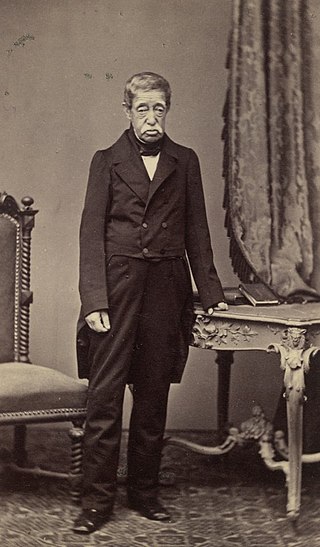
Archduke Louis, Prince Royal of Hungary and Bohemia and Prince of Tuscany, was the 15th child of Holy Roman Emperor Leopold II, King of Hungary and Bohemia, Grand Duke of Tuscany, and Infanta Maria Luisa of Spain.
Samuel Johnson, English poet and lexicographer (b. 1709) deaths
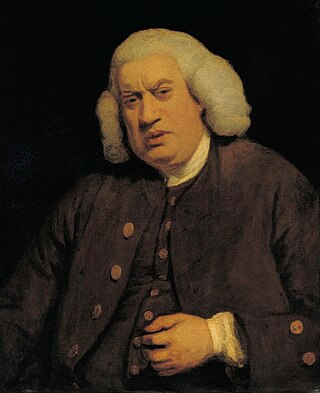
Samuel Johnson, often called Dr Johnson, was an English writer who made lasting contributions as a poet, playwright, essayist, moralist, critic, biographer, editor and lexicographer. The Oxford Dictionary of National Biography calls him "arguably the most distinguished man of letters in English history".
Pehr Wilhelm Wargentin, Swedish astronomer and demographer (b. 1717) deaths

Pehr Wilhelm Wargentin, Swedish astronomer and demographer.
Johann Wolfgang Döbereiner, German chemist, invented the Döbereiner's lamp (d. 1849) births
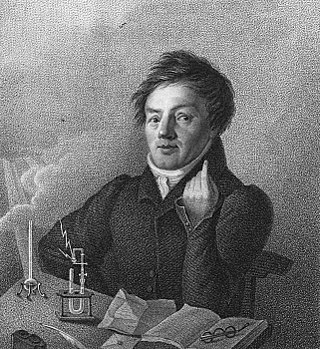
Johann Wolfgang Döbereiner was a German chemist who is best known for work that foreshadowed the periodic law for the chemical elements, and for inventing the first lighter, which was known as the Döbereiner's lamp. He became a professor of chemistry and pharmacy at the University of Jena.

Döbereiner's lamp, also called a "tinderbox" ("Feuerzeug"), is a lighter invented in 1823 by the German chemist Johann Wolfgang Döbereiner. The lighter is based on the Fürstenberger lighter. Döbereiner's lamp was in production until ca. 1880. In the jar, similar to the Kipp's apparatus, zinc metal reacts with dilute sulfuric acid to produce hydrogen gas. When a valve is opened, a jet of hydrogen is released onto a platinum sponge. The sponge catalyzes a reaction with atmospheric oxygen, which heats the catalyst and ignites the hydrogen, producing a gentle flame.
James Scarlett Abinger, English judge (d. 1844) births
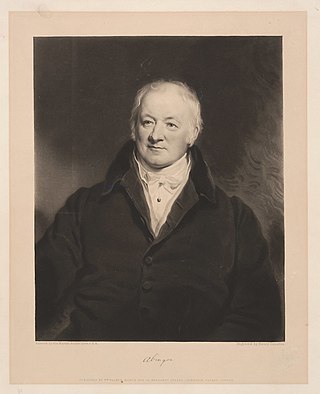
James Scarlett, 1st Baron Abinger, was an English lawyer, politician and judge.
Christian Fürchtegott Gellert, German poet and hymn-writer (b. 1715) deaths
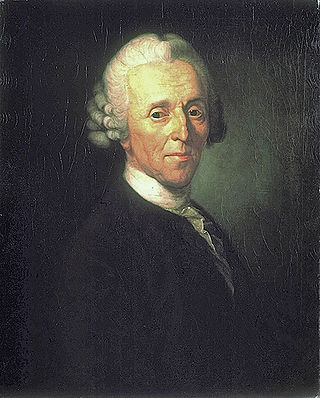
Christian Fürchtegott Gellert was a German poet, one of the forerunners of the golden age of German literature that was ushered in by Lessing.
Noël Doiron, Canadian Acadia leader (b. 1684) deaths
Noël Doiron was a leader of the Acadians, renowned for his leadership during the Deportation of the Acadians. Doiron was deported on a vessel named the Duke William (1758). The Duke William sank, killing many passengers, in one of the worst marine disasters in Canadian history. The captain of the Duke William, William Nichols, described Noel Doiron as the "father" to all the Acadians on Ile St. Jean and the "head prisoner" on board the ship.

Acadia was a colony of New France in northeastern North America which included parts of what are now the Maritime provinces, the Gaspé Peninsula and Maine to the Kennebec River. During much of the 17th and early 18th centuries, Norridgewock on the Kennebec River and Castine at the end of the Penobscot River were the southernmost settlements of Acadia. The French government specified land bordering the Atlantic coast, roughly between the 40th and 46th parallels. It was eventually divided into British colonies. The population of Acadia included the various indigenous First Nations that comprised the Wabanaki Confederacy, the Acadian people and other French settlers.
Mahmud I, Ottoman sultan (b. 1696) deaths

Mahmud I, known as Mahmud the Hunchback, was the Sultan of the Ottoman Empire from 1730 to 1754. He took over the throne after the Patrona Halil rebellion and he kept good relations with the Mughal and Safavid Empires.
Anthony Collins, English philosopher and author (b. 1676) deaths
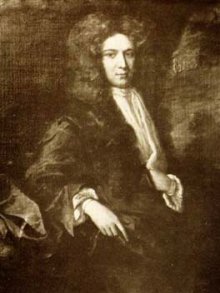
Anthony Collins was an English philosopher and essayist, notable for being one of the early proponents of Deism in Great Britain.
Franz Aepinus, German astronomer and philosopher (d. 1802) births
Franz Ulrich Theodor Aepinus was a German mathematician, scientist, and natural philosopher residing in the Russian Empire. Aepinus is best known for his researches, theoretical and experimental, in electricity and magnetism.
Alexander Selkirk, Scottish sailor (b. 1676) deaths

Alexander Selkirk was a Scottish privateer and Royal Navy officer who spent four years and four months as a castaway (1704–1709) after being marooned by his captain, initially at his request, on an uninhabited island in the South Pacific Ocean. He survived that ordeal but died from tropical illness years later while serving as a Lieutenant aboard HMS Weymouth off West Africa.
Carlo Gozzi, Italian playwright (d. 1804) births

Carlo, Count Gozzi was an Italian (Venetian) playwright and champion of Commedia dell'arte.
Charles de La Fosse, French painter (b. 1640) deaths

Charles de La Fosse was a French painter born in Paris.
Yongzheng Emperor of China (d. 1735) births

The Yongzheng Emperor, also known by his temple name Emperor Shizong of Qing, born Yinzhen, was the fourth Emperor of the Qing dynasty, and the third Qing emperor to rule over China proper. He reigned from 1722 to 1735. A hard-working ruler, the Yongzheng Emperor's main goal was to create an effective government at minimal expense. Like his father, the Kangxi Emperor, the Yongzheng Emperor used military force to preserve the dynasty's position.
Antonio Grassi, Italian Roman Catholic priest(b. 1592) deaths
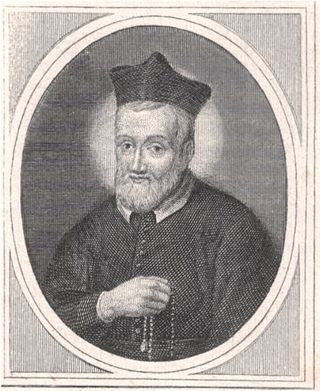
Antonio Grassi, born Vincenzo Grassi, was an Italian Roman Catholic priest and a professed member of the Oratorians. Grassi was known for his humble and pious nature with a strong devotion to the Marian devotions of Loreto to where he made pilgrimages on an annual basis.

The Catholic Church, also known as the Roman Catholic Church, is the largest Christian church, with 1.3 billion baptized Catholics worldwide as of 2019. As the world's oldest and largest continuously functioning international institution, it has played a prominent role in the history and development of Western civilization. The church consists of 24 sui iuris churches, including the Latin Church and 23 Eastern Catholic Churches, which comprise almost 3,500 dioceses and eparchies located around the world. The pope, who is the bishop of Rome, is the chief pastor of the church. The bishopric of Rome, known as the Holy See, is the central governing authority of the church. The administrative body of the Holy See, the Roman Curia, has its principal offices in Vatican City, a small enclave of the Italian city of Rome, of which the pope is head of state.
Francesco Bianchini, Italian astronomer and philosopher (d. 1729) births

Francesco Bianchini was an Italian philosopher and scientist. He worked for the curia of three popes, including being camiere d'honore of Clement XI, and secretary of the commission for the reform of the calendar, working on the method to calculate the astronomically correct date for Easter in a given year.
Robert Plot, English chemist and academic (d. 1696) births
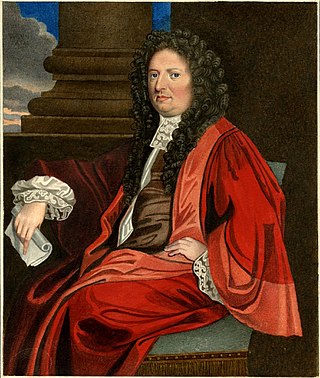
Robert Plot was an English naturalist, first Professor of Chemistry at the University of Oxford, and the first keeper of the Ashmolean Museum.
Katarina Stenbock, queen of Gustav I of Sweden (b. 1535) deaths

Catherine Stenbock was Queen of Sweden from 1552 to 1560 as the third and last wife of King Gustav I.

Gustav I, born Gustav Eriksson of the Vasa noble family and later known as Gustav Vasa, was King of Sweden from 1523 until his death in 1560, previously self-recognised Protector of the Realm (Riksföreståndare) from 1521, during the ongoing Swedish War of Liberation against King Christian II of Denmark, Norway and Sweden. Gustav rose to lead the rebel movement following the Stockholm Bloodbath, where his father was executed. Gustav's election as king on 6 June 1523 and his triumphant entry into Stockholm eleven days later marked Sweden's final secession from the Kalmar Union.
William Drummond of Hawthornden, Scottish poet (d. 1649) births
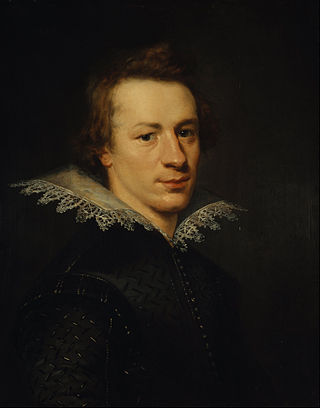
William Drummond, called "of Hawthornden", was a Scottish poet.
Conrad Gessner, Swiss botanist and physician (b. 1516) deaths

Conrad Gessner was a Swiss physician, naturalist, bibliographer, and philologist. Born into a poor family in Zürich, Switzerland, his father and teachers quickly realised his talents and supported him through university, where he studied classical languages, theology and medicine. He became Zürich's city physician, but was able to spend much of his time on collecting, research and writing. Gessner compiled monumental works on bibliography and zoology and was working on a major botanical text at the time of his death from plague at the age of 49. He is regarded as the father of modern scientific bibliography, zoology and botany. He was frequently the first to describe species of plants or animals in Europe, such as the tulip in 1559. A number of plants and animals have been named after him.
Maximilien de Béthune, Duke of Sully, 2nd Prime Minister of France (d. 1641) births

Maximilien de Béthune, 1st Duke of Sully, Marquis of Rosny and Nogent, Count of Muret and Villebon, Viscount of Meaux was a nobleman, soldier, statesman, and counselor of King Henry IV of France. Historians emphasize Sully's role in building a strong centralized administrative system in France using coercion and highly effective new administrative techniques. While not all of his policies were original, he used them well to revitalize France after the European Religious Wars. Most, however, were repealed by later monarchs who preferred absolute power. Historians have also studied his Neostoicism and his ideas about virtue, prudence, and discipline.

The prime minister of France, officially the prime minister of the French Republic, is the head of government of the French Republic and the leader of the Council of Ministers.
Niccolò Fontana Tartaglia, Italian mathematician and engineer (b. 1499) deaths

Niccolò Fontana Tartaglia was an Italian mathematician, engineer, a surveyor and a bookkeeper from the then Republic of Venice. He published many books, including the first Italian translations of Archimedes and Euclid, and an acclaimed compilation of mathematics. Tartaglia was the first to apply mathematics to the investigation of the paths of cannonballs, known as ballistics, in his Nova Scientia ; his work was later partially validated and partially superseded by Galileo's studies on falling bodies. He also published a treatise on retrieving sunken ships.
Henry IV of France (d. 1610) births

Henry IV, also known by the epithets Good King Henry or Henry the Great, was King of Navarre from 1572 and King of France from 1589 to 1610. He was the first monarch of France from the House of Bourbon, a cadet branch of the Capetian dynasty. He was assassinated in 1610 by François Ravaillac, a Catholic zealot, and was succeeded by his son Louis XIII.
Eric XIV of Sweden (d. 1577) births

Eric XIV was King of Sweden from 1560 until he was deposed in 1569. Eric XIV was the eldest son of Gustav I (1496–1560) and Catherine of Saxe-Lauenburg (1513–1535). He was also ruler of Estonia, after its conquest by Sweden in 1561.
Pope Sixtus V (d. 1590) births

Pope Sixtus V, born Felice Piergentile, was head of the Catholic Church and ruler of the Papal States from 24 April 1585 to his death in August 1590. As a youth, he joined the Franciscan order, where he displayed talents as a scholar and preacher, and enjoyed the patronage of Pius V, who made him a cardinal. As a cardinal, he was known as Cardinal Montalto.
Manuel I of Portugal (b. 1469) deaths

Manuel I, known as the Fortunate, was King of Portugal from 1495 to 1521. A member of the House of Aviz, Manuel was Duke of Beja and Viseu prior to succeeding his cousin, John II of Portugal, as monarch. Manuel ruled over a period of intensive expansion of the Portuguese Empire owing to the numerous Portuguese discoveries made during his reign. His sponsorship of Vasco da Gama led to the Portuguese discovery of the sea route to India in 1498, resulting in the creation of the Portuguese India Armadas, which guaranteed Portugal's monopoly on the spice trade. Manuel began the Portuguese colonization of the Americas and Portuguese India, and oversaw the establishment of a vast trade empire across Africa and Asia. He was also the first monarch to bear the title: By the Grace of God, King of Portugal and the Algarves, this side and beyond the Sea in Africa, Lord of Guinea and the Conquest, Navigation and Commerce in Ethiopia, Arabia, Persia and India.
Johannes Trithemius, German cryptographer and historian (b. 1462) deaths

Johannes Trithemius, born Johann Heidenberg, was a German Benedictine abbot and a polymath who was active in the German Renaissance as a lexicographer, chronicler, cryptographer, and occultist. He is considered the founder of modern cryptography and steganography, as well as the founder of bibliography and literary studies as branches of knowledge. He had considerable influence on the development of early modern and modern occultism. His students included Heinrich Cornelius Agrippa and Paracelsus.
Justus Menius, German Lutheran pastor (d. 1558) births

Justus Menius was a German Lutheran pastor and Protestant reformer whose name is Latinized from Jost or Just Menig.
Martín de Azpilcueta, Spanish theologian and economist (d. 1586) births

Martín de Azpilcueta, or Doctor Navarrus, was an important Spanish canonist and theologian in his time, and an early economist who independently formulated the quantity theory of money in 1556.
Paul Speratus, German Lutheran (d. 1551) births

Paul Speratus was a Swabian Catholic priest who became a Protestant preacher, reformer and hymn-writer. In 1523, he helped Martin Luther to create the First Lutheran hymnal, published in 1524 and called Achtliederbuch.
Lucy Brocadelli, Dominican tertiary and stigmatic (d. 1544) births

Lucy Brocadelli also known as the Blessed Lucy of Narni or Blessed Lucy of Narnia, was a Dominican tertiary who was famed as a mystic and a stigmatic. She has been venerated by the Roman Catholic Church since 1710. She is known for being the counselor of the Duke of Ferrara, for founding convents in two different and distant city-states and for her remains being solemnly returned to her home city of Narni on 26 May 1935, 391 years after her death.
Donatello, Italian painter and sculptor (b. 1386) deaths

Donato di Niccolò di Betto Bardi, better known as Donatello, was a Florentine sculptor of the Renaissance period. Born in Florence, he studied classical sculpture and used this to develop a complete Renaissance style in sculpture. He spent time in other cities, and while there he worked on commissions and taught others; his periods in Rome, Padua, and Siena introduced to other parts of Italy his techniques, developed in the course of a long and productive career. Financed by Cosimo de' Medici, Donatello's David was the first freestanding nude male sculpture since antiquity.
Albert I, Duke of Bavaria (b. 1336) deaths
Albert I, Duke of Lower Bavaria, was a feudal ruler of the counties of Holland, Hainaut, and Zeeland in the Low Countries. Additionally, he held a portion of the Bavarian province of Straubing, his Bavarian ducal line's appanage and seat, Lower Bavaria.
Jean Gerson, chancellor of the University of Paris (d. 1429) births
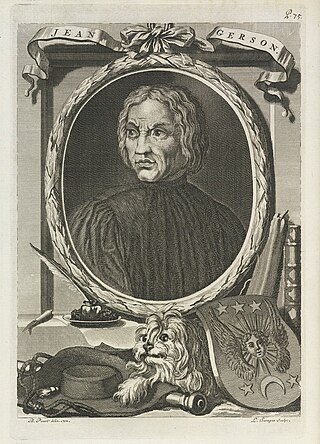
Jean Charlier de Gerson was a French scholar, educator, reformer, and poet, Chancellor of the University of Paris, a guiding light of the conciliar movement and one of the most prominent theologians at the Council of Constance. He was one of the first thinkers to develop what would later come to be called natural rights theory, and was also one of the first individuals to defend Joan of Arc and proclaim her supernatural vocation as authentic.

The University of Paris, metonymically known as the Sorbonne, was the leading university in Paris, France, active from 1150 to 1970, with the exception between 1793 and 1806 under the French Revolution. Emerging around 1150 as a corporation associated with the cathedral school of Notre Dame de Paris, it was considered the second-oldest university in Europe.
King Frederick III of Sicily (d. 1337) births

Frederick II was the regent of the Kingdom of Sicily from 1291 until 1295 and subsequently King of Sicily from 1295 until his death. He was the third son of Peter III of Aragon and served in the War of the Sicilian Vespers on behalf of his father and brothers, Alfonso ΙΙΙ and James ΙΙ. He was confirmed as king by the Peace of Caltabellotta in 1302. His reign saw important constitutional reforms: the Constitutiones regales, Capitula alia, and Ordinationes generales.
Bertold of Regensburg, German preacher deaths

Bertold of Regensburg, also known as Berthold of Ratisbon was a German preacher during the high Middle Ages.
Frederick II, Holy Roman Emperor (b. 1194) deaths
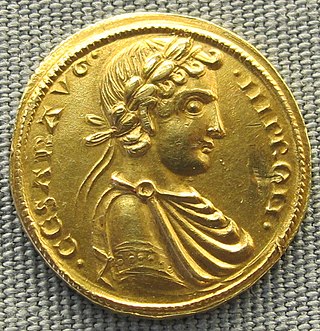
Frederick II was King of Sicily from 1198, King of Germany from 1212, King of Italy and Holy Roman Emperor from 1220 and King of Jerusalem from 1225. He was the son of emperor Henry VI of the Hohenstaufen dynasty and Queen Constance of Sicily of the Hauteville dynasty.
Maimonides, Spanish rabbi and philosopher (b. 1135) deaths

Moses ben Maimon (1138–1204), commonly known as Maimonides and also referred to by the acronym Rambam, was a Sephardic Jewish philosopher who became one of the most prolific and influential Torah scholars of the Middle Ages. In his time, he was also a preeminent astronomer and physician, serving as the personal physician of Saladin. Born in Córdoba, Almoravid Empire, on Passover eve, 1138, he worked as a rabbi, physician and philosopher in Morocco and Egypt. He died in Egypt on 12 December 1204, whence his body was taken to the lower Galilee and buried in Tiberias.
Henry IX, Duke of Bavaria (b. 1075) deaths

Henry IX, called the Black, a member of the House of Welf, was Duke of Bavaria from 1120 to 1126.
Pope Callixtus II (b. 1065) deaths
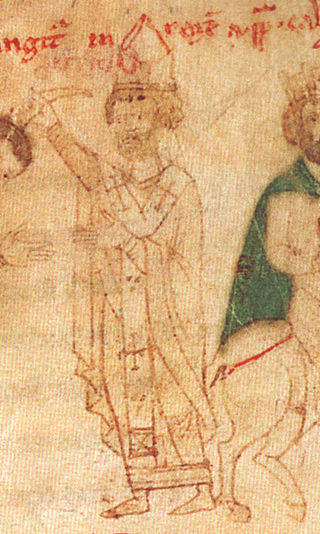
Pope Callixtus II or Callistus II, born Guy of Burgundy, was head of the Catholic Church and ruler of the Papal States from 1 February 1119 to his death in 1124. His pontificate was shaped by the Investiture Controversy, which he was able to settle through the Concordat of Worms in 1122.
Angilbert II, archbishop of Milan deaths
Angilbert II was the Archbishop of Milan from 27 or 28 June 824 to his death on the 13 December 859. He succeeded Angilbert I.
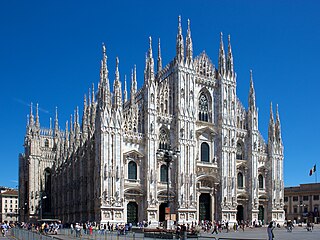
The Archdiocese of Milan is a Latin Church ecclesiastical territory or archdiocese of the Catholic Church in Italy which covers the areas of Milan, Monza, Lecco and Varese. It has long maintained its own Latin liturgical rite usage, the Ambrosian rite, which is still used in the greater part of the diocesan territory. Among its past archbishops, the better known are Ambrose, Charles Borromeo, Pope Pius XI and Pope Paul VI.
Pepin I of Aquitaine (b. 797) deaths

Pepin I or Pepin I of Aquitaine was King of Aquitaine and Duke of Maine.
Du Hongjian, Chinese politician (b. 709) deaths
Du Hongjian (杜鴻漸), courtesy name Zhisun (之巽), formally Duke Wenxian of Wei (衛文憲公), was a Chinese Buddhist monk and politician during the Tang dynasty who served as a chancellor during the reign of Emperor Daizong. He was known, and much criticized by traditional Chinese historians, for his devotion to Buddhism, one manifestation of which was his patronage of the Chan master Wuzhu.
Childebert I, Frankish king (b. 496) deaths
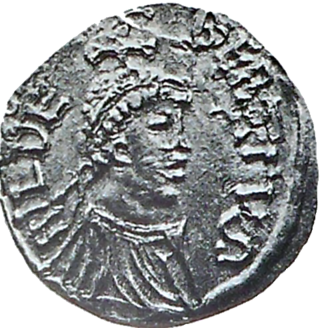
Childebert I was a Frankish King of the Merovingian dynasty, as third of the four sons of Clovis I who shared the kingdom of the Franks upon their father's death in 511. He was one of the sons of Saint Clotilda, born at Reims. He reigned as King of Paris from 511 to 558 and Orléans from 524 to 558.
Christian feast day: St Antiochus of Sulcis
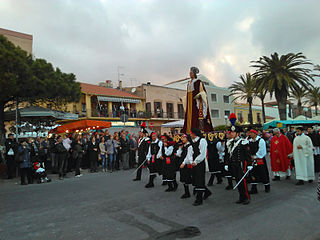
Saint Antiochus of Sulcis was an early Christian martyr of Sardinia. The island and town of Sant'Antioco are named after him.
Christian feast day: St Judoc aka St Joyce
Saint Judoc, otherwise known as Jodoc, Joyce or Josse was a seventh-century Breton noble. Though he was never officially canonized, Saint Judoc is considered to be a saint. Judoc was a son of Juthael, King of Brittany. He renounced his wealth and position to become a priest and lived alone for the rest of his lifetime in the coastal forest near the mouth of the River Canche.
Christian feast day: St Lucy

Lucia of Syracuse (283–304), also called Saint Lucia or Saint Lucy, was a Christian martyr who died during the Diocletianic Persecution. She is venerated as a saint in the Catholic, Anglican, Lutheran, and Eastern Orthodox churches. She is one of eight women explicitly commemorated by Catholics in the Canon of the Mass. Her traditional feast day, known in Europe as Saint Lucy's Day, is observed by Western Christians on 13 December. Lucia of Syracuse was honored in the Middle Ages and remained a well-known saint in early modern England. She is one of the best known virgin martyrs, along with Agatha of Sicily, Agnes of Rome, Cecilia of Rome and Catherine of Alexandria.
Christian feast day: St Odile of Alsace

Odile of Alsace, also known as Odilia and Ottilia, born c. 662 - c. 720 at Mont Sainte-Odile), is a saint venerated in the Catholic Church and the Eastern Orthodox Church. She is a patroness saint of good eyesight and of the region of Alsace.
Acadian Remembrance Day (Acadians)

The Acadians are an ethnic group descended from the French who settled in the New France colony of Acadia during the 17th and 18th centuries. Most Acadians live in the region of Acadia, as it is the region where the descendants of a few Acadians who escaped the Expulsion of the Acadians re-settled. Most Acadians in Canada continue to live in majority French-speaking communities, notably those in New Brunswick where Acadians and Francophones are granted autonomy in areas such as education and health.
National Day (Saint Lucia)
Martial Law Victims Remembrance Day (Poland)
Holidays in Poland are regulated by the Non-working Days Act of 18 January 1951. The Act, as amended in 2010, currently defines thirteen public holidays.

Poland, officially the Republic of Poland, is a country in Central Europe. It is divided into 16 administrative provinces called voivodeships, covering an area of 312,696 km2 (120,733 sq mi). Poland has a population of over 38 million and is the fifth-most populous member state of the European Union. Warsaw is the nation's capital and largest metropolis. Other major cities include Kraków, Wrocław, Łódź, Poznań, Gdańsk, and Szczecin.
Nanking Massacre Memorial Day (China)

The National Memorial Day for the Victims of the Nanjing Massacre is a national memorial day observed in China on 13 December annually in honor of the Chinese victims of the Second Sino-Japanese War. The observance draws attention to Japanese war crimes during this period. It was established in 2014 by the Standing Committee of the 12th National People's Congress.

China, officially the People's Republic of China (PRC), is a country in East Asia. It is the world's most populous country, with a population exceeding 1.4 billion, slightly ahead of India. China spans the equivalent of five time zones and borders fourteen countries by land, the most of any country in the world, tied with Russia. China also has a narrow maritime boundary with the disputed Taiwan. Covering an area of approximately 9.6 million square kilometers (3,700,000 sq mi), it is the world's third largest country by total land area. The country consists of 22 provinces, five autonomous regions, four municipalities, and two Special Administrative Regions. The national capital is Beijing, and the most populous city and financial center is Shanghai.
Nusantara Day (Indonesia)

The following table indicates declared Indonesian government national holidays. Cultural variants also provide opportunity for holidays tied to local events. Beside official holidays, there are the so-called "libur bersama" or "cuti bersama", or joint leave(s) declared nationwide by the government. In total there are 16 public holidays every year.

Indonesia, officially the Republic of Indonesia, is a country in Southeast Asia and Oceania between the Indian and Pacific oceans. It consists of over 17,000 islands, including Sumatra, Java, Sulawesi, and parts of Borneo and New Guinea. Indonesia is the world's largest archipelagic state and the 14th-largest country by area, at 1,904,569 square kilometres. With over 275 million people, Indonesia is the world's fourth-most populous country and the most populous Muslim-majority country. Java, the world's most populous island, is home to more than half of the country's population.
Republic Day (Malta)

Republic Day is a public holiday celebrated in Malta celebrated on 13 December. It celebrates the anniversary of the creation of the Republic of Malta. On 13 December 1974, the constitution of Malta revised, which resulted in the transforming the State of Malta into a republic, effectively abolishing the role of Reġina ta' Malta in the country. That same year, Sir Anthony Mamo was named as the first president of the country. British troops did not leave the country until 31 March 1979.
Sailor's Day (Brazil)
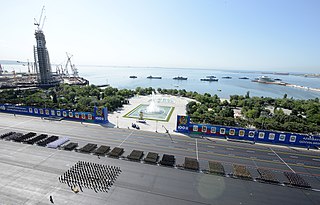
Many nations around the world observe some kind of Armed Forces Day to honor their military forces. This day is not to be confused with Veterans Day or Memorial Day.

Brazil, officially the Federative Republic of Brazil, is the largest country in both South America and Latin America. At 8.5 million square kilometers (3,300,000 sq mi) and with over 217 million people, Brazil is the world's fifth-largest country by area and the seventh most populous. Its capital is Brasília, and its most populous city is São Paulo. The federation is composed of the union of the 26 states and the Federal District. It is the largest country to have Portuguese as an official language and the only one in the Americas; one of the most multicultural and ethnically diverse nations, due to over a century of mass immigration from around the world; and the most populous Roman Catholic-majority country.
Saint Lucia Day (mainly in Scandinavia)
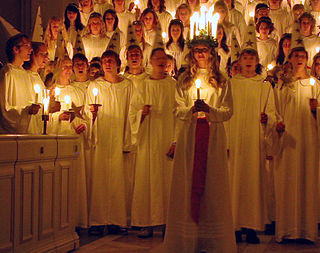
Saint Lucy's Day, also called the Feast of Saint Lucy, is a Christian feast day observed on 13 December. The observance commemorates Lucia of Syracuse, an early-fourth-century virgin martyr under the Diocletianic Persecution, who according to legend brought food and aid to Christians hiding in the Roman catacombs, wearing a candle lit wreath on her head to light her way and leave her hands free to carry as much food as possible. Her feast day, which coincided with the shortest day of the year prior to calendar reforms, is widely celebrated as a festival of light. Falling within the Advent season, Saint Lucy's Day is viewed as a precursor of Christmastide, pointing to the arrival of the Light of Christ in the calendar on Christmas Day.

Scandinavia is a subregion in Northern Europe, with strong historical, cultural, and linguistic ties between its constituent peoples. In English usage, Scandinavia most commonly refers to Denmark, Norway, and Sweden. It can sometimes also refer more narrowly to the Scandinavian Peninsula, or more broadly to include Finland, Iceland, and the Faroe Islands.